






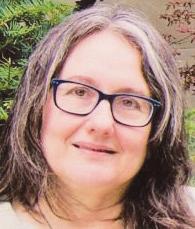 Naomi Seidman
Naomi Seidman
Humanities Prof. Naomi Seidman of the University of Toronto and its Department for the Study of Religion and the Centre for Diaspora and Transnational Studies will be the speaker for the 44th Annual Ryterband Symposium, Thursday, April 11 at University of Dayton's Curran Place. A 2016 Guggenheim Fellow, Seidman hosts a podcast on leaving the ultra-Orthodox Jewish world, Heretic in the House, distributed by the Shalom Hartman Institute. Her fourth book, Sarah Schenirer and the Bais Yaakov Movement: A Revolution in the Name of Tradition — winner of a 2019 National Jewish Book Award in Women's Studies — will be the topic of her 4 p.m. lecture. At 7 p.m., Seidman will present the talk Jesus Spoke Yiddish. Both are free and open to the public. The Ryterband Symposium is cosponsored by the University of Dayton, United Theological Seminary, and Wright State University. Curran Place is located at 1700 S. Patterson Blvd. For more information, contact Wright State Zusman Prof. of Judaic Studies Mark Verman at 937-775-2461.

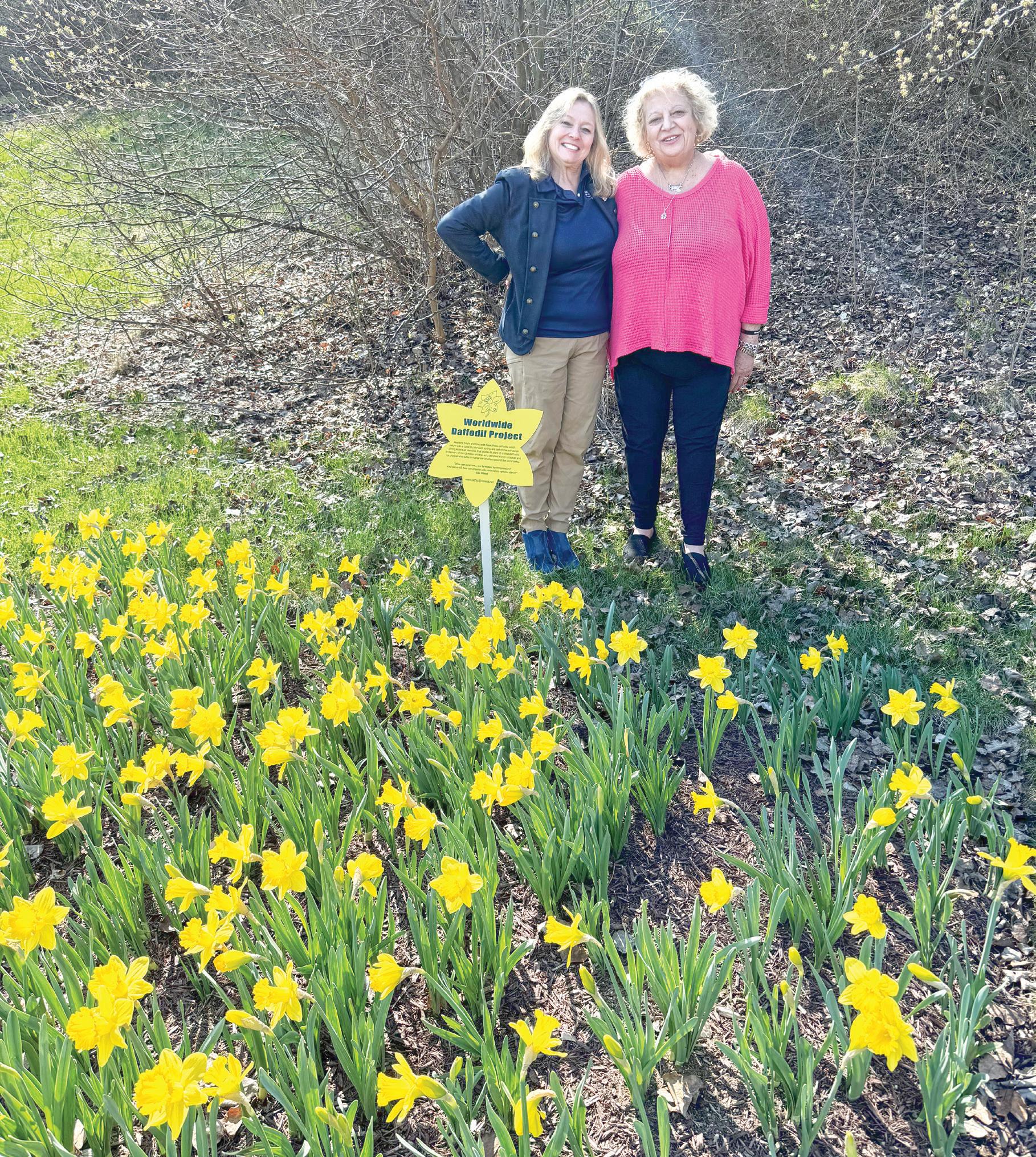
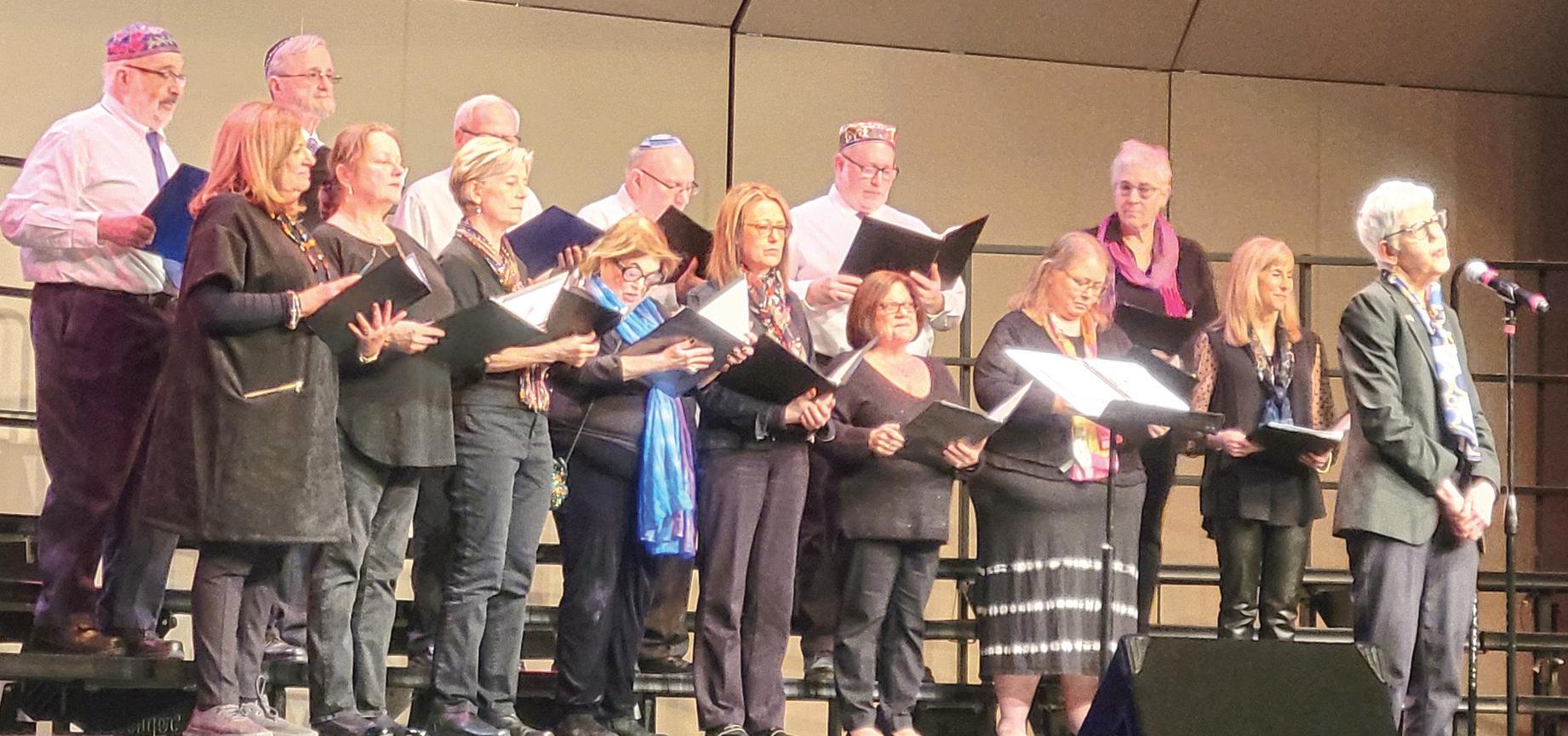

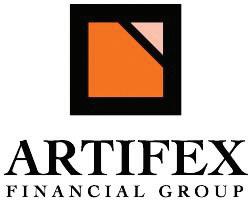
The Observer
Fourth-year medical student Ashley Hughes from Shaker Heights says she'll graduate Wright State University's Boonshoft School of Medicine April 28 with a strong background in patient care.
"You see patients from different cultures, backgrounds, different types of situations," she says. Hughes wanted to expand her ability to relate to her patients so she can give them the best care possible. That led her to enroll in the medical school's Physicians and the Holocaust elective with Dr. David B. Shuster.
"I'm learning things about myself that I didn't know, because he's asking me to look deeply into my philosophy about life," Hughes says.
A clinical assistant professor of orthopaedic surgery, Shuster has now taught the class — open only to fourth-year students — for a decade.
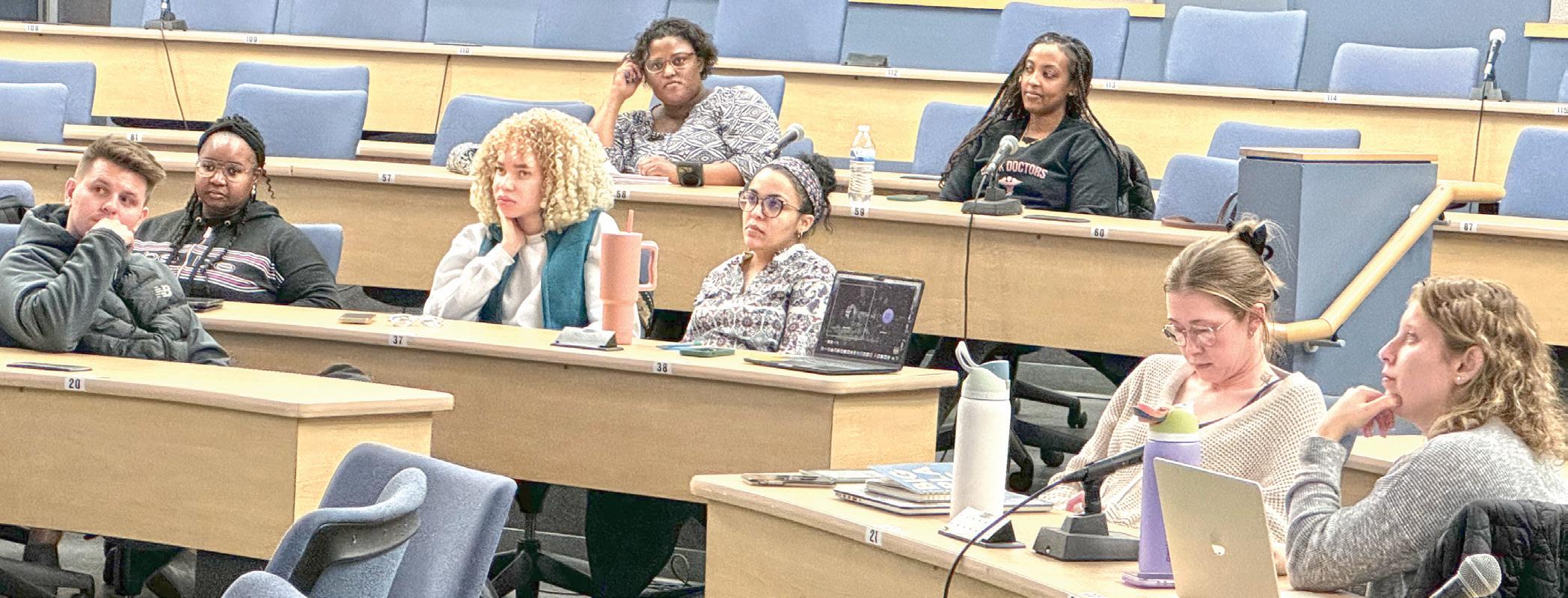
"I want them to think," he tells The Observer. "I want them to think critically. I want them to look into their own hearts, synthesize their thoughts, and be able to express them, whatever they are."
Amanda Peck of Cincinnati says she's learned about respect and humility in the class.
"And how gray the world is. Things aren't necessarily as straightforward as they seem on the outside," she says.
 Dr. David B. Shuster
Dr. David B. Shuster
"This class is about action. And what you do is action," Shuster, the son of a Holocaust survivor, tells his class. Fourteen fourth-year students are enrolled in the yearlong course.
Peck went on Birthright Israel last year. It was in Israel where she says she truly comprehended that antisemitism has exploded in the United States. "When I was born in 1997, there were about 1,000 antisemitic hate crimes a year," she says. "Just over my lifespan of 26 years, it's more than increased by threefold."
She tells The Observer that at the beginning of each Physicians and the Holocaust class, Shuster poses three or four open-ended questions for the students to consider and discuss.
A question could be: What
This Pesach, we may need 130 place settings. Empty ones.
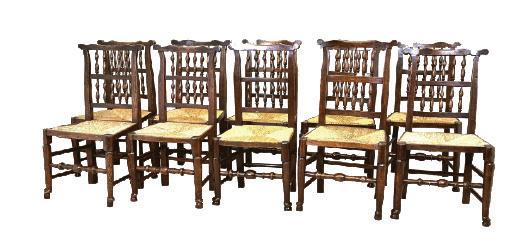
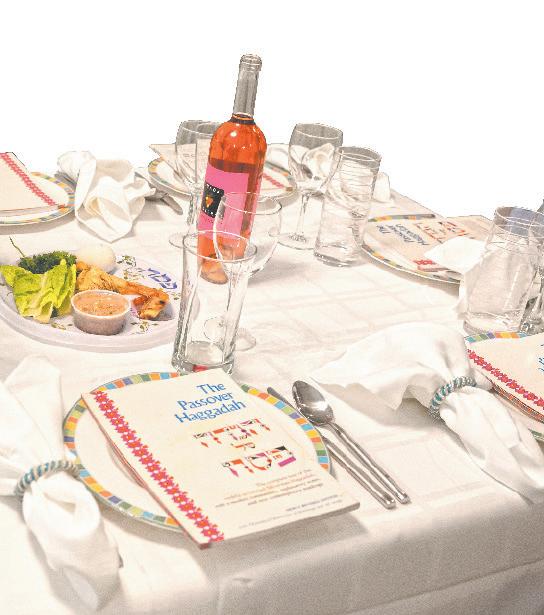
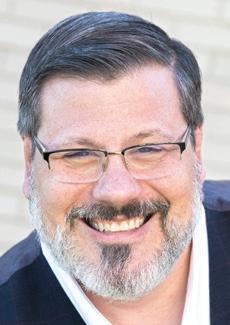




is a person? How do you tell the difference between right and wrong? Does the concept of right versus wrong make any difference in the actions humanity chooses? Are there lives which are not worth living? Are their lives which are too expensive? In the context of your worldview, how could the Holocaust happen?
The class visits Montgomery County Stillwater Center, a residential facility for people with severe disabilities. They learn about the racist pseudoscience of eugenics. They visit the Veterans Memorial Museum in Germantown and Prejudice and Memory: A Holocaust Exhibit on permanent display at the National Museum of the U.S. Air Force.
One of Peck's contributions to this class is a presentation on the history of antisemitism.
She says the course has provided her with perspective, especially with patients. "You don't know their backgrounds or where they come from."
The goal of Physicians and the
I've always thought of Passover as a comfort, an anchor, a thoughtful celebration. It's the one holiday that most Jews in the United States observe in some form or another. The situation we Jews find ourselves in across the globe this year — and especially in Israel — gives us a Passover that can still be these things. But the text of the Haggadah challenges us in a harsh way again. It irritates. It agitates. It reminds us of how many times over the centuries the pain and suffering of oppression were on top of us — and ahead of us. It tells us freedom is never to be taken for granted. My prayer is that this year, our Seders urge us on as individuals and as a people to figure out how to live our best lives as Jews, as Americans, and as human beings. Wishing all of us a meaningful Pesach.
Holocaust is for students to take meaningful action as a result of participating in the course.
To that end, Shuster requires each student to create and implement their own Holocaust and Humanity Project. "There's thought and there's talk. But ac-
tions speak."
Each student designs a project based on their own passions and talents. The result is a tangible action in the world.
The Boonshoft School of Medicine began offering the Continued on next page

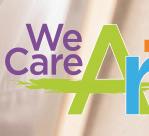

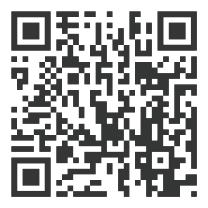




Continued from previous page
Physicians and the Holocaust course in 2008. It was originally led by medical ethics professor and physician Dr. Ashley Fernandes and the late Rhoda Mahran. Dayton Holocaust Education Committee Chair Renate Frydman has also been involved since the beginning.
When Fernandes moved on to The Ohio State University College of Medicine and Nationwide Children's Hospital in 2014, Shuster took over the course.
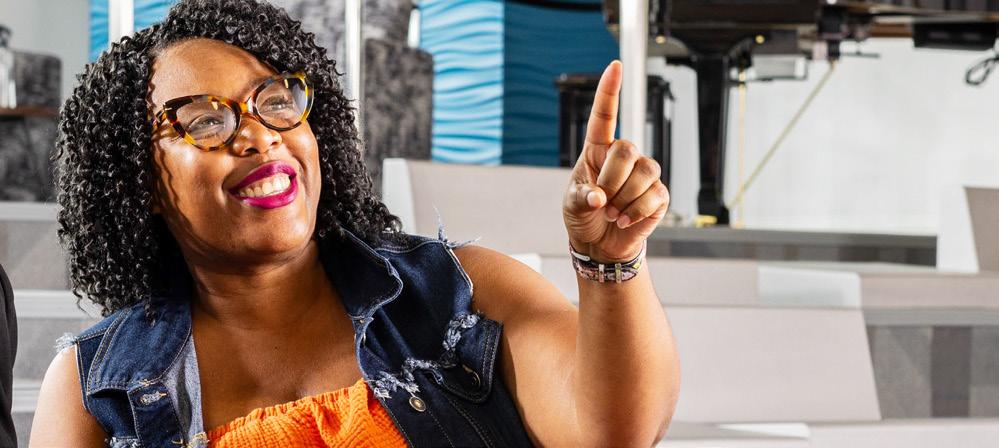
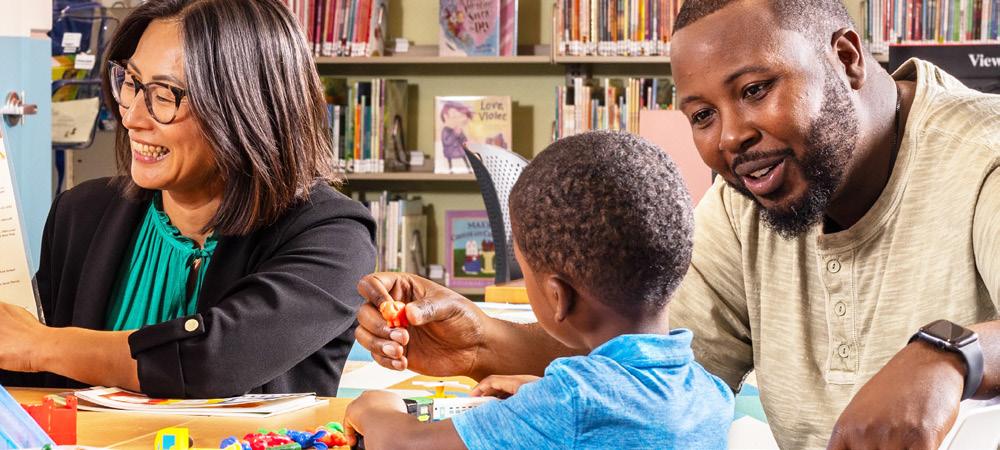
In February, Hughes led a class discussion about the 1946 book Man's Search for Meaning by Viktor Frankl, required reading for the students.
"Almost anybody that I talk to from other medical schools doesn't have a class like this," Hughes says.
On Match Day, March 15, she learned that she'll be a resident in anesthesiology at Oregon Health and Science University in Portland.
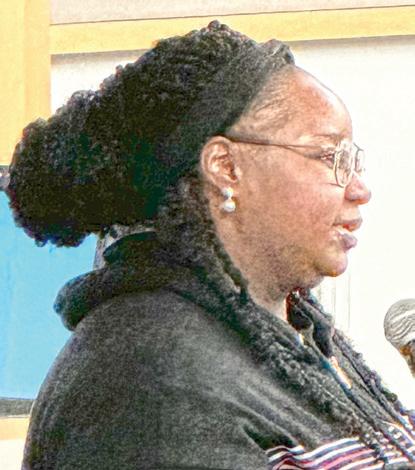
Some of the Holocaust and Humanity Projects Shuster recalls over his decade teaching the course include a medical student who was also a violinist playing the violin at the Community Yom Hashoah Observance. Another student, originally from Ukraine, sold her homemade pirozhki and donated the proceeds to a charity.
He says Dr. Sara Tisherman's project stands out. "She and other students in the class put together a Passover Seder for all the students. (Survivor) Sam Heider was there. Renate was there. If I had to pick one thing, that would be it. Because the students participated."
Tisherman has returned to the Boonshoft School of Medicine, as an assistant professor in the Department of Family Medicine. And in June, with the start of the next academic year, Tisherman will co-direct the course with Shuster.
"The course improved my ability to have productive conversations about difficult topics without transitioning from conversation to argument," she says. "I became more comfortable conveying my opinions to peers and more comfortable with public speaking. All of these skills have helped me in interviews, work, and personal situations since the course."
"Dr. Shuster really has a vision that most physicians don't have," Hughes says when asked what she'll take with her from the course. "A vision to empower us to be openminded, to be creative, to dive deeply into our own biases and judgements and thoughts and be able to apply them to our practice of medicine, the art of medicine. It goes beyond the scientific aspect of medicine. He's saying, go out into this world and be yourself and don't be afraid to do something for others that may be nontraditional."
Another goal of the course, Shuster adds, is to cultivate Holocaust speakers beyond survivors: professors, other physicians, who may never have given a presentation about the Holocaust.
"For instance, we had Dr. Marvin Miller, who's a geneticist at Children's, talk about eugenics. Pam Garverick, who's a Ph.D. professor of psychology. I wanted it to be their peers, their professors."
Peck will return to Cincinnati for her neurology residency at University of Cincinnati Medical Center.
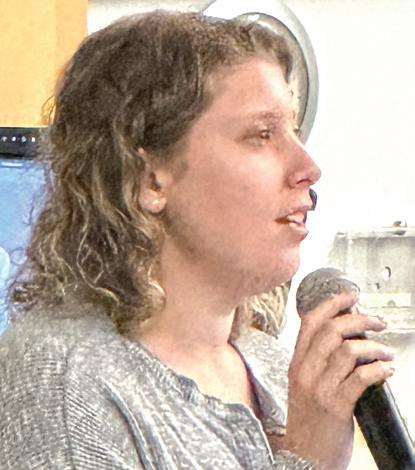
"Hearing everyone's differences of opinions in this class on how they answered different questions — and learning about everyone's stories and emotional traumas — is something I will really take with me as a doctor," Peck says.
For Shuster's work with the class, the Boonshoft School of Medicine honored him with its 2017 Voluntary Faculty Award for teaching medical students.
THE DAYTON

daytonjewishobserver.org
Editor and Publisher
Marshall Weiss mweiss@jfgd.net 937-610-1555
Contributors Candace R. Kwiatek Devorah Mangel
Advertising Sales Executive Patty Caruso, plhc69@gmail.com
Administrative Assistant
Samantha Daniel, sdaniel@jfgd.net 937-610-1555
Billing
Sheila Myers, smyers@jfgd.net 937-610-1555
Proofreaders
Rachel Haug Gilbert, Steven H. Solomon Observer Advisor Martin Gottlieb
Published by the Jewish Federation of Greater Dayton
Mary Rita Weissman President
Dan Sweeny President Elect Marni Flagel Secretary
Neil Friedman Treasurer
Ben Mazer VP Personnel
Teddy Goldenberg VP Resource Dev.
Dr. Heath Gilbert Immediate Past Pres. Cathy Gardner CEO
The Dayton Jewish Observer, Vol. 28, No. 8. The Dayton Jewish Observer is published monthly by the Jewish Federation of Greater Dayton, a nonprofit corporation, 525 Versailles Dr., Dayton, OH 45459.
Views expressed by columnists, in readers’ letters, and in opinion pieces do not necessarily reflect the opinion of staff or layleaders of The Dayton Jewish Observer or the Jewish Federation of Greater Dayton. Acceptance of advertising neither endorses advertisers nor guarantees kashrut.
The Dayton Jewish Observer Mission Statement
To support, strengthen and champion the Dayton Jewish community by providing a forum and resource for Jewish community interests.
Goals
• To encourage affiliation, involvement and communication.
• To provide announcements, news, opinions and analysis of local, national and international activities and issues affecting Jews and the Jewish community.
Local Holocaust survivors have met with the students and shared their stories since the beginning of the course.
This year, students met Felix Garfunkel, Henry Guggenheirmer, Ira Segalewitz, former Daytonian Felix Weil virtually from Chicago, Renate Frydman, and Bob Kahn, who at the time was 99.
"It took a lot for him to come to our class," Hughes says. "He was definitely a warrior to come and speak to us and make that trip. His presence is powerful. He came in, he stood up to speak with us. He didn't want to sit down."
In 2020, he received the Montgomery County Board of Developmental Disabilities Services' Erin Ritchey Memorial Educator Award, given to those whose personal efforts have contributed significantly to improving the quality of life for people with developmental disabilities.
"I'm honored to be a part of it," Shuster says of Physicians and the Holocaust. "With each class, the students inspire me, and I'm just blown away by their actions and their thoughtfulness. When they're there, at a time that is very stressful for them — they're all over the country, they're just trying to get a residency — they put their hearts into this."
• To build community across institutional, organizational and denominational lines.
• To advance causes important to the strength of our Jewish community including support of Federation agencies, its annual campaign, synagogue affiliation, Jewish education and participation in Jewish and general community affairs.
• To provide an historic record of Dayton Jewish life.

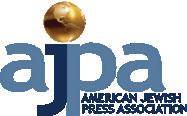

Please recycle this newspaper. The Dayton Jewish Observer
The Moses E. Miller Hebrew Free Loan Society has expanded its service area beyond Cincinnati and will now provide interest-free loans of up to $5,000 to Jews in financial need in the Dayton area.
In addition to Jews in need, the free loan society will provide loans to non-Jews in the Dayton area who "have a meaningful connection with the Jewish community," such as employees of Jewish organizations.




Loans are available for such expenses as health care, business expansion, education, and home improvement.
Borrowers typically have two to three years to repay the loan, depending on the amount borrowed.
Tara Feiner, executive director of Dayton's Jewish Family Services, says the free loan society contacted her about expanding to serve the Dayton region.
"Someone had actually reached out to them from the Dayton area asking if they would serve here," she says. "It's such a great opportunity because JFS has limited financial assistance, and ours is for those who are Jewish and in emergency situations such as for utilities or rent that's going to keep them safe and sheltered.
"The Moses E. Miller Hebrew Free Loan Society has much more flexibility. It covers those next-level needs: helping with a down payment, getting a car, helping with business startup costs, professional development, even for lifecycle events such as bar and bat mitzvahs."
The current trustees of the society, the Katz family, are great-grandchildren of Moses E. Miller, who founded it in 1888.
Feiner adds that applications go directly to the free loan society.
"It's confidential. People can come to us if they're not sure if they want to do it, if they want to learn a little more about the process. But they would still go directly through their website to do it. Their application is very simple. A cosigner is also required."
Application forms are available at memhebrewfreeloan. com.

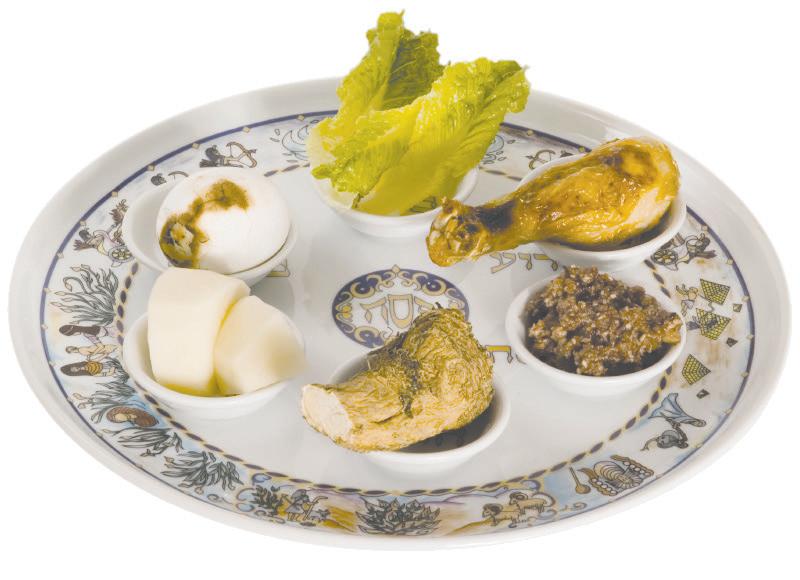

Jeff Noble
MRINetwork Management Recruiters of Dayton 937-228-8271
jnoble@mridayton.com

Kettering, Ohio 45429 • 937-604-2049
Tim Crafton, Owner • storchvacr@gmail.com
Wishing You A Happy Passover
Dayton Hadassah members came together at One Lincoln Park in January and made 19 fleece blankets for babies at Hadassah Hospital in Jerusalem.
Before the volunteers worked on the blankets, member Judy Schwartzman, who holds a Ph.D. in psychology, talked about ways to deal with stress. The Dayton chapter also received a donation of 13 receiving blanket quilts for the project, bringing its total contribution to 32 blankets.
Hadassah National President Carol Ann Schwartz, who lives in Cincinnati, delivered the blankets herself to pediatrics department nurses at Hadassah Hospital's Bloomberg Mother and Child Center. "They feel your love and hugs," Schwartz conveyed to Dayton Hadassah President Julie Bloom.
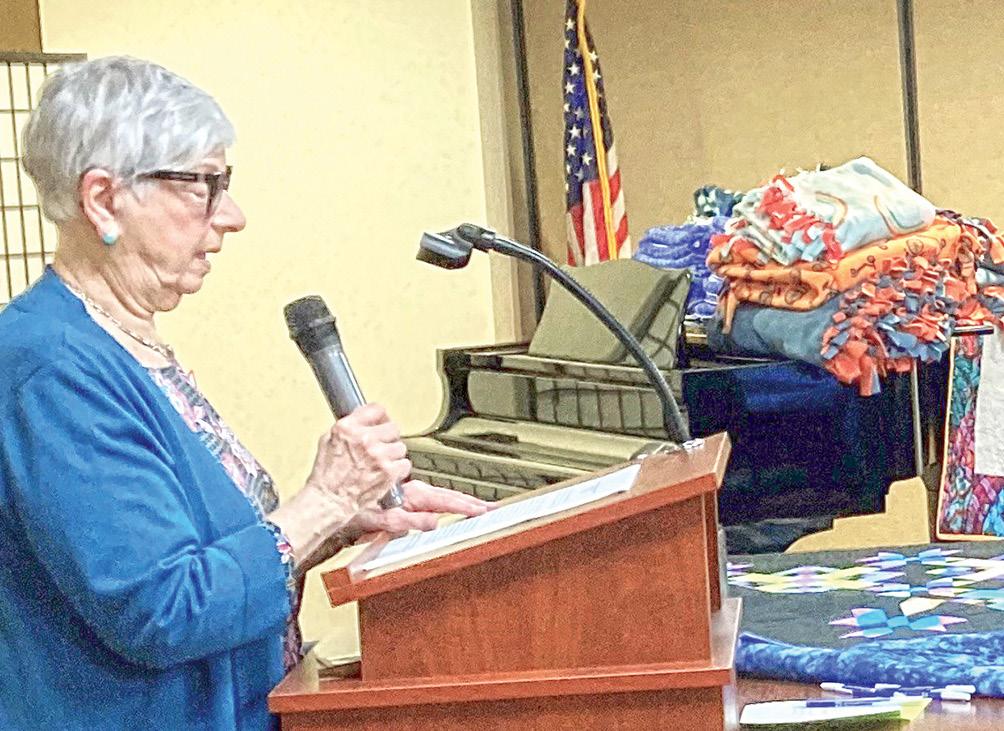

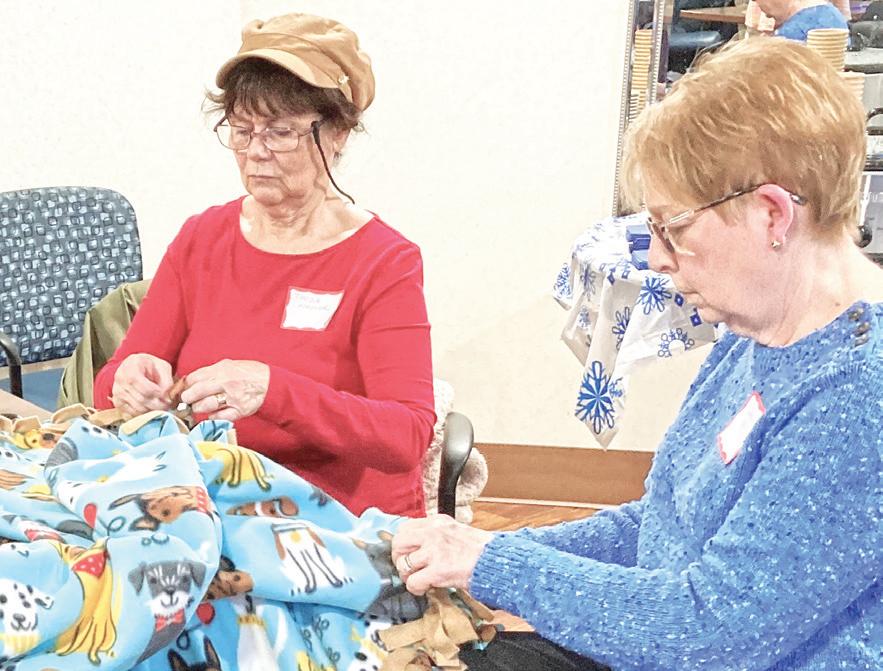
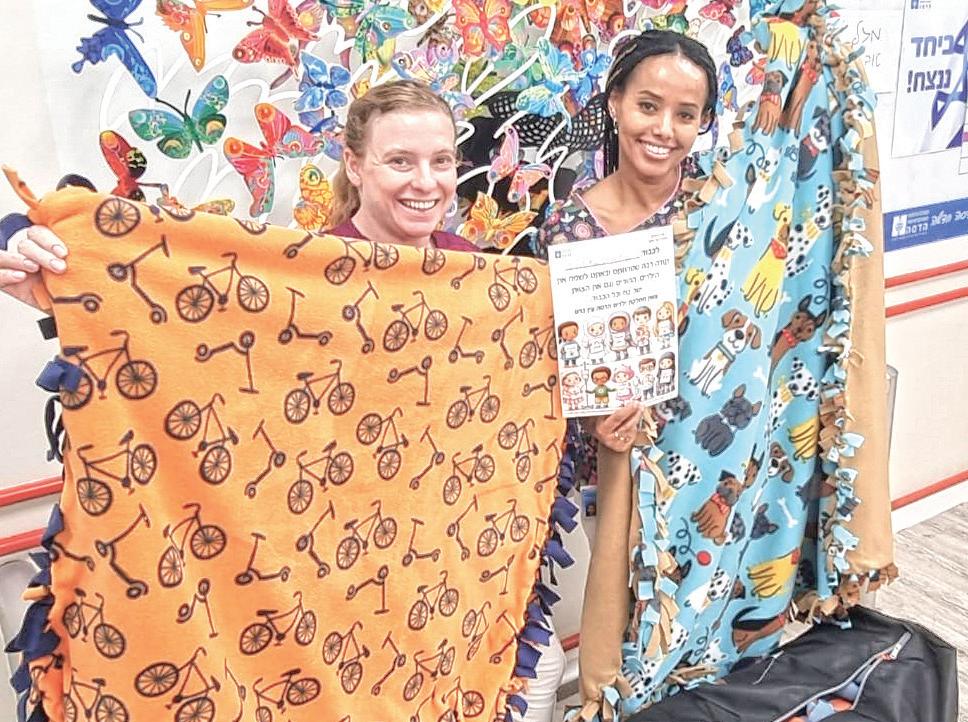

Keynote Speak
Dr Naomi Seidm
Jackman Humanities at the University of T
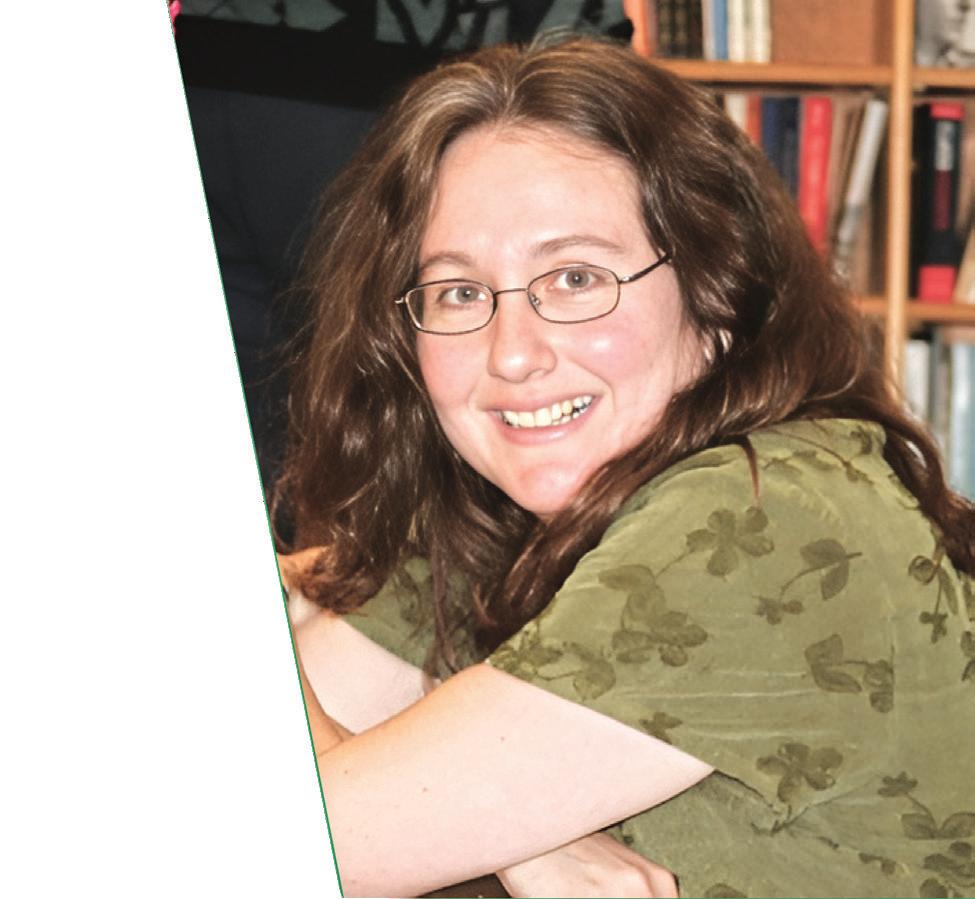
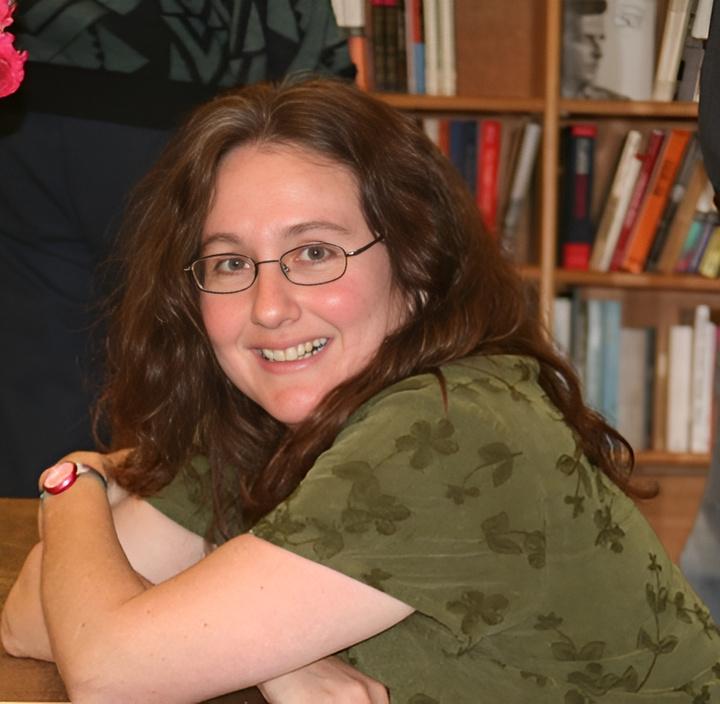
Public Lectures
4PM: Revolution in the Name of Tradition: Sarah Schenirer and Bais Yaakov Schools for Orthodox Jewish Girls
4PM: Revolution in the Name of Tradition: Sarah Schenirer and Bais Yaakov Schools for Orthodox Jewish Girls
7PM: Jesus Spoke Yiddish
7PM: Jesus Spoke Yiddish
Both presentations are free and open to the public
B th t ti f d t th bli
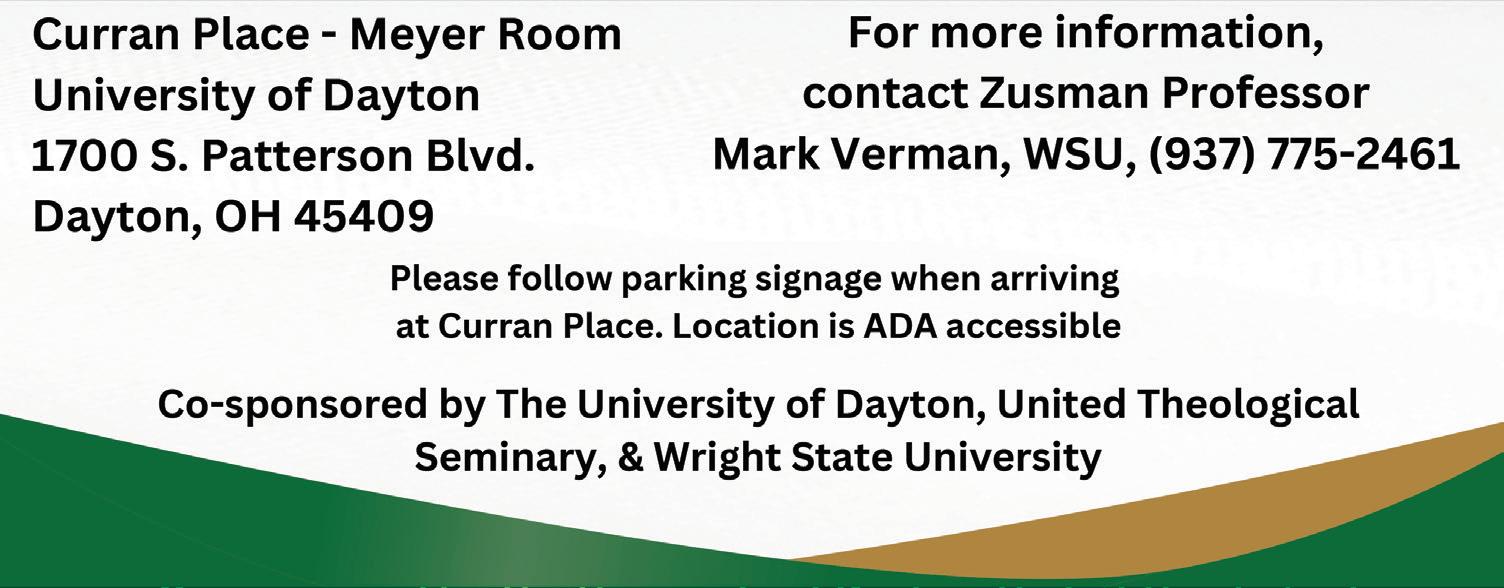

Police arrested five anti-Israel protesters on March 11 after they blocked roads leading to the Boeing Company building in Heath, Ohio. The protesters blocked two bridges near the building and chanted “free Palestine,” while tying themselves to disabled vehicles, according to The Columbus Dispatch
Two people also tied themselves to and suspended themselves from bridges in the area – the Aerospace Drive bridge and the James Parkway bridge.
Roads were cleared by 8:20 a.m., with the first call about the protesters coming in at 4 a.m., the Dispatch reported.
Midwest Direct Action, an activist group, claimed responsibility for the protest in a March 11 Instagram post.
Protesters shut down all three en-
trances to the facility, calling for Boeing to “divest from (genocide),” the post read.
“Boeing reminds us all that where we stand on (Palestine) is a choice between valuing wealth or humanity,” an Ohio resident said in the post. “We demand that Boeing act with humanity for once: divest from (genocide).”
The group asked users to donate to the bail of the arrested protesters in a separate Instagram post, also posted March 11. A third March 11 post claims all five protesters were released.
The Boeing plant is a prime contractor for intercontinental ballistic missile guidance subsystem support as of 2023, the Dispatch reported.
— Columbus Jewish News
A homemade banner bearing the message “Save Ireland From The Jews” was discovered hanging from a pedestrian walkway above Columbia Parkway, one of the main routes into downtown Cincinnati, on March 16.
Although not placed along the St. Patrick’s Day parade route, the timing of its appearance coincided with the city’s St. Patrick’s Day festivities. Authorities removed the banner prior to the commencement of the parade.
— cincyjewfolk.com
cincyjewfolk.com

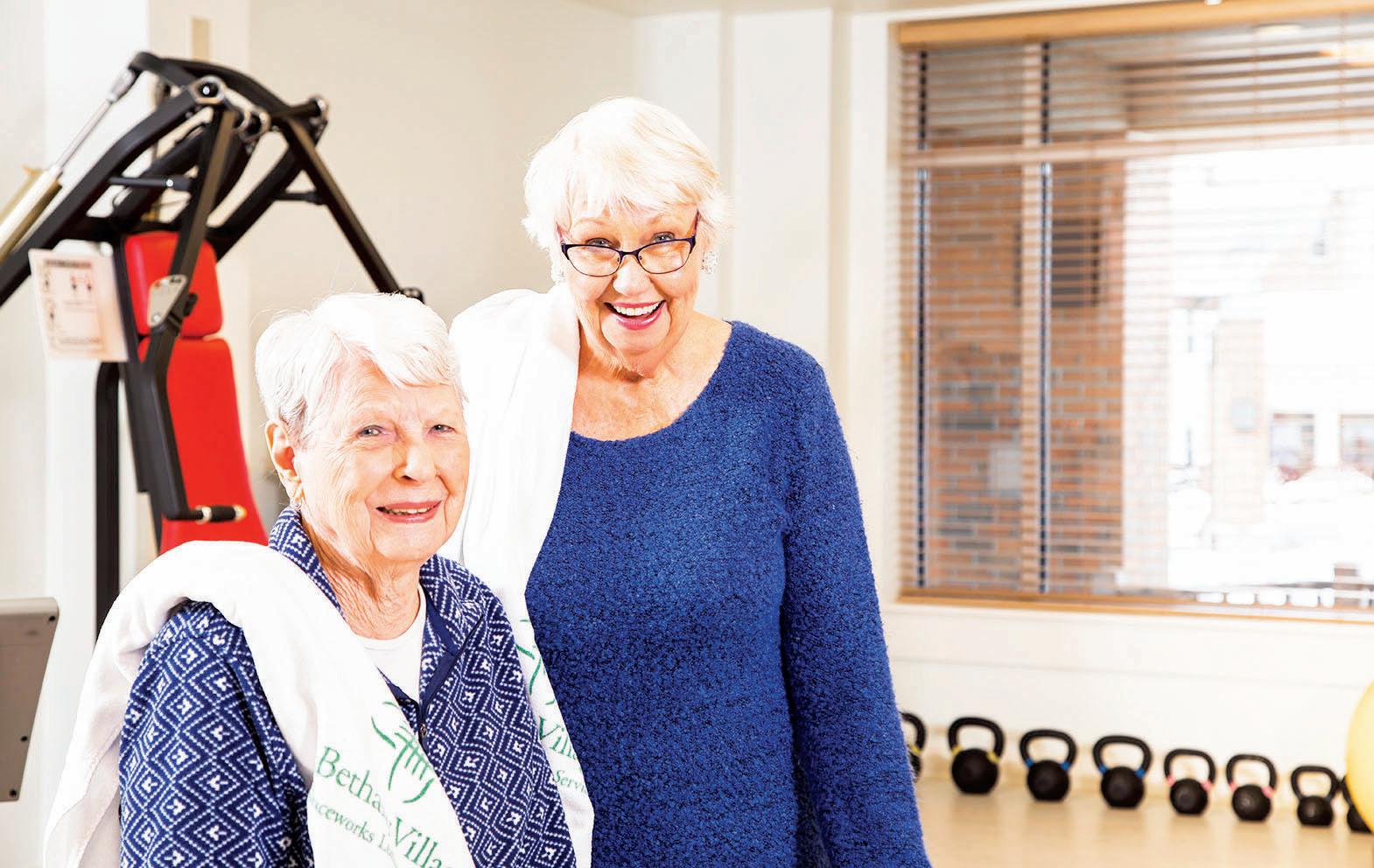
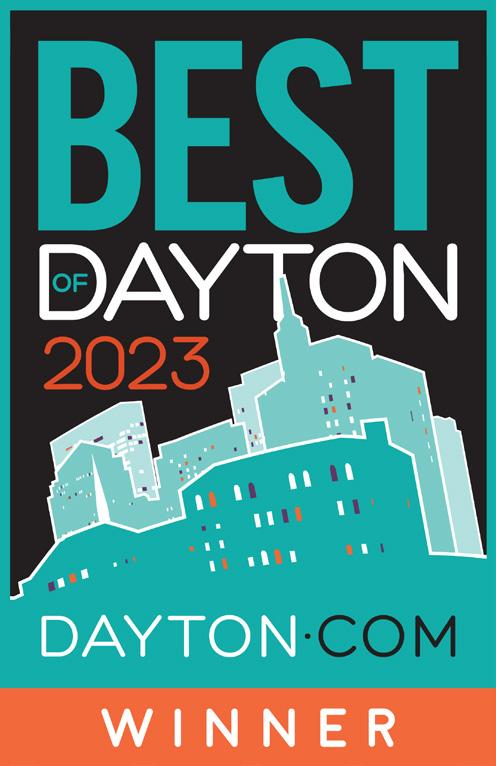
Donald Trump said that any Jew who votes for Democrats “hates their religion,” an escalation of his anger at a community that continues to vote overwhelmingly for his opponents, and shows little sign of changing course in November.
“Any Jewish person that votes for Democrats hates their religion, they hate everything about Israel, and they should be ashamed of themselves because Israel will be destroyed,” the former president said March 18 in an interview with Sebastian Gorka, a far-right commentator who once worked as an adviser in the Trump White House.
been baffled by how American Jewish voters continue to favor Democrats in overwhelming numbers, despite the series of pro-Israel policies he advanced as president, including moving the U.S. embassy to Jerusalem and pulling out of the Iran deal.
In 2019, as president, he said, “I think any Jewish people that vote for a Democrat, I think it shows either a total lack of knowledge or great disloyalty.”
This appeared to be the first time Trump directly mentioned Jews' religion as part of his message.
In 2022, he posted to social media, “Jews have to get their act together and appreciate what they have in Israel – Before it is too late!”
Trump, the presumptive Republican presidential nominee who is facing off again against Joe Biden in this year’s presidential election, has long
His Rosh Hashanah message last year was directed at “liberal Jews who voted to destroy America & Israel because you believed false narratives!”
This appeared to be the first
time Trump directly mentioned Jews’ religion as part of his message.
Anti-Defamation League CEO Jonathan Greenblatt, who recently honored Trump’s son-in-law and senior adviser, Jared Kushner, at the group’s annual conference, condemned Trump’s remarks.
“Accusing Jews of hating their religion because they might vote for a particular party is defamatory and patently false,” Greenblatt said in a statement. “Serious leaders who care about the historic U.S.-Israel alliance should focus on strengthening, rather than unraveling, bipartisan support for the State of Israel.”
Gorka was asking Trump about growing differences between the Biden administration and Prime Minister Benjamin Netanyahu’s government over Israel’s prosecution of its war against Hamas, which Biden has largely backed.

Trump referred to New York Sen. Chuck Schumer, the Jewish Democrat and majority leader who on March 14 called for early elections in Israel. Trump said Democrats were worried about the pro-Palestinian vote.
“I really believe (Democrats) hate Israel, and they also see a lot of votes. Don’t forget, when
you see those Palestinian marches, even I am amazed at how many people are in those marches. And guys like Schumer see that,” Trump said “I think it’s votes more than anything else, because he was always pro Israel. He’s very anti-Israel now.”
Trump has claimed, without evidence, that the war would not have happened on his watch, and says he would be more supportive of Israel than Biden, though he has offered few specifics.
The Biden campaign immediately seized on the clip and posted it on social media, noting a recent report that Trump has praised Adolf Hitler. Trump has denied the claim.
“Trump, who reportedly said Hitler ‘did some good things’: Any Jewish person that votes for Democrats hates their religion. They should be ashamed of themselves,” the Biden campaign said in its post on X.
 Adapted by AARON POSNER and CHAIM POTOK
Adapted by AARON POSNER and CHAIM POTOK
From the novel by CHAIM
POTOKOne of the most profound stories of the 20th century, this live stage version of Chaim Potok’s New York Times bestselling novel is a coming-of-age tale of two Jewish boys growing up in 1940's Brooklyn. Although they live five blocks from each other, the religious instruction of their fathers and the traditions of their disparate communities keep them a world apart. But fate plays its hand and forges a life-changing friendship as they grow into adulthood.
For tickets, visit CINCYPLAY.COM or call 513-421-3888.
“A fascinating rumination on the essence of family and wisdom.”

Many Ukrainian Jews have left over 2 years of war. Many others are still invested in their local communities.By Marcel Gascon Barbera, JTA
KYIV, Ukraine — Before their country was plunged into war, the synagogue in Kropyvnytskyi, a city in central Ukraine, was lucky to get 20 people to attend Shabbat services.
But two years after Russia’s invasion of Ukraine, the arrival of more than a dozen Jewish families from the country’s traumatized Eastern regions has invigorated the community.
“The rabbi there has new people...who moved from Kharkiv and Donbas,” Rabbi Mayer Stambler told the JTA. “He tells me that things have changed because they know what a Jewish community is about and they brought life to the kindergarten, to the synagogue, to the Sunday school, to the holidays.”
The silver lining for Kropyvnytskyi’s tiny Jewish community, about 300 out of a total population that stood at more than 220,000 in 2017, is just one part of the complicated reality for Ukrainian Jews as the deadly war grinds into its third year.
While the anniversary of the Russian invasion on Feb. 24 attracted a flurry of coverage hearkening back to the war’s terrifying early days, most Jews are focused primarily on building — or rebuilding — their lives and communities.
Yet at the same time, attacks are ongoing — 17 people were killed in a Russian missile attack in Odesa on March 15 — and the outpouring of international aid, including from Jewish donors, has largely dried up. Jewish Federations in North America, for example, raised nearly $100 million after the Russian invasion but distributed all of that money and, since Israel was attacked on Oct. 7, has ceased fundraising for Ukraine.
Hamas’ attack, while 69% of respondents to a December opinion poll by the Kyiv International Institute of Sociology said they sympathized with Israel — and only 1% voiced preference for the Palestinians.
What’s more, the high rate of emigration from Ukraine to Israel in recent years, which accelerated rapidly after the Russian invasion, means that Jews still living in Ukraine are likely to have personal connections in Israel.
“There is a strong feeling of solidarity because every Jew in Ukraine has friends or family there, so it was an immediate response in our communities,” said Rabbi Irina Gritsevskaya, an Israeli from the former Soviet Union who periodically travels to Ukraine to serve the country’s Masorti communities as the director of Midreshet Schechter. (Masorti Judaism is similar to the Conservative movement in the United States.)
“People started to come with money (from Ukraine for Israel), in some cases people who have almost nothing, because there are real economic problems in Ukraine,” Gritsevskaya said. She said her organization
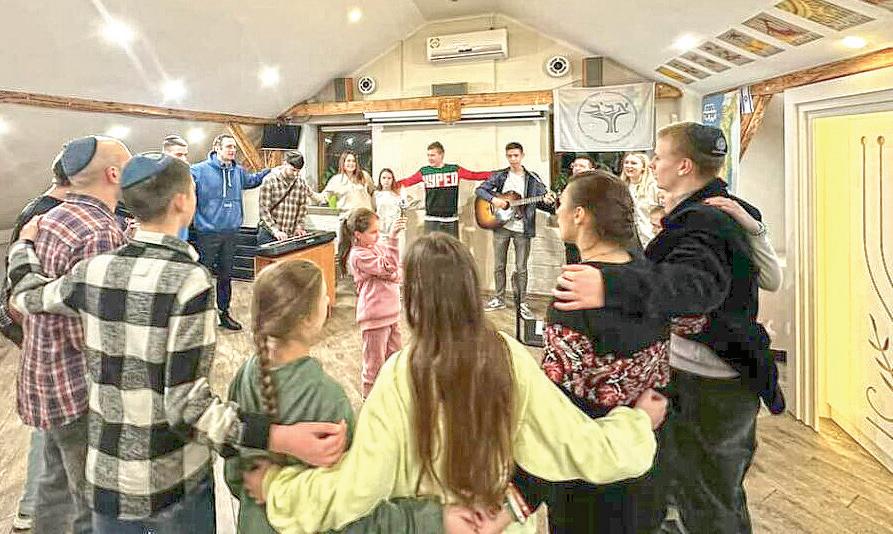
“At the beginning of the war, the American Jewry, Europe, Jews from all over the world were really hugging us with sending money and other kinds of help; now that Israel is at war it is tough,” said Stambler, a rabbi with the Chabad-Lubavitch movement who heads the Federation of Jewish Communities of Ukraine.
“There’s almost no local income and the expenses are growing due to the many needs that have appeared,” said Stambler, who is based in the Chabad stronghold of Dnipro. Now, he said, Jewish communities across Ukraine that used to be self-sufficient are struggling, and some Ukrainian former donors are now on the list of people needing aid.
The shift in aid priorities has left some Ukrainian Jews feeling abandoned. “A lot of people here forget about my country and our war,” Yeva Hryhorevska, a Ukrainian teenager, told her peers at the international convention of BBYO, the Jewish youth movement, in Florida in February. “Our country is really lonely.”
And yet Ukraine and Ukrainian Jews have demonstrated solidarity with Israel since Oct. 7. Many Kyiv businesses exhibited Israeli flags in the weeks after
specifically used the money to help Ukrainian Jews who had moved to Israel after the beginning of the war in Ukraine.
Among the recent arrivals is a Ukrainian teenager whom Gritsevskaya and her husband have adopted; an orphan, he moved to Israel in the first year of the war in Ukraine. Like other boys his age, he has started the process to join the Israeli army.
Gritsevskaya said the attack on Israel had been transformative for recent Ukrainian arrivals whose immigration was born not out of Zionist fervor but out of practicality and fear.
“When they see what is going on, how everyone is helping each other and people are being together, they really start feeling belonging, and that’s amazing, it’s an unexpected immigration shock which makes them feel being part of their new society,” Gritsevskaya said.
Since the start of war on Ukraine, more than 15,000 of Ukraine’s Jews have moved to Israel, according to Israel’s records, and Stambler estimates that 30,000 have left the country. Estimates of Ukraine’s Jewish
population before the war range from 45,000 to 10 times that if one includes those with Jewish ancestry who don’t necessarily identify as Jews, or those who have at least one Jewish grandparent, or those living in a household with a Jewish member.
Despite the exodus, many remain on the radar of the Federation of Jewish Communities of Ukraine.
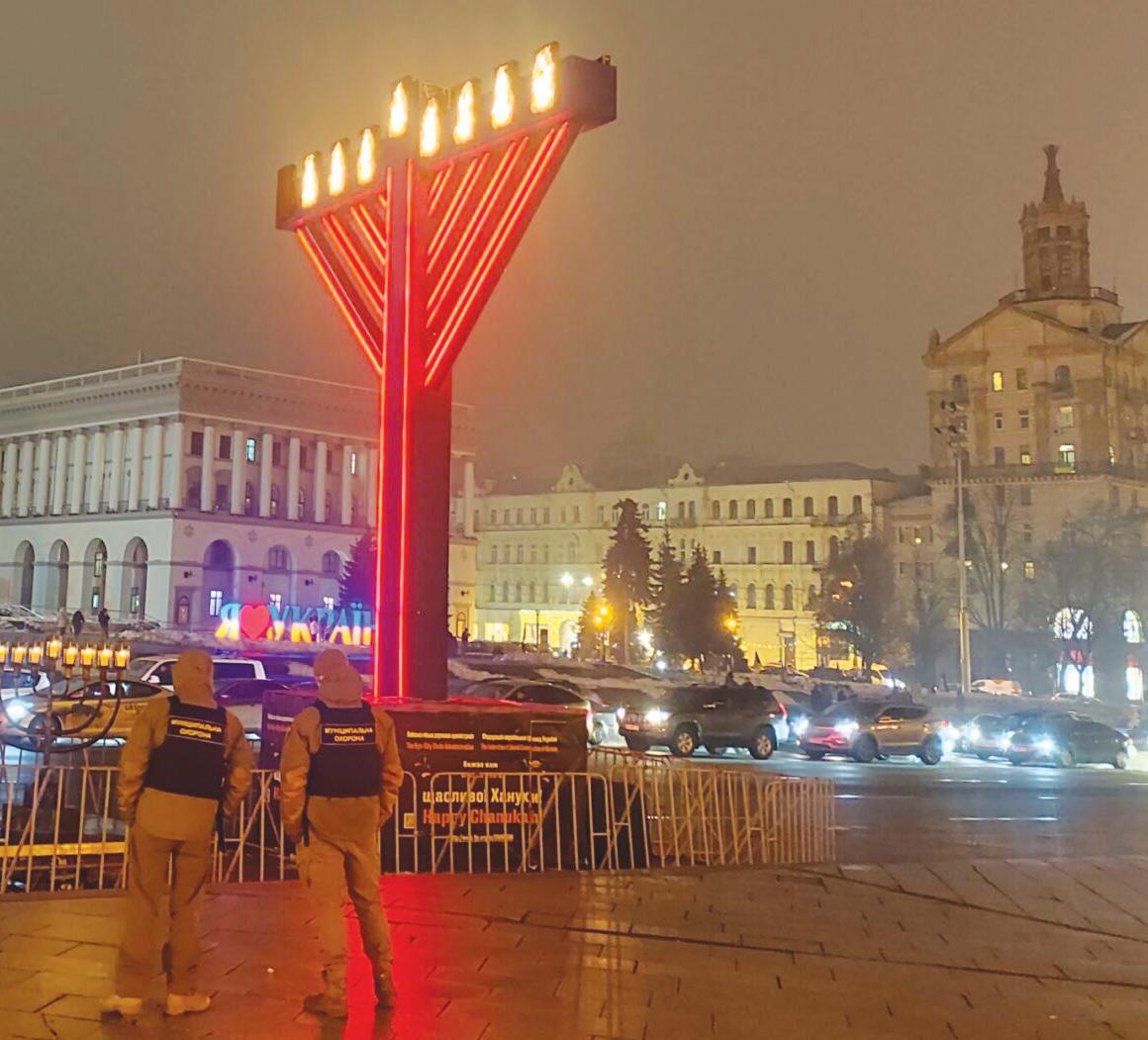
“At the end of the day, we have a database of 52,000 families that we serve, and it hasn’t changed much,” says the Chabad rabbi, who explains that many have sought material or spiritual support for the first time or have joined their local community to offer help to those in need.
Ukrainians across the country have adapted to living under the threat of Russian bombs. Yevhen Lando, 48, who teaches at the Department of Highways, Geodesy and Land Management of the Academy of Construction and Architecture in Dnipro, says Jewish life in the city hasn’t “changed significantly” despite all the convulsions of these two years of war.
“Of course we struggle with anxieties, but somehow we got used to it, we adapted, and we live,” Lando said.
But the steep degree of internal displacement, in a country where an estimated 3.7 million people have moved because of the war, has induced striking changes. As in Kropyvnytskyi, Jewish refugees from regions closer to the frontlines or occupied by Russia have revitalized other communities further away from the combat zone.
In Chernivtsi, a city of
260,000 in western Ukraine that has received thousands of internally displaced Ukrainians from regions more exposed to Russian attacks, the Masorti community has more
than doubled its local membership, which has now reached nearly 70 members.
“With the beginning of the full-scale war, our community gained many new interesting members who are now part of the community life; some come for Shabbat and the holidays or help to prepare for events,” said Anastasiia Zlobina, a youth leader in the city’s Jewish community.
“The new members came from places like Kyiv, Kharkiv, Mykolayiv, Zaporizhzhia or Odesa,” said Zlobina, who goes by her Hebrew name of Naomi. “They are not immigrants anymore but full members of the community, part of our family.”

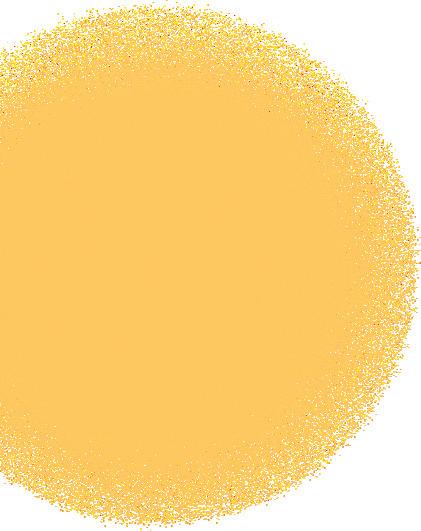
“Truly a cultural phenomenon.” – The Sunday
“Beautiful, Inventive and Uplifting”



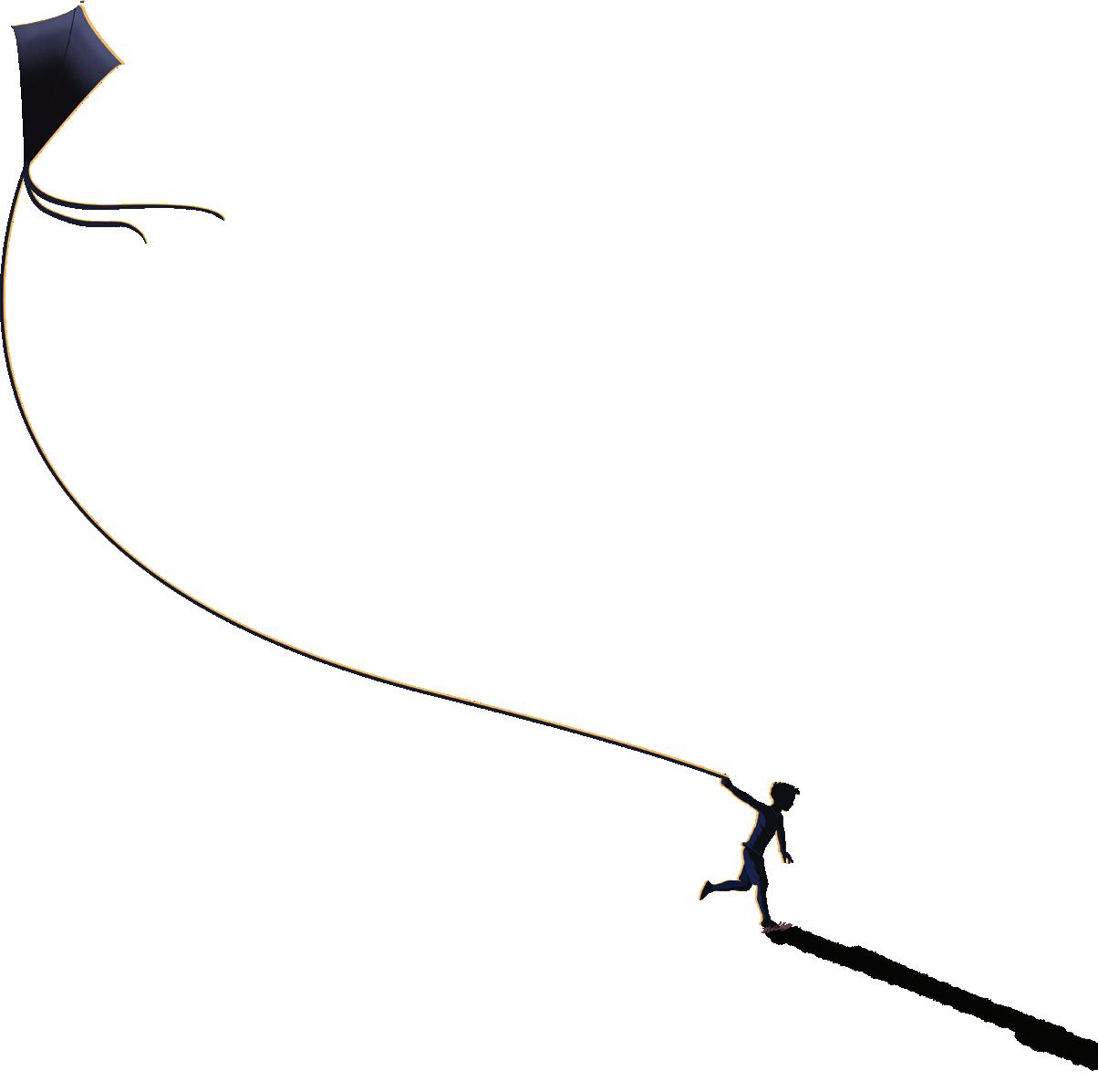








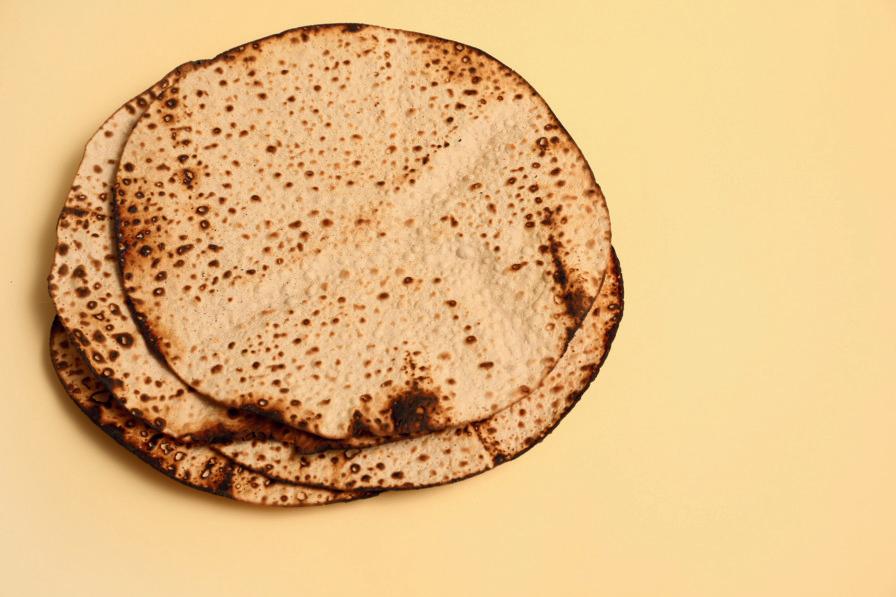

By now, Israeli charities that need funding for Oct. 7 recovery efforts know very well where to turn.
Monday, April 29
Tuesday, April 23
Wednesday, April 24
Morning Prayer
Mincha & Maariv 10:00 am 8:00 pm
Monday night, April 22 | 7:30pm
Morning Prayer Mincha & Maariv
Tuesday, April 30
Morning Prayer
Yizkor
Mincha
9:30am 8:00 pm 9:30am ~11:00 am 7:30 pm
Enjoy the Seder with kosher wines, handmade Shemura Matza and a four-course dinner. Discover the Haggada and the timeless messages of Passover.
Traditional handmade shmurah matzah makes the seder authentic, so order your Matzah today! Do you need Seder items, or full Kosher for Pesach dinners? Get everything you need for Pesach at Chabad. Order online or call us!
www.ChabadDayton.com/Seder or 937-643-0770 x3.
Any chametz left undisposed must be sold before Pesach. Use our online form to quickly delegate a rabbi to sell your chametz for you.
Tuesday night, April 30 | 7:45pm
Following the custom of the Baal Shem Tov, Pesach concludes with a Feast of Moshiach. This festive meal complete with Matzah and, four cups of wine, begins before sunset. It is the perfect way to spiritually take leave of Pesach.
Jews in North America have donated nearly $800 million to local Jewish Federations to support those efforts, a fundraising drive on a scale unseen for 50 years. About half the money has been allocated so far.
As co-chair of a body known as the Israel Emergency Allocations Committee, Jeff Schoenfeld helps oversee postOct. 7-related grantmaking for the entire Federation system.
The committee is part of the Jewish Federations of North America, an umbrella organization, but includes representatives from a broad swath of institutions.
Schoenfeld and his committee have a staff of 18 in Israel helping review grant applications, which tend to get approved as long as they fit in one of four buckets: lifeline or emergency needs; mental health and trauma; economic aid; and community resilience and rebuilding.
Many of our readers donated to support Israel through their local Federation after Oct. 7. As one of the people in charge of shepherding their money, what message do you have for them?
It’s very clear that American Jewish philanthropy has been the entire human support system for Israel since Oct. 7. The government of Israel is still formulating its response. In the future, they may become a major player but to date, it has been philanthropy.
JFNA
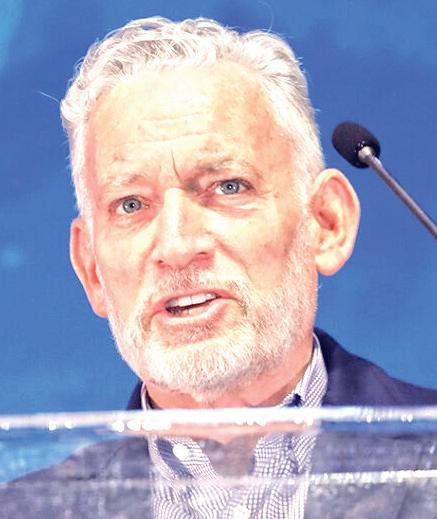
The committee also decides whether to grant the entire amount requested or some portion based on an evaluation of needs or whether other funding sources might be available.
As the media has reported, and as Schoenfeld has seen directly, the Israeli government did not meet the needs of Israeli civilians following Oct. 7.
Philanthropy stepped in to fill the vacuum — a reality that Schoenfeld acknowledges but does not regard with criticism. Instead, he approaches it with a sense of duty and purpose.
A retired investment banker and past president of UJA-Federation of New York, Schoenfeld since Oct. 7 has found himself busy with a never-ending series of meetings about Israel’s recovery.
The volunteer role is one of many philanthropic commitments on his schedule.
He also serves on the boards overseeing the Jewish Agency for Israel and the American Jewish Joint Distribution Committee.
Motivated by his experience as a closeted gay executive on Wall Street, Schoenfeld today is also an outspoken champion of diversity and inclusion in the business world.
Schoenfeld agreed to sit down on Zoom for a two interviews with JTA, which have been edited, condensed, and formatted.
That sounds like a challenging responsibility.
Yes, one of the most difficult challenges is understanding where the government is going to show up, when the government is going to show up, and how much the government is going to show up.
And many things are appropriate for philanthropy to support, but also, many things should be the job of the government of Israel. And we are always working through that calculus.
Can you give me a few examples?
The terrorists directly targeted farm equipment across the kibbutzim in the south. A great deal of the farm equipment was destroyed that day — burned up or stolen into Gaza. So Israeli farmers in the entire Gaza envelope are without the necessary farm equipment to get back into business. The key planting season of the year begins at the end of April. Time is of the essence.
The missing equipment is a $25 million need. Half of it will come from insurance proceeds and half of it is true philanthropy: Jewish Federations of North America (just recently) made a grant to cover all the remaining costs of the farm equipment so that new tractors and farm equipment can be purchased and delivered to Israel in time for farmers to have the planting equipment by the end of April.
That is a newsworthy announcement, but could you explain how it’s related to the government versus philanthropy question?
There is no greater call on government resources than supporting agriculture, which is the primary business in these communities in the south. And the government initially has said they’re not going to fund it. So philanthropy has to step in to do the job.
The last chapter has not been written. There still are ongoing conversations
with the government about covering some of the costs, but, initially, JFNA has stepped up to say this is so vital for the economic recovery of the south, that we’re going to make this happen.
I didn’t anticipate you saying that. I thought you were going to say that the government simply moves too slowly for the demands of the planting season.
So far, they’ve said no.
Any other examples that come to mind, perhaps from earlier in the war?
The largest example would be that the government said initially that they were going to cover the needs of residents who live zero to seven kilometers from the Gaza border. If you were so unlucky to live eight, or nine, or 10, you were on your own, which means philanthropy played a huge role in supporting those who had immediate needs, who just didn’t happen to live zero to seven kilometers from the Gaza border. That’s tens of thousands of people.
Is there a risk that you’re giving permission to the government not to take action — incentivizing inaction? Is that a concern?
ning phase and they are going to be releasing their plan to the government on March 18. But today, little or no money has flowed from Tekuma to meet the immediate needs of the affected communities. The Federations, and more broadly, global philanthropy, has played that role.
Following the interview, Schoenfeld sent an email seeking to clarify his sentiment: “I was thinking about our conversation just now. I would want my characterization of government inaction so far to be more of a fact statement than to come off as a harsh criticism. It will do no good to come down hard on a government that is fighting a major war.”
I want to talk about politics. The Federations are a coalition where people share a general pro-Israel outlook, but there are lots of perhaps conflicting opinions on Benjamin Netanyahu, his proposed judicial reforms, the specifics of the war with Hamas, or even the occupation. What impact has recent political turmoil had on the committee’s work?
'American Jewish philanthropy has been the entire human support system for Israel since Oct. 7.'
Absolutely. But we’ve taken the stance that we have people in need, and they cannot wait. And if the government is going to be too slow, or the government decides it’s not in their coverage agenda, we’re going to step in and do what’s needed. But there’s a level of frustration indeed.
Can you say more about the frustration?
So right after Oct. 7, I think in a very smart way, the government created a special authority called Tekuma to be the key architect and funder of the rebuilding of the south. But their territory is limited.
Many communities that have been hard hit are not within the Tekuma planning agenda. And, of course, Tekuma has nothing to do with the north of Israel, which is also being very hard hit (Hezbollah, which is based in Lebanon, has been firing rockets at Israel’s northern region). So it’s a limited focus.
Tekuma have been spending the last five months in a plan-
Some organizations want to go back and document all the atrocities that happened for historical purposes, the National Library in Israel, for instance. That’s really important work. But it’s not our lane. That might be somebody else’s lane. And I’m reluctant to make that too public.
In normal times, when you get a grant, there are all these reporting requirements attached. But since this is considered an emergency, have these requirements been changed?
The only thing that’s changed is the timeline. We still need to measure impact. We have a team that is working to provide as much data back to our Federation community as possible on the impact of our grantmaking. So the responsibility to report back has not changed. The timing has changed. We realize we’re still in a crisis. So we’re giving them plenty of time to report back.
What are the challenges you expect going forward?
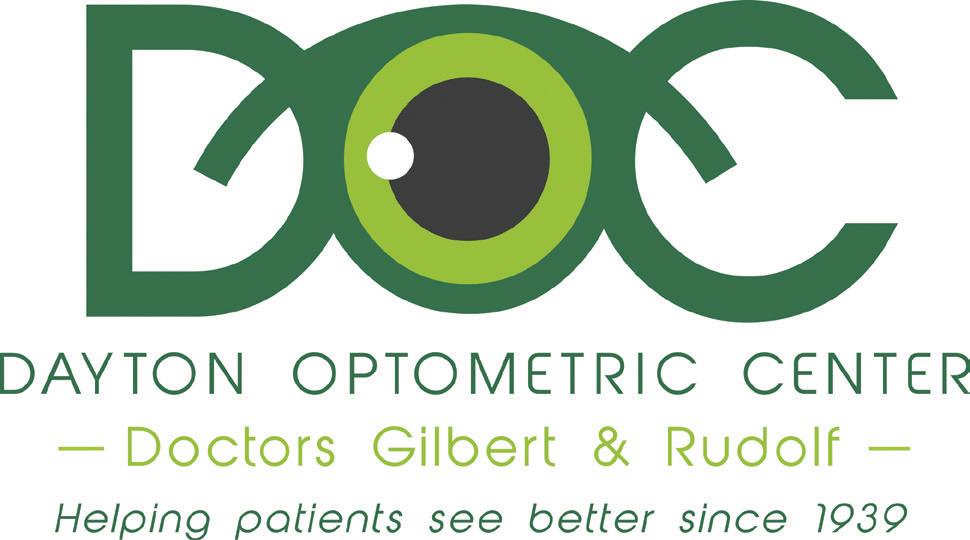

None. Because, remember, our focus is humanitarian aid and economic assistance. The politics do not intervene, really, in those agenda areas.
Have there been any difficult moments of disagreement among committee members about which grant requests to accept?
We’ve been fortunate to have very generous funding. And so we haven’t had to say no, more often than not. It isn’t as if we have limited resources, and therefore we have to turn down proposals that might otherwise be funded.
I want to make sure I understand that. As long as the proposal fits within your parameters, you haven’t had to say to anyone, “We love this project but we don’t have enough money to support you.”
That’s right.
I’m sure there are a lot of cases where the grant proposal fits very clearly within your mandate, and then it’s probably an easy decision. Have you gotten good requests that just don’t fit into your mission?
We know from history that trauma needs don’t always show up early, that there are latent needs to prepare for. We are partnering with the Ministry of Health to cover some of the initial trauma-related programmatic needs, with the understanding that the government is going to pick up 100% of the cost in year two and beyond.
We are also focused on the needs of soldiers as they come off of reserve duty and try to integrate back into family life, and work life. Those are really significant issues right now. Workforce development would be another category. Many of the evacuees from the south and potentially from the north may never return to their home communities and they are reestablishing life in new locations. Many will need help acquiring new skills.
Sorry to be grim, but are you prepared for a scenario of Hezbollah entering the fray in earnest?
We absolutely are and we’re already addressing some of the needs of the tens of thousands who have been displaced from the north. We provide annual support to major partners like the Jewish Agency and JDC so that when emergencies happen, they’re ready and don’t have to build the firehouse while the fires are raging.

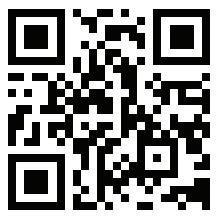
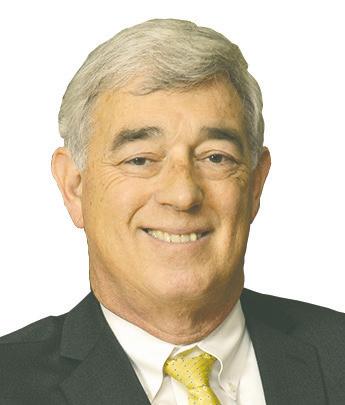
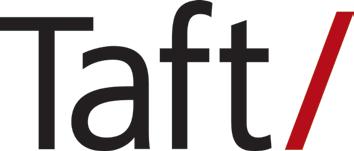
Scalable

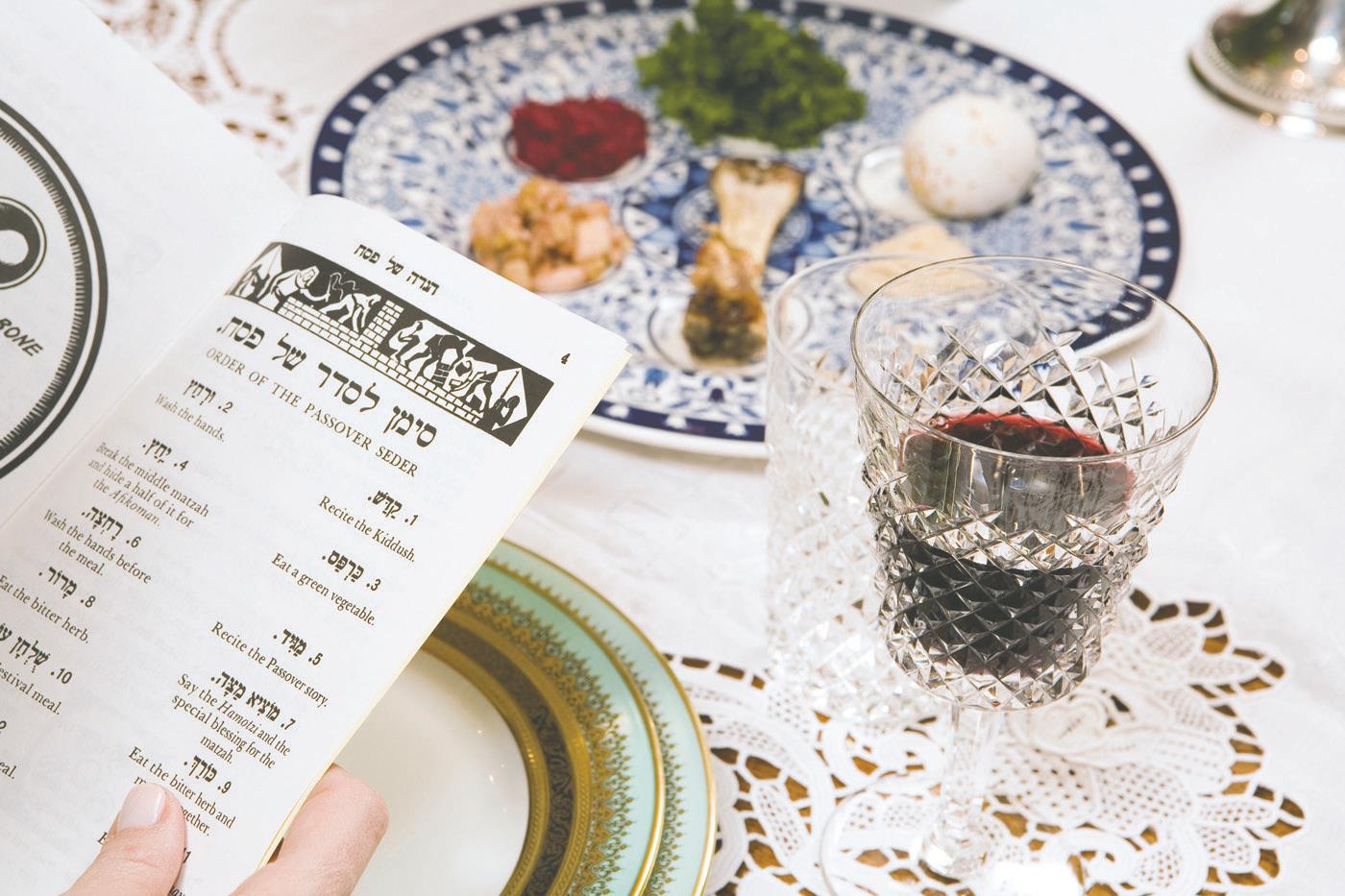

A Chabad house in Fort Lauderdale, Fla. was damaged in a suspected arson attack March 16, and local authorities have arrested a 50-year-old man they believe to be responsible.
The rabbi of the Las Olas Chabad Jewish Community Center told local news that he was alerted to the fire that morning, and that security camera footage showed a man lighting the rabbi’s van on fire after first attempting to light the building itself on fire.
No one was injured, Rabbi Chaim Slavaticki said, but the kosher kitchen was destroyed and there was smoke damage to the Torah and other elements of the building.
The fire occurred hours before scheduled Shabbat morning services, which the ChabadLubavitch congregation wound up holding outside, Slavaticki said.
The suspect, 50-year-old Scott Hannaford, had run-ins with the rabbi and his wife in the past, according to Slavaticki, who said Hannaford has screamed at his family and blocked their vehicle’s path near the synagogue.
Police charged Hannaford with two counts of arson, criminal mischief, and possession of cocaine, but said they would not charge Hannaford with a hate crime because they considered the arson to be an isolated incident and said he appeared to be suffering from mental illness.
Slavaticki and other Chabad congregants, however, believe the alleged actions merit a hate crime charge. “It was a clearly targeted attack on our facility and our community,” the center said in a statement on its Facebook page.
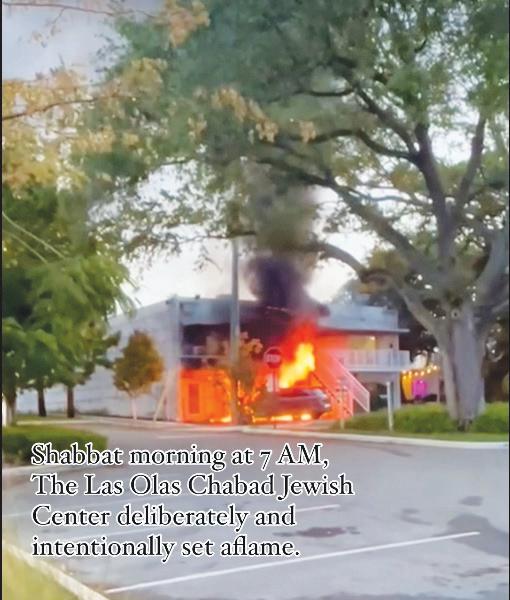
and helps so many different people from so many different walks of life,” Slavatacki told local news outlets. But he also said he had hope because a prayer book sitting inside his van was still intact after the fire: “This is a hug from God, and God is telling us to all stand together.”
Police considered the arson to be an isolated incident and said Hannaford appeared to be suffering from mental illness.
Dean Myerlow, who is involved with the Chabad, told local news, “The individual that perpetrated this crime needs to have the book thrown at him. This is not an accident. Our congregation has nowhere to worship, so this is a barbaric act.”
“We are still in shock that such a thing could happen at a community center that is a light
As particularly visible and often accessible spaces of Jewish worship, Chabad houses have been targets of vandalism in the past. Last year, a man was arrested after attempting to break in to a different Chabad house in Florida.
In general, reports of antisemitic incidents including attacks on synagogues have gone drastically up since the outbreak of the Israel-Hamas war.
The Las Olas Chabad house launched an online fundraiser in an effort to raise $1 million to repair the damage. It has raised over $74,000 as of press time.
Beth Abraham Classes: w. Rabbi Glazer. Mondays, 10 a.m.: Mishnah on Zoom. Register at 937-293-9520.
Beth Jacob Classes: w. Rabbi Agar. Tuesdays, 7 p.m.: Torah Tuesdays on Zoom. Thursdays, 7 p.m.: Thursdays of Thought on Zoom. Call to register, 937-274-2149.
Chabad Classes: Tuesdays, 8 p.m.: Code of Jewish Law. Wednesdays, 7:30 p.m.: Talmud. Thursdays, noon: Parsha on Zoom. chabaddayton.com. 2001 Far Hills Ave., Oakwood. 937-643-0770.
Temple Beth Or Classes: Sundays, 12:30 p.m.: Adult Hebrew. Thurs., April 4, 11, 7 p.m.: Chai Mitzvah on Zoom. 937-435-3400.
Temple Israel Classes: Tues., April 2, 9, 16, 30, noon: Hybrid Talmud Study. Wednesdays, 10 a.m.: Torah Queeries w. Rabbinic Intern Kit Brewer, call for location. Thurs., April 25, 3:30 p.m.: Living w. Ambiguous Loss w. Rabbi Bodney-Halasz. Fri., April 5, 11 a.m.: Living w. Loss w. Rabbi Bodney-Halasz. Saturdays, 9:15 a.m.: Virtual Torah Study. Sat., April 13, 9:15 a.m.: Hybrid Torah Study. tidatyon.org/calendar. RSVPs to office, 937-496-0050. 130 Riverside Dr., Dayton.
Joe Posnanski, Why We Love Baseball: Sun., April 14, 5 p.m. Boonshoft CJCE, 525 Versailles Dr., Centerville. $10 includes ball park supper (veg. option available). Tickets at jewishdayton.org/events or 937-610-1555.
Beth Abraham Rhythm & Ruach: Fri., April 12, 5:30 p.m. w. Cantor Raizen. 305 Sugar Camp Cir., Oakwood. 937-293-9520.
Chabad Ckids Seder Circus: Sun., April 14, 4 p.m. Free. RSVP at chabaddayton.com. 2001 Far Hills Ave., Oakwood. 937-643-0770.
Temple Israel Prayer & Play: Fri., April 19, 5:30 p.m. Infants-2nd grade.130 Riverside Dr., Dayton. 937-496-0050.
Chabad Women's Circle Mikvah Tour & Discussion: Tues., March 26, 7 p.m. Miami Valley Mikvah, 605 Sugar Camp Cir., Oakwood. Light refreshments. $25 suggested donation. RSVP at chabaddayton.com/cwc.
Chabad Bagels, Lox & Tefillin: Sun., April 7, 9:30 a.m. 13+ welcome. 2001 Far Hills Ave., Oakwood. chabaddayton. com. 937-643-0770.



Adults
Temple Israel Brotherhood Ryterband Brunch & Speaker Series: $7. Sundays, 9:45 a.m. April 7: Rabbinic Intern Kit Brewer, God Shopping. April 14: Rabbi Sobo. 130 Riverside Dr., Dayton. 937-4960050.
When Dance Transcends Barriers w. DCDC2.: Sun., April 7, 3 p.m. $18. Register at jewishdayton.org/events. At Beth Jacob, 7020 N. Main St., Clayton. 937-610-1555.
JCC Boomers Dine Out at La Fiesta: Sun., April 7, 5 p.m. Pay own way. Contact Stacy Emoff for info., semoff@jfgd. net. RSVP jewishdayton.org/ events. La Fiesta Mexican Restaurant, 8331 N. Main St., Dayton. 937-610-1555.
Beth Abraham Men’s Club Annual Deli Dinner, Movie, & Raffle: Sun., April 7, 6 p.m. $20. RSVP 937-293-9520.
Beth Abraham Presents Heschel’s Passover Eve: Tues., April 9, 7 p.m. Free. Reservations required, bethabrahamdayton.org/events/heschels-passover-eve-a-play. 305 Sugar Camp Cir., Oakwood. 937-293-9520.
Wittenberg Univ. Leventhal Lecture: w. NYT writer Eli Saslow, Rising Out of Hatred. Tues., April 9, 7 p.m. Bayley Auditorium, Kuss Science Center, 315 Bill Edwards Dr,


Springfield. For info., contact Katie Warber, kwarber@wittenberg.edu.
44th Ryterband Symposium: w. Prof. Naomi Seidman, Univ. Toronto. Thurs., April 11, 4 p.m.: Sarah Schenirer & the Bais Yaakov Movement. 7 p.m.: Jesus Spoke Yiddish. Free & open to the community. UD's Curran Place, 1700 S. Patterson Blvd. For info., call WSU Prof. Mark Verman, 937775-2461.
Temple Israel’s So A Rabbi Walks into a Bar: Thurs., Apr. 18, 6 p.m. First drink on Rabbi Bodney-Halasz. BJ’s Restaurant and Brewhouse, 2715 Fairfield Commons Blvd.
Beavercreek. 937-496-0050.
Community
Beth Abraham Men’s Club
Eclipse Spectacular: Mon., April 8, 12:30 p.m. $13. Kosher deli lunch. Glasses provided. 305 Sugar Camp Cir., Oakwood. RSVP to 937-293-9520.
Passover
Chabad Community Seder: Mon., April 22, 7:30 p.m. $36. RSVP at chabaddayton.com. 2001 Far Hills Ave., Oakwood. 937-643-0770.
Temple Beth Or Second
Seder: Tues., April 23, 6:30 p.m. Bernstein’s Fine Catering. RSVP at templebethor.com or call 937-435-3400. 5275 Marshall Rd., Wash. Twp.



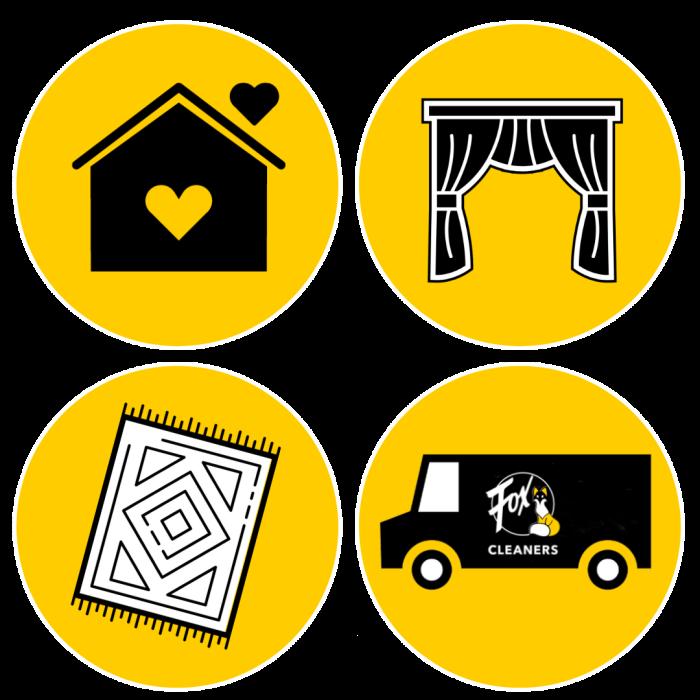




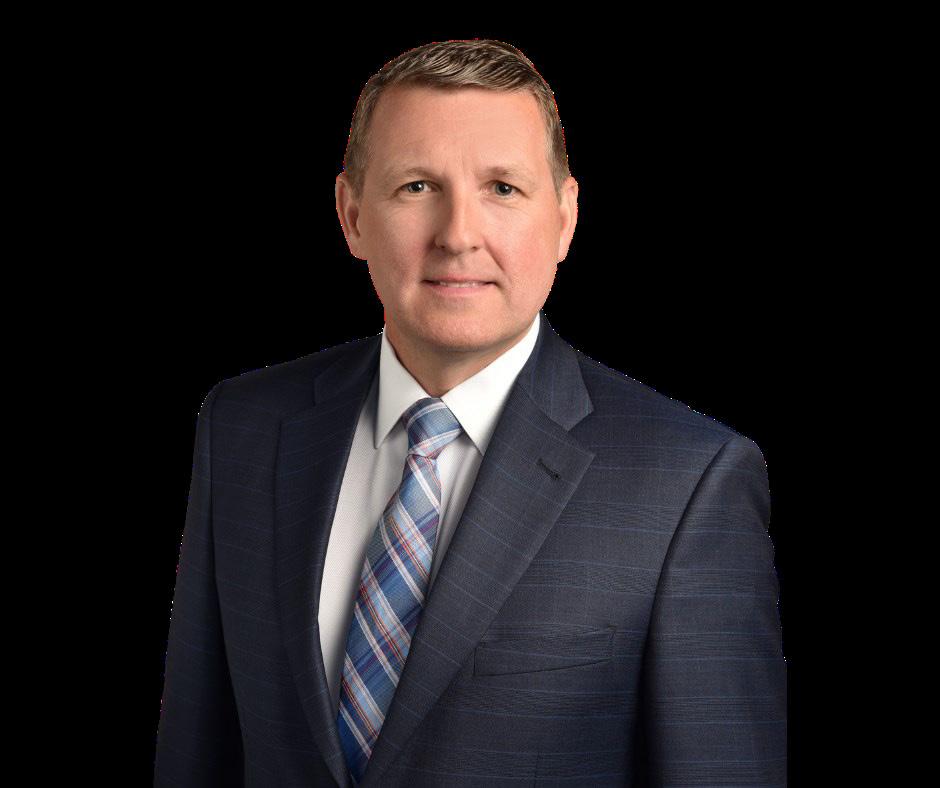

As a left-wing Israeli, I won’t give up on my ideals of peace — and I also don’t accept the world’s willingness to leave Israel in the dustBy Sarah Tuttle-Singer
We identify as left-wing Israelis.
It wasn’t enough for the rest of the world.
We wrote, “Hatred is not a value; racism isn’t the way” on our hands.
It wasn’t enough for the rest of the world.
We sent our kids to coexistence camps and schools.
It wasn’t enough for the rest of the world.
We tried our best to learn Arabic.
It wasn’t enough for the rest of the world.
We became friends with Palestinians and had frank and earnest discussions with them about how to move forward and make things better for our children.
It wasn’t enough for the rest of the world.
We planted trees with Palestinians and fought off armed settlers.
It wasn’t enough for the rest of the world.
Many of us refused to buy settlement goods.
It wasn’t enough for the rest of the world.
We protested the Occupation.
It wasn’t enough for the rest of the world.
We said, “Boycotts don’t help end the Occupation, but we support your right to boycott.”
It wasn’t enough for the rest of the world.
We defended the right of our Palestinian brothers and sisters to hold Nakba Day commemorations.
It wasn’t enough for the rest of the world.
We even stood beside them at protests and waved watermelon signs.
It wasn’t enough for the rest of the world.
We wrote op-eds and essays and open letters calling for a just and equal shared society for Arabs and Jews.
It wasn’t enough for the rest of the world.
We voted for left-wing Jewish parties and Palestinian parties in our national elections.
It wasn’t enough for the rest of the world.
So, what do you think?
We wept when Itamar Ben Gvir and Bezalel Smotrich were voted into the Knesset.
It wasn’t enough for the rest of the world.
We protested the government and some of us were even arrested or hit in the face with water cannons during the demonstrations.
It wasn’t enough for the rest of the world.
Some of us sat in jail because we refused to serve in the army.
It wasn’t enough for the rest of the world.
We lost touch with some of our more right-wing friends and family.
It wasn’t enough for the rest of the world.
We were called traitors and kapos by people we loved.
It wasn’t enough for the rest of the world.
We spent our lives insisting that justice and peace are the only way forward for everyone.
It wasn’t enough for the rest of the world.
We fought alongside our Palestinian brothers and sisters for equal rights
It wasn’t enough for the rest of the world.
We fought to get Gazans medical permits and drove them to their doctors’ appointments and visited them in the hospital and advocated for them when the government gave them a hard time.
It wasn’t enough for the rest of the world.
We connected with like-minded peace activists living near Gaza…and then later saw them get raped, tortured, and slaughtered on October 7th.
It wasn’t enough for the rest of the world.
We continue to endure lies about our lived experiences here on October 7, and do our best to respond with grace and truth.
It isn’t enough for the rest of the world.
We see the devastation in Gaza and continue to call for a just solution for Israelis and Palestinians to live side by side, as brothers and sisters.
It isn’t enough for the rest of the world.
We advocate for our stolen family — the hostages (two babies! grandparents!) — who are suffering, wounded, and in mortal danger.
It isn’t enough for the rest of the world.
We continue to implore our government to do whatever it takes to bring our hostages home now. Right now! Even if it means we stop the war today.
It isn’t enough for the rest of the world.
We call for our leaders to do more to feed starving children and families in Gaza — many of us give money to charities that are supposed to send aid, and we pray we aren’t inadvertently helping Hamas.
It isn’t enough for the rest of the world.
Some of us even call for a cease-fire.
It isn’t enough for the rest of the world.
So, I turn to you now:
WHEN will it be enough?
WHEN will we be seen? WHEN will we be allowed to grieve?
When we give up our right to feel safe?
When we give up and let Hamas swallow the hostages whole?
When we stop fighting for our right to exist?
When we just line up to be killed?
Will it be enough then?
Now, to be clear: I’ll NEVER be done fighting for a just and equal solution to this conflict — for freedom, for some kind of restitution, for basic dignity, and, yes, security for everyone…Palestinian and Israeli. From the river to the sea.
I believe in this with all my heart and all my soul and all my being.
This is a hill I am willing to die on — and I am fully aware that I might.
But I am DONE giving a damn what the rest of the world thinks of me.
So, I’ll turn within and focus here. I’ll build community, and continue those frank and earnest discussions with my Palestinian brothers and sisters. I’ll continue to call out extremism and racism in the government. I’ll keep advocating for the hostages. I’ll struggle to learn Arabic and continue to look for ways to build bridges between others who also want security and freedom and peace for all of us and our children.
I’ll turn within — and focus here — on making Israel a truly safe and free and strong shared society for all who want to live here and are willing to work together.
I am done with what the rest of the world thinks. It is enough.
Sarah Tuttle-Singer is the author of Jerusalem Drawn and Quartered and the new media editor at Times of Israel.
WEDNESDAYS, 12:30 - 3:30PM Open Canasta
THURSDAY, APRIL 4, 6PM
A Women's Seder: Our Journey Towards Community
SUNDAY, APRIL 7, 3PM
When Dance Transcends Barriers — The story of Jewish & African American dance in Dayton
SUNDAY, APRIL 7, 5PM
JCC Boomers Dine Out at La Fiesta
SUNDAY, APRIL 14, 5PM
Cultural Arts & Book Series — Joe Posnanski
Connect with us! Check out our events. For more information, check out our calendar at jewishdayton.org
The story of Jewish & African American dance in Dayton
Sunday, April 7, 3 – 4:30PM at Beth Jacob Congregation 7020 N. Main Street, Harrison Township, 45415
Uncover a chapter in Dayton history with the Dayton Contemporary Dance Company (DCDC). Experience a leap through time with a soul-stirring performance by DCDC2 that celebrates the extraordinary lives and legacies of DCDC founder and African American trailblazer, Jeraldyne Blunden, and Jewish pioneering fi gures of Dayton Ballet, Josephine and Hermene Schwarz.
Witness the rhythm of resilience as Blunden's unwavering spirit blends with the groundbreaking steps of the Schwarz sisters. Prepare to be captivated by a mosaic in motion, where faith, passion, and artistry transcend the bounds of tradition.
This spiritual journey presented by DCDC illuminates the untold story of women who defied limitations and ignited a dance legacy that continues to inspire. Experience the intertwining of two cultures that leave audiences breathless with the power of dance that knows no barriers.
Tickets may be purchased in advance through the Jewish Federation of Greater Dayton at jewishdayton.org/events. Cost is $18 each, or $10 each for a group of four or more. Day of event – cost is $18 each.

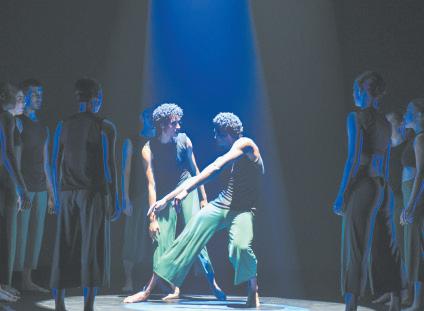

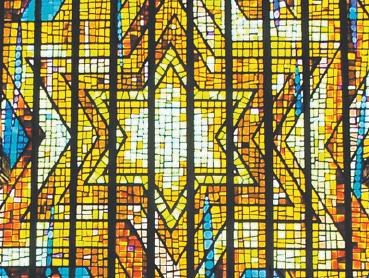












Funding provided by an Innovation Grant of the Jewish Federation of Greater Dayton.

Sunday, April 7, 5 – 6:30PM
La Fiesta Mexican Restaurant 8331 N Main Street, Harrison Township, 45415
Meet your Boomers Group friends for dinner after attending When Dance Transcends Barriers at Beth Jacob Congregation (please see JewishDayton calendar page for further details). Let us know you will be joining us and we will reserve a table!
Cost: Dinner on your own.
RSVP at jewishdayton.org/events or contact Stacy Emo at semo @jfgd.net or call 937-610-5513.
Tuesday,
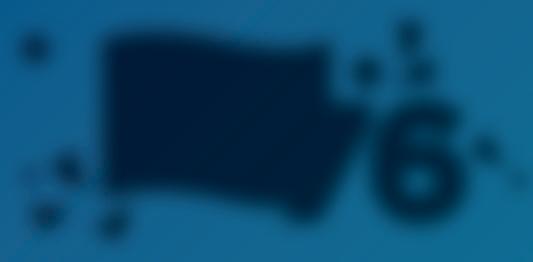






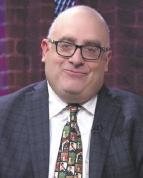

Sunday,

CONGRATULATIONS TO THE CAST OF TUCK EVERLASTING!
YOU WERE AMAZING!

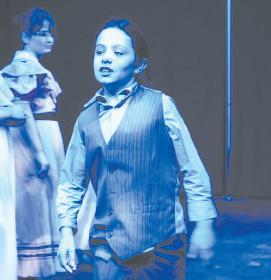
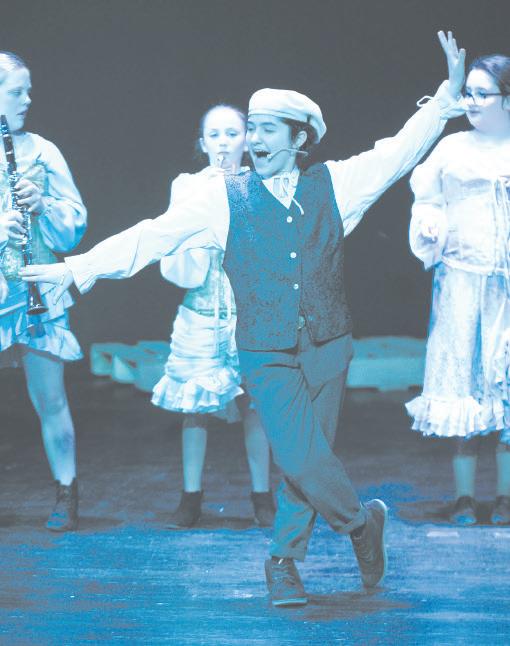




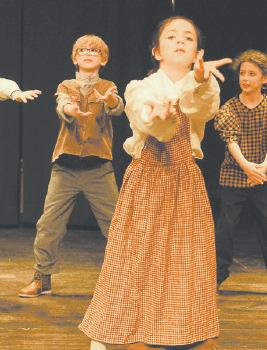


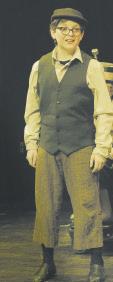

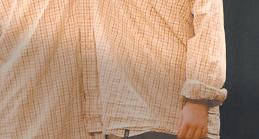









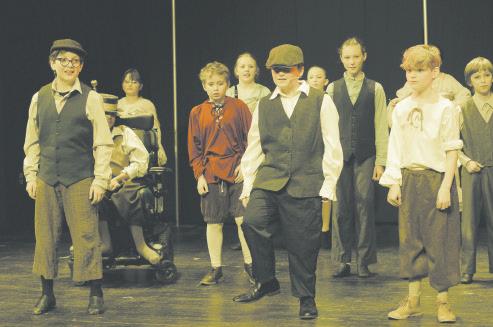


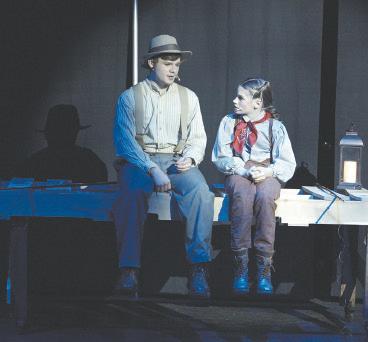



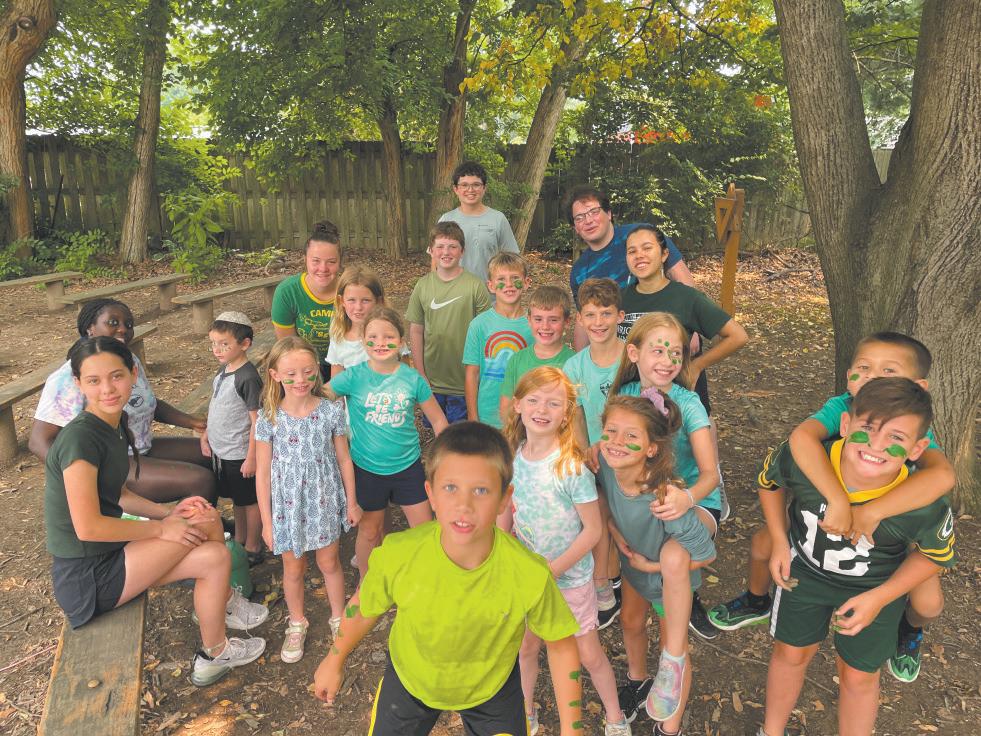


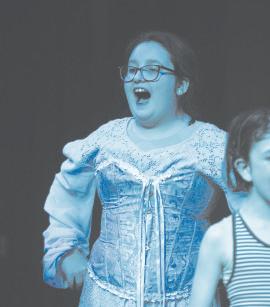





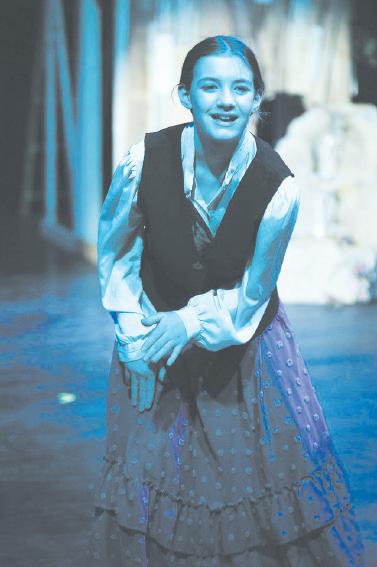




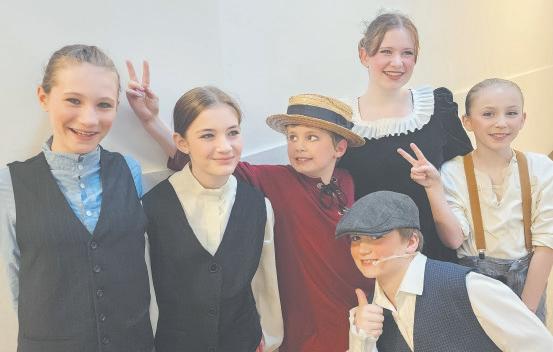

JUNE 3 - JULY 26
Camp Shalom is planning a summer of fun!
We o er the traditional camp experience, a variety of specialty camps including outdoor adventures, magic, Ninja Warrior, cheerleading, and more! Join us for weekly swimming and field trips, great counselors, and lots of friends!
CAMP SHALOM IS HIRING SUMMER STAFF!
Do you know someone 16 or older who would be a great camp counselor? Interested candidates should contact Suzzy Nandrasy at snandrasy@jfgd.net.
See jewishdayton.org for more information. Register at app.compdoc.com/register/jccgreaterdayton.
JEWISH FEDERATION of GREATER DAYTON & ITS AGENCIES
JEWISH FEDERATION OF GREATER DAYTON ENDOWMENT FUND
In memory of Esther and DeNeal Feldman
Caroline and Bob Leventhal
ISRAEL EMERGENCY FUND
In memory of Corky Paston
Susan and Jonas Gruenberg
LINDA RUCHMAN MEMORIAL FUND
In loving memory of Bob Friedman
Linda Ruchman
HOLOCAUST PROGRAMMING FUND
In memory of Eric Segalewitz
Bruce and Suzyn Schwebel Epstein


Children, teens, adults. Please join us!
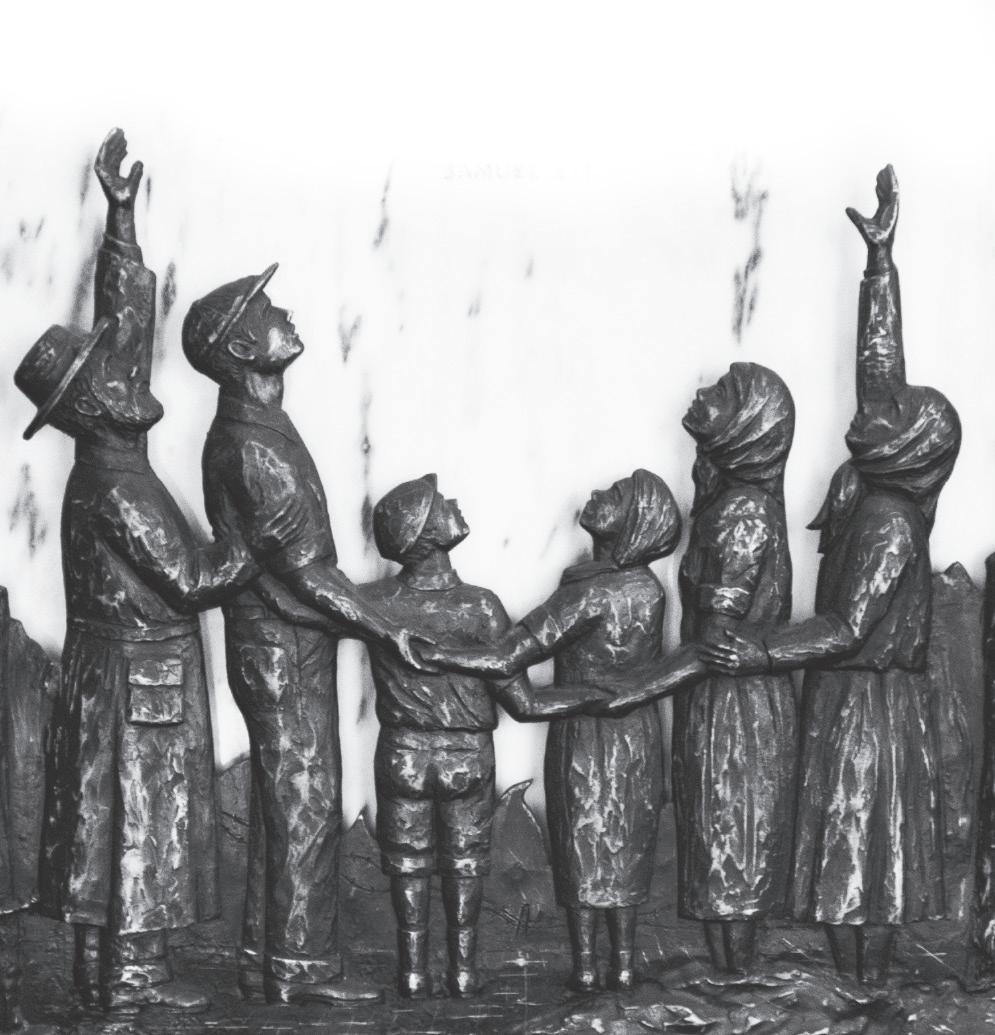
JOAN AND PETER WELLS AND REBECCA
LINVILLE FAMILY, CHILDREN AND YOUTH FUND
In memory of Louis Levin
In memory of Ted Weinreich
Peter and Joan Wells
FILM FESTIVAL
In memory of Louis Levin
Jane and Gary Hochstein
DAYTON JEWISH CEMETERIES FUND
In memory of Louis Levin
Linda Kahn and Lori Ohlmann
Sunday, May 5
Starting At 3PM at Beth Jacob Congregation
7020 North Main Street, Harrison Township, 45415
3:15 – 3:45PM
Teen Program, If You Don’t Ask, You’ll Never Know Why. Second generation survivor Charlotte Golden facilitates a dialogue with teens and other children of Holocaust survivors. Contest participants and teens in our community are invited.
Max and Lydia May Holocaust Art & Writing Contest on display in the social hall until 4pm and following the program.
4PM
Community Yom Hashoah Memorial Service. The tone will be set by international performer/composer Noah Gruenberg, who will play the electric violin. Presentation of contest winners will be followed by guest speaker, Marilou Brewster, who will share the story of her father and mother, who were part of the underground that saved Jews from the Nazis.
PJ Library & PJ Our Way Program, How To Be a Mensch. Join us for a story, craft, and snack. We will discuss how people of all ages can make a di erence!
RSVP by Wednesday, May 1 for all events to Samantha Daniel at sdaniel@jfgd.net or call 937 610-1555.
Sponsored by the Jewish Federation of Greater Dayton. www.jewishdayton.org. Presented by the Yom Hashoah Committee, the Holocaust Education Committee, and the 2024 Max & Lydia May Memorial Holocaust Art & Writing Contest.
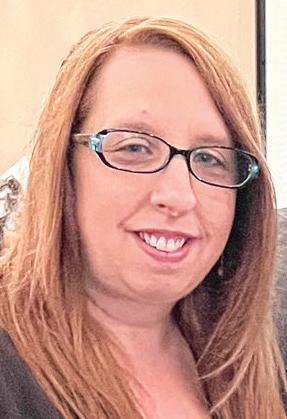
Anna Smith, who began Hillel Academy of Greater Dayton's 2023-24 school year as its interim principal, has been named the Jewish day school's principal. Anna received her doctorate in educational leadership from Northeastern University and a graduate certificate in Jewish education leadership from Hebrew College. She has taught at Hillel since 2019.
Anna was also happy to share the news that beginning with Hillel's 2024-25 school year, it will offer a half-day pre-K program. "We are offering this in response to the community needs for a parttime Jewish school option for 4-year-olds," she says. "It's a wonderful chance for Hillel to introduce Jewish day school education to our youngsters in a more relaxed environment, preparing them to start kindergarten the following year."
Robin Einzig is establishing a nondenominational, multicultural hospice choir for the Dayton area. Carry Me Home: Dayton's Hospice Choir will join what Robin describes as a large, growing tradition of hospice singing. "Hospice choirs are typically made up of volunteers who want to join in providing comfort and healing to people in the ending stages of life as well as their families," Robin, a child development specialist, explains. "The choir will rehearse together regularly, though we will generally sing in smaller groups for patients. We will gradually learn and practice a standard repertoire in two to four vocal parts, working on the unique style and blending needed for this kind of work."
"We will, in time, be collaborating with local hospice organizations to offer our services free of charge to patients and their families." Hospice choirs are usually requested by a family member. The choir comes in a small group to sing for the patient. "Most of the people we will sing for will be in their homes, and sometimes in their rooms at assisted living facilities," Robin says.
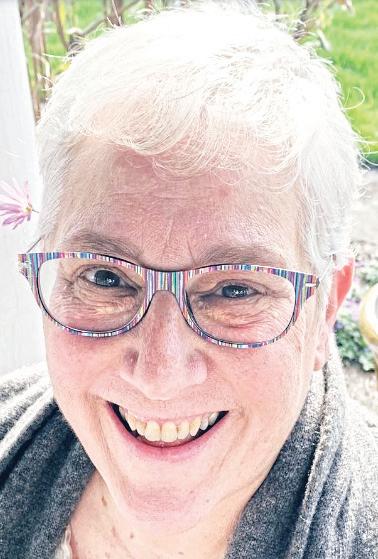
Before moving to Dayton, Robin sang with a hospice choir in the Boston area. Partnering with her to start Dayton's hospice choir is Rebecca Whismant. The choir will perform songs its members may not know in advance: those special to patients and their families.
Carry Me Home will hold two informational meetings: 3 p.m., Saturday, April 13 at the Kettering-Moraine Branch, Dayton Metro Library, 3496 Far Hills Ave.; and 6:30 p.m., Tuesday, April 16 at the Northwest Branch, Dayton Metro Library, 2410 Philadelphia Dr., Dayton. Each meeting will include a screening of the 55-minute documentary, Holding Our Own: Embracing the End of Life, featuring the Hallowell Singers, a hospice choir from Vermont. For details, email Robin at carrymehomechoir@gmail.com.
Send your Mazel Tov announcements to mweiss@jfgd.net.
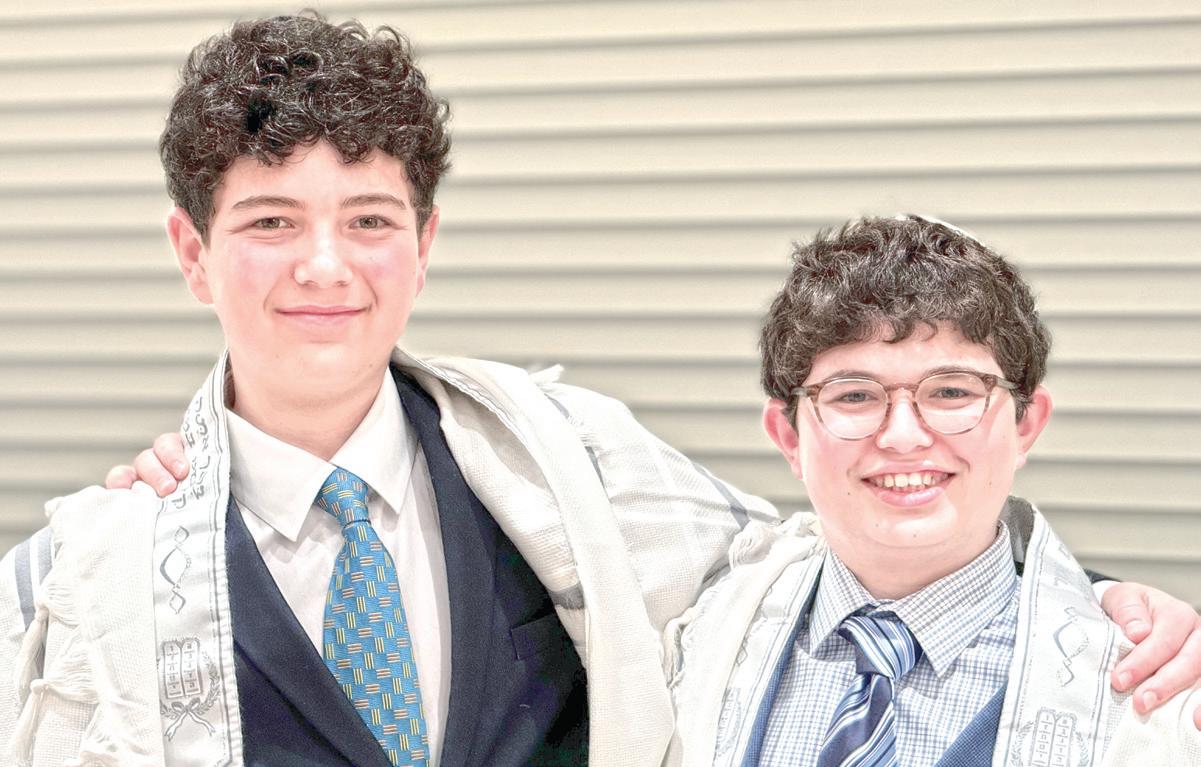
Ezra Jacobs and Jake Davis
With much gratitude, joy, and happiness, we announce the B'nai Mitzvah of cousins Jake Davis and Ezra Jacobs on April 6 at Beth Jacob Congregation. Jacob Asher Davis is the son of Rich Davis and the late and beloved Susan Jacobs Davis. He is the brother of Joey Davis. He is the grandson of Rachel Jacobs and the late Steven Jacobs of Dayton, and Phyllis Davis and the late Arnold Davis of Florida. Jake attended Hillel Academy of Greater Dayton and now attends The Miami Valley School. Jake plays the drums in The Miami Valley School Jazz Band and plays soccer and tennis. Ezra Milling Jacobs is the son of Cassandra and Bradley Jacobs. Ezra is the brother of Samantha and Lucie. He is the grandson of Rachel and the late Steven Jacobs of Dayton, Julieann Maduro Milling and Fred Prins of Boca Raton, Fla., and the late John Milling. Ezra attended Hillel Academy of Greater Dayton prior to being a student at The Miami Valley School. He is a member of the middle school basketball, soccer, and tennis teams, and plays guitar in The Miami Valley School Jazz Band. Ezra has enjoyed the past two summers at Camp Wise.
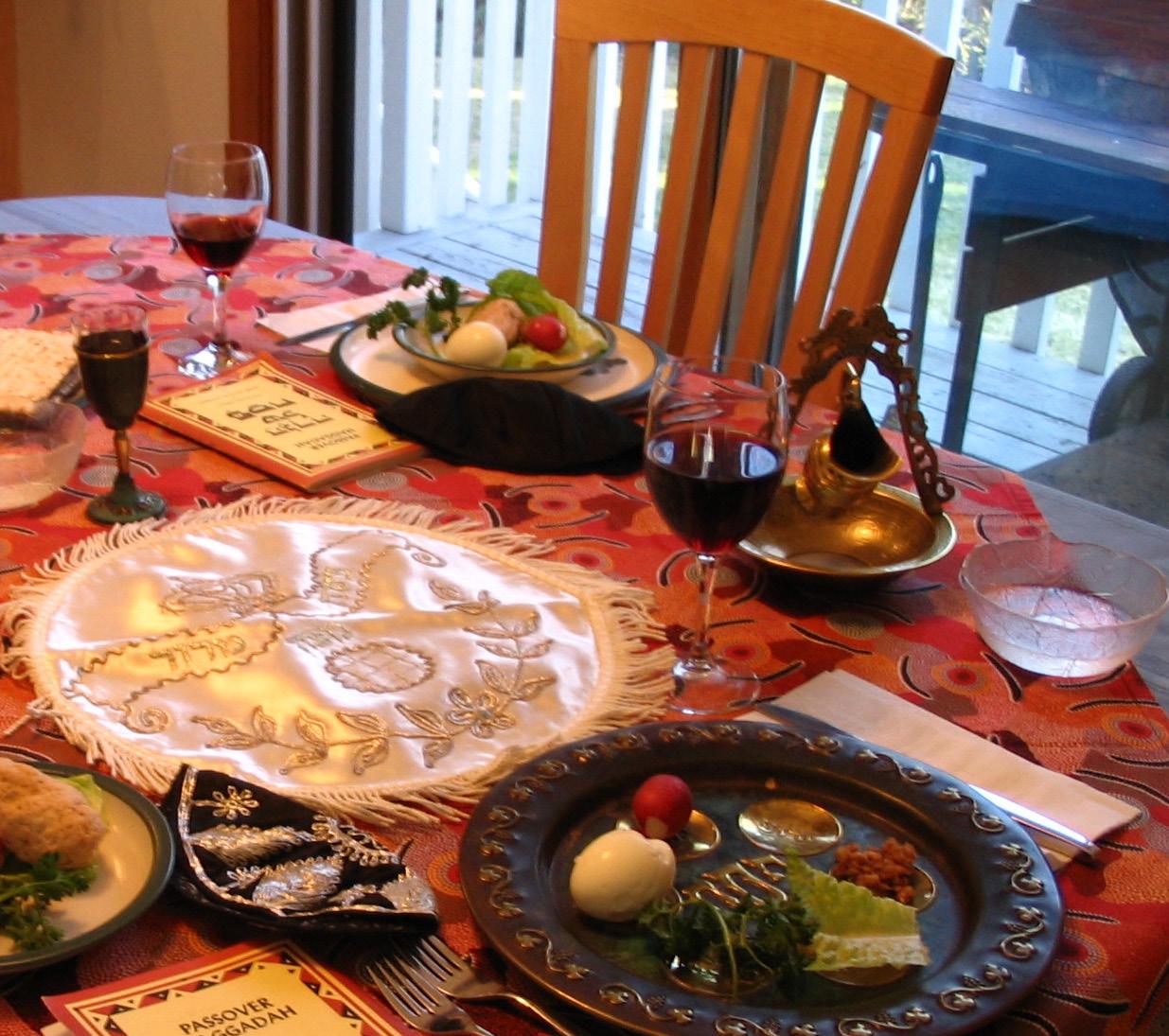
THIS PASSOVER , ELIJAH’S WON’T BE THE ONLY EMPTY SEAT AT THE TABLE.
As we celebrate the seder, we remember those who should still be with us. Some of those seats belong to Magen David Adom medics, who gave their lives trying to save others. Your donation provides the equipment MDA needs so that next year only Elijah’s seat may be empty. Join the effort at afmda.org or call 866.632.2763.
Beth Abraham Synagogue
Conservative
Rabbi Aubrey L. Glazer
Cantor/Dir. of Ed. & Programming
Andrea Raizen
Fridays, 5 p.m.
Saturdays, 9:30 a.m.
305 Sugar Camp Circle, Oakwood. 937-293-9520. bethabrahamdayton.org
Beth Jacob Congregation
Traditional
Rabbi Leibel Agar
Saturdays, 9:30 a.m. Tues., April 23, Wed., April 24, Mon., April 29, Tues., April 30 all at 9:30 a.m.
Evening minyans upon request.
7020 N. Main St., Dayton. 937-274-2149. bethjacobcong.org
Temple Anshe Emeth
Reform
Rabbinic Intern
Gretchen Johnson
Saturday, April 13, 10 a.m.
320 Caldwell St., Piqua.
Contact Steve Shuchat, 937-7262116, ansheemeth@gmail.com. ansheemeth.org
Temple Beth Or
Reform
Rabbi Judy Chessin
Asst. Rabbi/Educator Ben Azriel
Fridays, 6:30 p.m.
5275 Marshall Rd., Wash. Twp. 937-435-3400. templebethor.com
Temple Beth Sholom
Reform
Rabbi Haviva Horvitz 610 Gladys Dr., Middletown. 513-422-8313. templebethsholom.net
Temple Israel
Reform
Senior Rabbi Karen BodneyHalasz. Rabbi/Educator Tina Sobo
Fri., April 5, 6 p.m.
Fridays, April 12, 19, 26, 6:30 p.m.
Saturday, April 13, 10:30 a.m. 130 Riverside Dr., Dayton. 937-496-0050. tidayton.org
Temple Sholom
Reform
Rabbi Cary Kozberg
2424 N. Limestone St., Springfield. 937-399-1231. templesholomoh.com
Chabad of Greater Dayton
Rabbi Nochum Mangel
Associate Rabbi Shmuel Klatzkin Youth & Prog. Dir. Rabbi Levi Simon. Beginner educational service Saturdays, 9:30 a.m. 2001 Far Hills Ave. 937-643-0770. chabaddayton.com
Yellow Springs Havurah Independent
Antioch College Rockford Chapel.
Contact Len Kramer, 937-5724840 or len2654@gmail.com.
As the American Israeli poet Marty Herskovitz thought about the upcoming Passover holiday, the prospect of singing Dayenu at the first Seder since his country was attacked didn’t sit right with him.
The classic Passover song, with a title that means, it would have been enough, expresses gratitude about how much God has done for the Jewish people.
But Herskovitz, the son of a Holocaust survivor who has lived in Israel since 1986, thought the words would ring hollow at a time when so many Jews are at risk.
“We have to take the text and find a way to make it relevant and not just say the words that seem so impossible to say,” Herskovitz said. “‘Dayenu, it’s enough.’
It’s clearly not enough. As long as people are trapped in Gaza, that’s not enough. As long as our soldiers are still risking their lives, it’s not enough.
a fund to support education initiatives in Israel.
The fund has backed his own Creating Memory project at Bar-Ilan University, which focuses on Holocaust remembrance through art, and also Israel’s Conservative rabbinical seminary, the Schechter Institutes.
This year, at Herskovitz’s urging, Schechter convened dozens of rabbis and Jewish community leaders from across Israel in February to re-imagine the Haggadah, the core text of the Passover Seder.
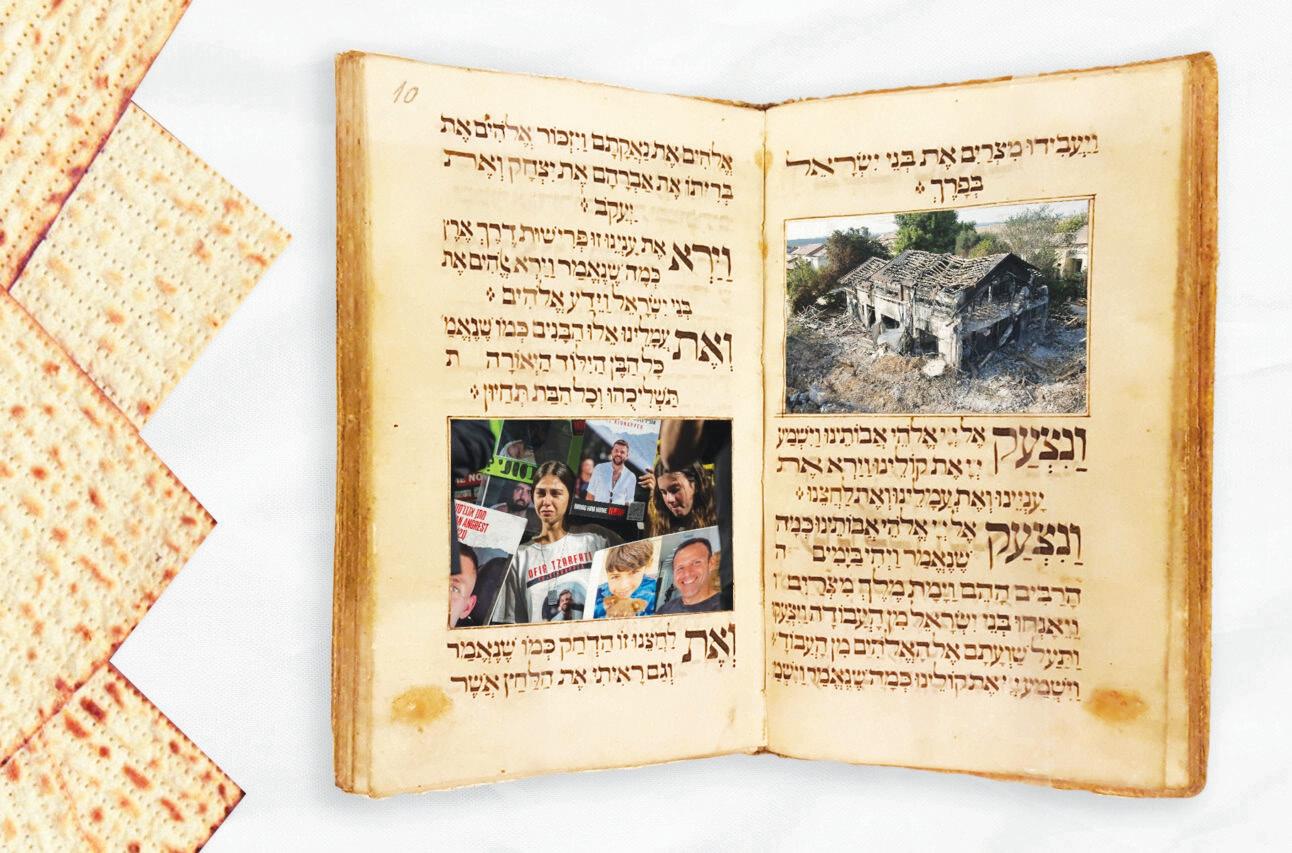
The result of their work will be a supplement for Israeli families to use during their Seders at the beginning the first major holiday since Hamas attacked Israel on Oct. 7 — an assault that itself pierced the observance of a Jewish holiday, Simchat Torah.
'As long as people are trapped in Gaza, that's not enough. As long as our soldiers are still risking their lives, it's not enough.'
We can’t say ‘Dayenu.’ It can’t be, you know, ‘Praise God for this situation.’
So we have to find new texts.”
It’s a mission that has long animated Herskovitz, who used the financial reward from a legal settlement after his then teenaged son was injured in a terrorist attack in 2001 to create
The Oct. 7 attack reportedly had originally been planned for the first night of Passover last year.
Many Seder tables will have empty seats representing Oct. 7 victims, hostages, and soldiers who are unable to return home for the holiday. But the seminary sought to provide rabbis and their communities with other ways to adapt the ancient tradition to the current moment.
“The Passover holiday is really one in which families cele-
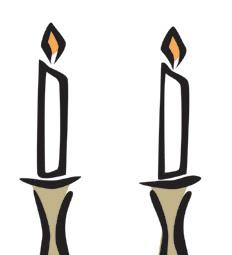
Shabbat, April 5: 7:47 p.m.
Shabbat, April 12: 7:54 p.m.
Shabbat, April 19: 8:01 p.m.
Erev Pesach, April 22: 8:04 p.m.
1st Eve Pesach, April 23: 9:06 p.m.
Shabbat, April 26: 8:08 p.m.
7th Eve Pesach, April 28: 8:10 p.m.
8th Eve Pesach, April 29: 9:13 p.m.
Pesach
Passover
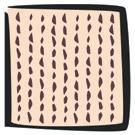
April 23-30 • 15-22 Nisan Eight-day festival celebrating the Exodus of the Israelites from Egypt. Leavened bread products are not eaten.
Torah Portions
April 6: Shemini (Lev. 9:1-11:47; Ex. 12:1-20)

April 13: Tazria (Lev. 12:1-13:59)
April 20: Metzora (Lev. 14:1-15:33)
brate on their own,” said Rabbi Arie Hasit, Schechter’s associate dean. “It will be the job of rabbis and community leaders to frame Purim, because the ritual aspects of it are largely going to happen in the synagogue, or in the Jewish community. But Passover is going to happen in the home. So our job right now, which is so significant, is to help people navigate how to prepare.”
Among the supplement’s passages is an addition to the seminal Four Questions recited during the Seder, which ask, “Why is this night different from all other nights?”
The added text aims to reflect the feelings of Seder attendees this year.
whole again is very hard, and our own tears will mix with the maror,” Creditor said, using the Hebrew word for the Seder plate’s bitter herbs. “We won’t need the Haggadah’s usual explanation of what bitterness feels like.”
Creditor said AJR’s CEO and academic dean, Ora Horn Prouser, approached him with the idea of creating a Passover supplement about the ongoing Israel-Hamas war.
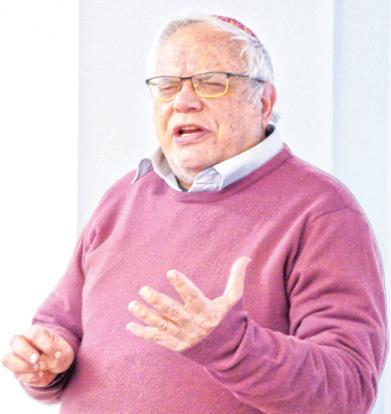
“On all other nights, we think that we have answers. Tonight, we all just stay silent,” says the passage, which is in Hebrew. “On all other nights, we remember, sing and cry...On this night, we only cry.”
The initiative is one of several underway to adapt the Passover holiday for a different crisis in the Jewish story.
Rabbi Menachem Creditor, the scholar-in-residence at UJA-Federation of New York, is working on a Haggadah supplement with the Academy of Jewish Religion, a pluralistic rabbinic school in Yonkers, N.Y.
“To talk about liberation when our family is not yet
They put out a call for submissions — prayers, essays, artwork and other reflections — and received dozens of responses that will be edited into a resource AJR will selfpublish and sell on Amazon.
Parts of the final product will also be available for free on the seminary’s website.
“This is a supplement that very directly addresses our current time and provides a community of thinking that we can bring into our Seders,” Horn Prouser said.
In addition to Dayenu, Creditor and Horn Prouser pointed to one particular piece of the Passover text with new resonance this year: Vehi Sheamda, the prayer that warns that in every generation, a new enemy will attempt to defeat the Jewish people. This year’s crisis conjures new ideas about both the enemy and how to vanquish
it, Creditor said.
“The language in the Seder, in the Haggadah, is that God will save us,” Creditor said. “But Zionism represents a very different religious posture, which is: We will save us.
“Unfortunately, the first part of the paragraph remains true and was amplified horribly on Oct. 7,” Creditor continued. “The second half of it must be true through the connection that we have, as a Jewish people throughout the world, strengthening our homeland.”
The Passover initiatives in both Israel and the United States add to a long tradition of Haggadah iterations and supplements that layer present-day issues onto the ancient text, from those centered around Soviet Jewry to more recent examples like additions about the Ukraine war and the pandemic.
Journal reporter who remains jailed in Russia.
“The Haggadah is something that developed, and as modern Jews who are dealing with issues of the same themes that have come up again and again in our history, we need to figure out how to make those themes accessible, relevant, real and useful,” said Rabbi Sara Cohen, a Schechter alumna who helped plan the seminary’s conference in Israel.
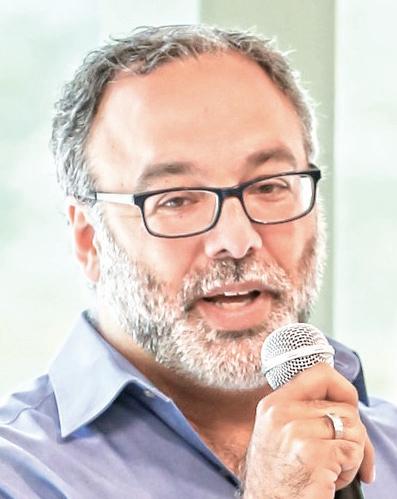
Rabbi Menachem Creditor
Cohen, who lives on Kibbutz Ketura near the southern port city of Eilat, where the population swelled with war evacuees, said the text offers an important opportunity for the kind of emotional reckoning that is desperately needed in a battered Israel and Jewish world.
trauma and redemption, one of the questions is, ‘What is redemption in our day, and are we feeling redeemed, are we feeling free?’’’ Cohen said.
“When you’re brought face to face with the holiday that brings up these issues, hopefully we won’t just pass them by but we’ll think about how it’s relevant in our lives today.”
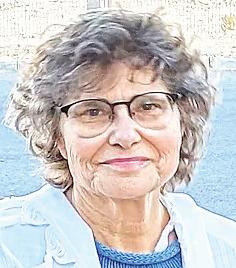
Rabbi Sara Cohen
She added, “We have to pay attention to the desire to process the trauma and the framework that our tradition gives us for processing it.”
Last year, some families left an empty seat at their Seder table in honor of Evan Gershkovich, the Jewish Wall Street
“We don’t necessarily think of holidays as a time for processing trauma, but because Passover is the first major holiday since (Oct. 7) and because it’s a holiday that the story of which talks about national
Cohen wrote the additions to the Four Questions that are included in the Schechter supplement. Other supplement passages invoke more explicit war imagery and the sense of bereavement felt by many across Israel.
Herskovitz’s entry is an interpretation of the core Passover text suggesting that each Jew see themselves as though they personally left Egypt.
'We have to pay attention to the desire to process the trauma and the framework that our tradition gives us for processing it.'
Hasit acknowledged that beginning the project in early February was a double-edged sword. On the one hand, it provided Schechter with plenty of time to collect responses and work with Herskovitz to put together a Passover resource ahead of the holiday, which this year begins on the evening of April 22. On the other hand, the war is evolving daily, and nobody knows what the status of the conflict, or the hostages, will be by late April. But Hasit said no matter what happens, the trauma of Oct. 7 will need to be ad-
dressed at the Seder table.
“We know that (Passover’s) coming, and we know that it’s going to be different,” he said. “We know that it’s going to include processing everything that has happened since Oct. 7. And no matter what happens tomorrow, and the day after that, none of that is going to change.”
Horn Prouser shared a similar sentiment. “Even if our prayers are all answered, our community is feeling trauma,” she said. “The issues to discuss, we still need time to process them.”
Herskovitz said he views the Passover effort as a cognate of his Holocaust remembrance work, in which he emphasizes the importance of creating fresh, personal materials that people can connect with.
“I think the same exact thing is what has to be done in Pesach this year,” he said, using the Hebrew word for Passover. “You cannot use the same text and the same ideas that you used for years and years because this year is so radically different. And to go back to the old text, the old ideas, is basically making it irrelevant.”
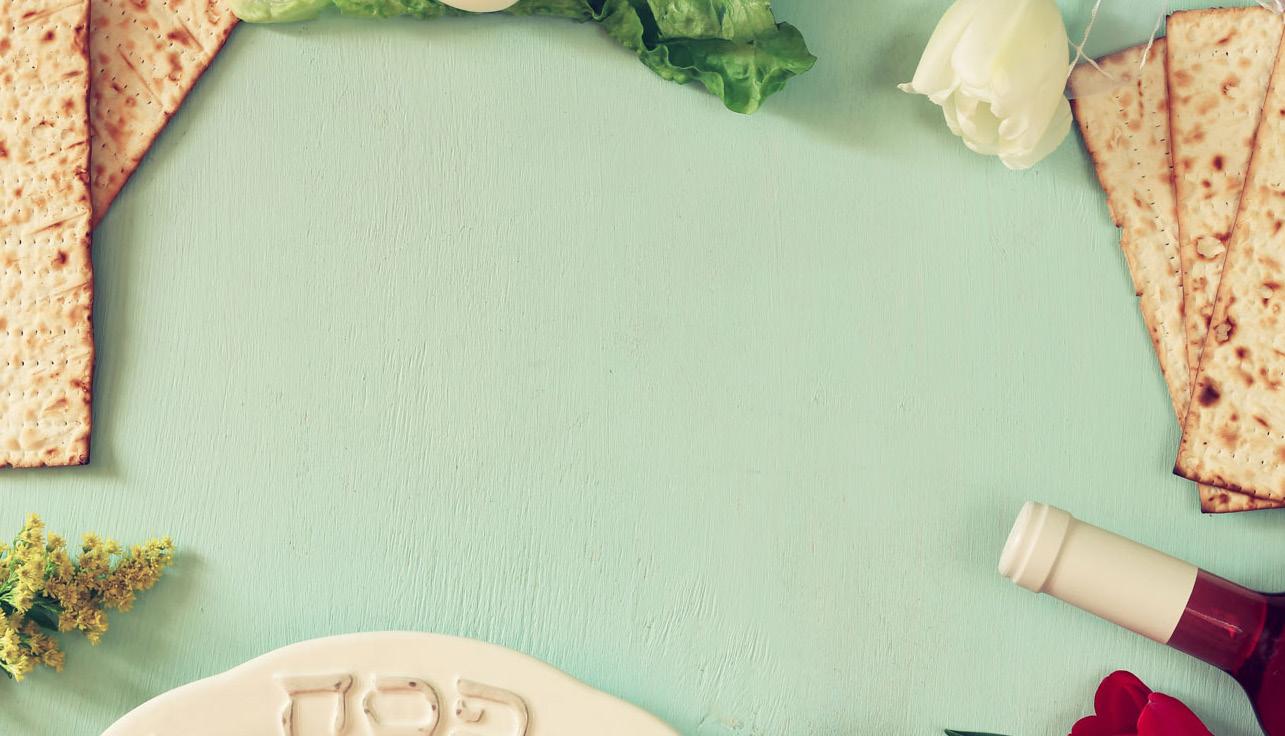
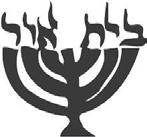
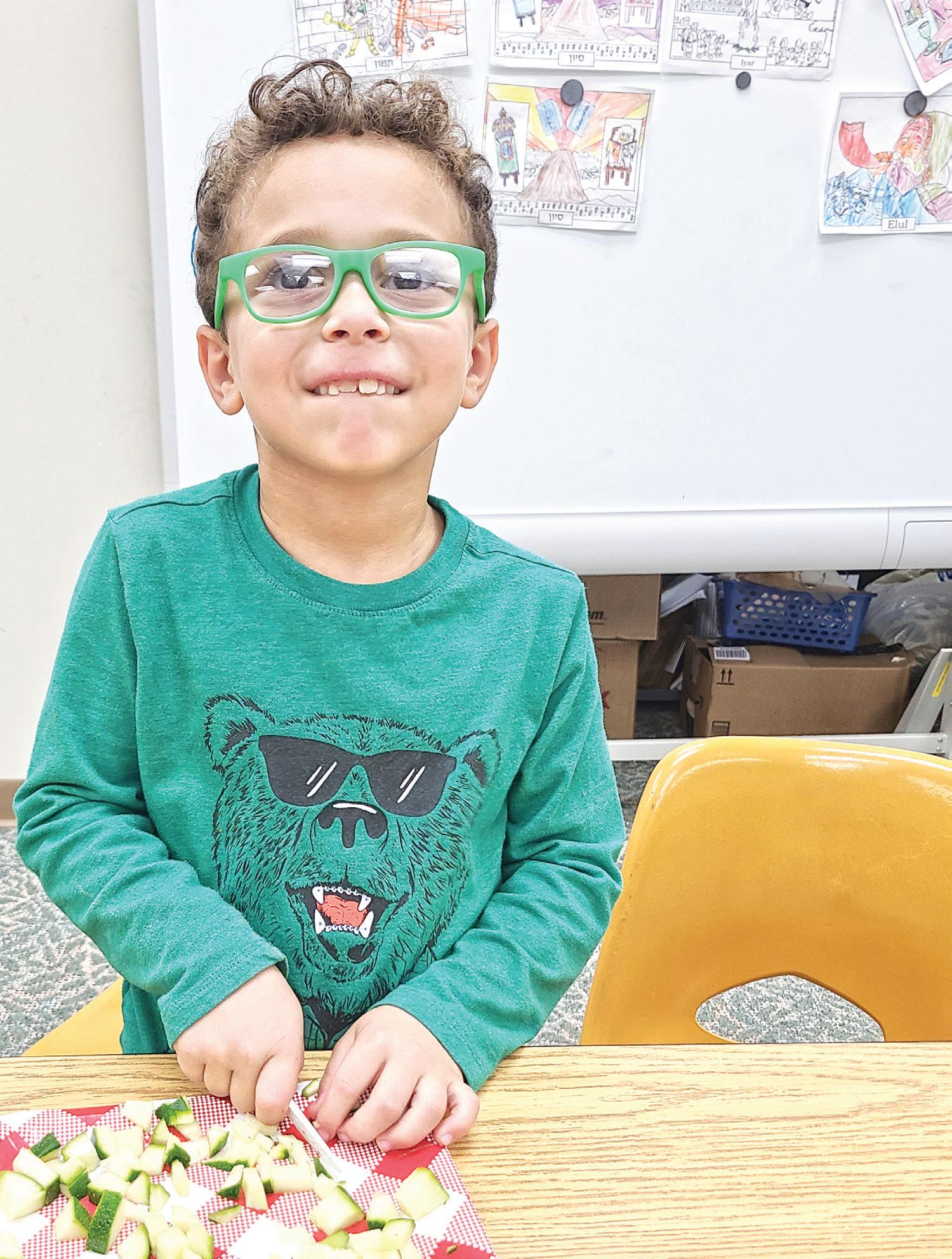
Your child's path to excellence and leadership starts at Hillel Academy of Greater Dayton.
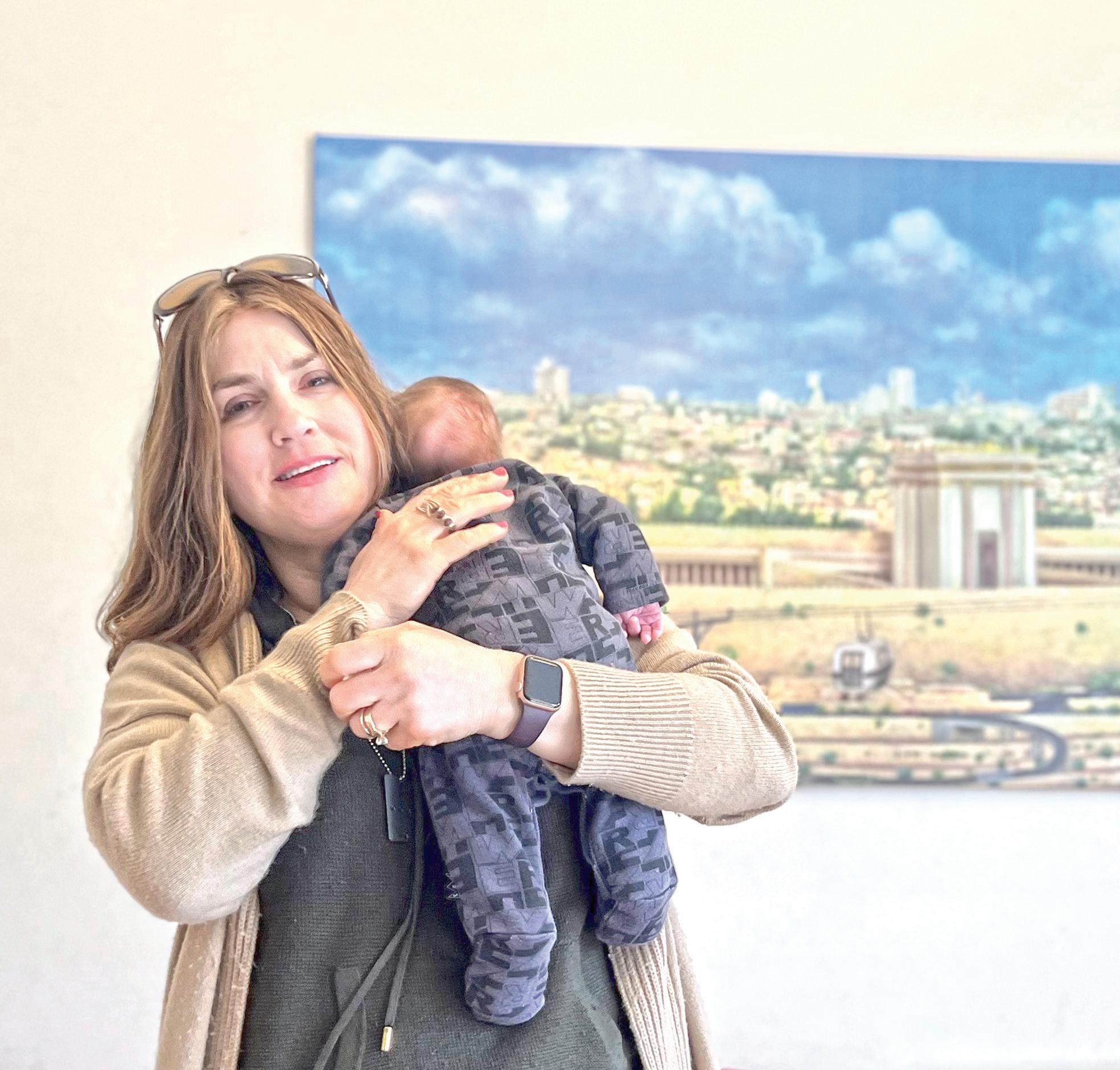
Your pain is my pain, your happiness is my happiness.
 By Devorah Mangel Chabad of Greater Dayton
By Devorah Mangel Chabad of Greater Dayton
The shocking news of Oct. 7 reverberated not only within me, but also across the global Jewish community. In response, I immediately turned to the teachings of the Rebbe when he offered solace and guidance in the aftermath of the Yom Kippur war. My focus shifted toward increasing spiritual pursuits, acts of goodness and kindness, and tzedakah.
At our Chabad, I introduced Torah learning sessions for women and organized Hafrashat (separating) Challah evenings. These efforts aimed to pray for the release of hostages and the safety of our soldiers, mirroring the practices in Israel among families facing similar challenges.
Despite these actions, a lingering feeling of dissatisfaction fueled a desire to do more than merely talk the talk; I wanted to walk the walk. The ethical lesson from our fathers resonated deeply: "Speak a little and do a lot."
This prompted me to reach out to Chabad colleagues in Israel, inquiring about areas where help was most needed. I felt a personal calling, compelling me to share warmth and love with those less fortunate, particularly displaced children and mothers navigating trauma.
In the Hebrew month of Adar, the heroic tale of Queen Esther serves as a timeless reminder of individual responsibility in times of crisis. Mordechai's guidance to Esther, "Possibly for this
reason you were destined to be chosen as queen," holds a deeper lesson for each of us. Reading Esther's story on Purim transcends its being a mere recounting of historical events; it becomes an opportunity to reflect on the miracle and internalize the lesson she passed on.
Recognizing the diversity of talents among us – singing, musical, artistic, and emotional – I embraced the notion of sharing these gifts with others. Just as Queen Esther risked her life to save her people, we too should leverage our resources, both physical and spiritual, to help those in need.
Assisted by friends Renana and Asaf Harel, my hosts in Mevaseret Zion, I connected with the Sword of Iron Facebook group and various WhatsApp chats. This sense of belonging to a larger family — all driven by the common purpose of sharing talents and time with those in need — was heartwarming.
Volunteering at Chabad of Talbiya, I inquired about the needs of evacuees and was tasked with bringing outerwear. Thanks to the support of the Chabad Women’s Circle, we packed nearly two suitcases with outerwear of all kinds. Volunteering at Chabad's boutique in Talbiya, which provides clothing, shoes, toiletries, and household items to evacuees, offered me a chance to connect with those who endure unknown challenges.
From heartfelt conversations with those in need, I learned the therapeutic impact of a smile and a hug. One woman, whose husband had recently undergone back surgery and was grappling with PTSD, remarked, "I really needed this hug."
Volunteering at hotels and spending time with evacuees' children reinforced the joy and support they felt knowing volunteers, even from abroad, were dedicating time to create positive experiences for them.
Guided by the wisdom of my father-in-law, Rabbi Nissen Mangel, a Holocaust survivor, I focused on the miracles and Hashem's kindness amid atrocities. The strength of Am Yisrael, the People of Israel, even in challenging times, became evident. Despite grieving the loss of loved ones, Israelis, like a mother who lost her son in battle in Gaza, expressed pride and unwavering support for their country.
Evacuees, despite facing challenges, openly shared their gratitude for being alive and having homes. Some even extended their positivity to help those less fortunate. I encountered evacuees who volunteered in any capacity they could, exemplifying the strength of the Israeli spirit.
piness is my happiness.
Reflecting on the Purim story, where unity was pivotal for salvation, and the recent Torah portions emphasizing shared talents in constructing the Tabernacle, the importance of coming together in unison became apparent. Collective action creates a beautiful dwelling place for God to bless us all.
Post-Oct. 7, an increased awareness of God and spirituality has emerged. Understanding the source of strength and blessings heightened an appreciation for the beauty of Am Yisrael, allowing us to empathize with the suffering, pain, and joy of fellow Jews, even those distant from us.
'Collective action creates a beautiful dwelling place for God to bless us all.'
Participating in events such as a barbecue for soldiers and preparing lentil soup for them allowed me to witness the collective effort to boost morale and provide comfort.
The sentiment expressed by soldiers, appreciating the care and support from volunteers, was a testament to the impact of solidarity.
Throughout my two-week visit, the resounding message of unity and shared responsibility underscored that we are one extended family — brothers and sisters standing stronger when united. This unity transcends political differences, reinforcing the notion that your pain is my pain, and your hap-
Our sages' teachings on the three characteristics of a Jew — being merciful, self-effacing, and doing acts of goodness and kindness — resonate as part of our DNA. The Baal Shem Tov's teaching that a soul descends to earth to do a favor for another highlights our inherent compassion and the interconnectedness of the Jewish community.
Observing the intense love among Jews, even those unknown to each other, underscored the strength of Am Yisrael. Our collective strength and victory lie in being one nation with one heart.
In the merit of all the kindness, may we be worthy of the coming of Moshiach (messiah) and the swift rebuilding of our Holy Temple – our third one –in Jerusalem.
Devorah Mangel is women's program director of Chabad of Greater Dayton.
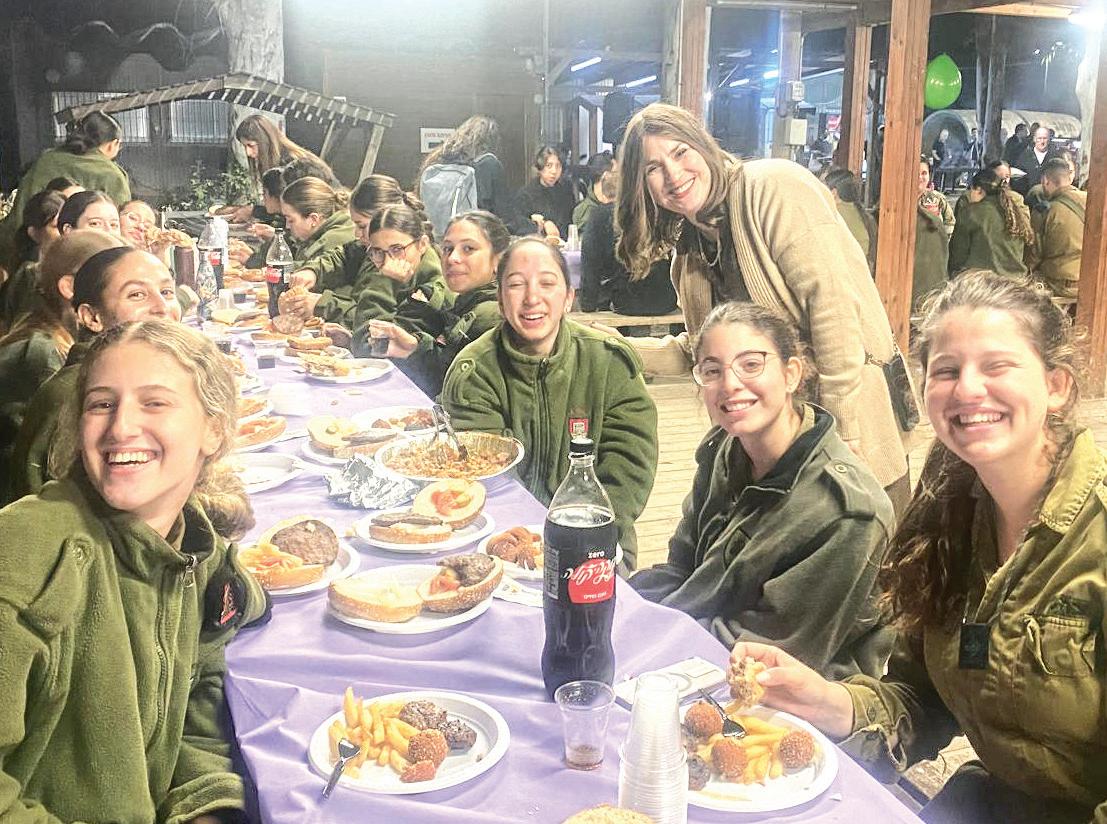







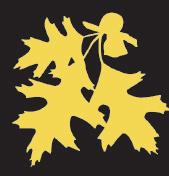


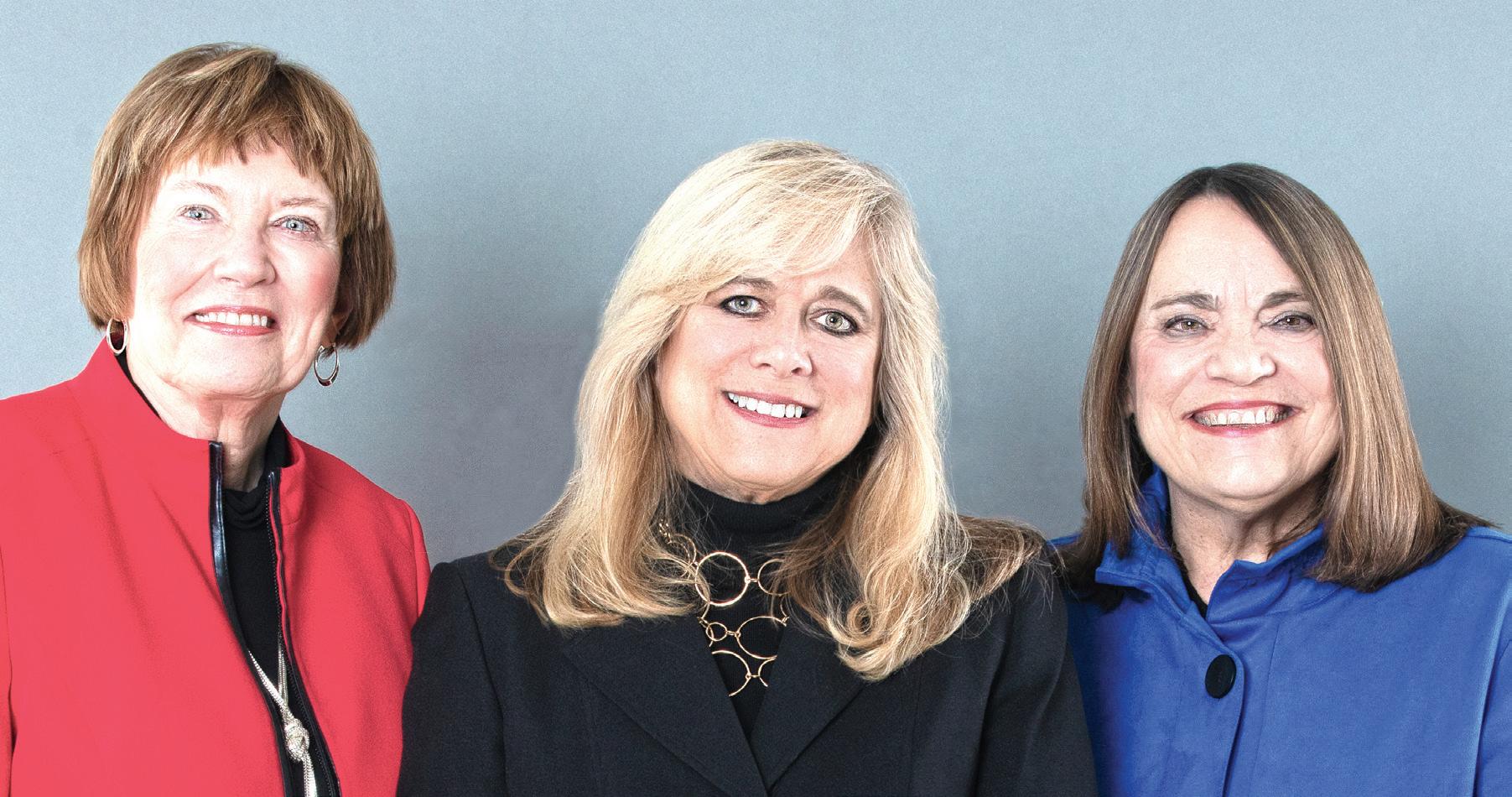
Wishing all of Dayton Happy Passover

Cantor Andrea Raizen
Happy Passover
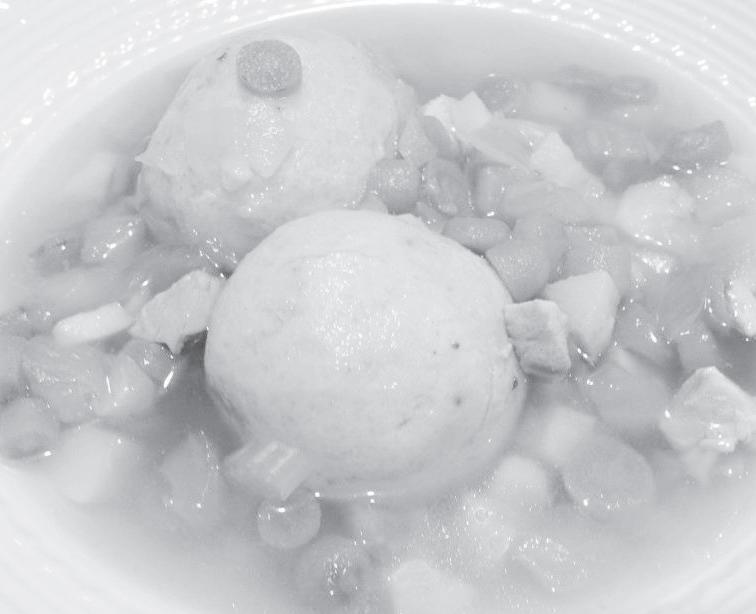
Jeffrey Abrahams
Best wishes to all for a Happy Passover
Dena Briskin
Best wishes to all for a Happy Passover
Don & Sue Zulanch
We wish the Dayton Jewish community a very happy Passover
Tom & Katherine Cruse
Best wishes to all for a Happy Passover
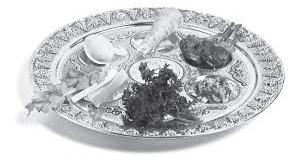 Bonnie Mendelson & Family
Bonnie Mendelson & Family
Our warmest wishes for a joyous Passover
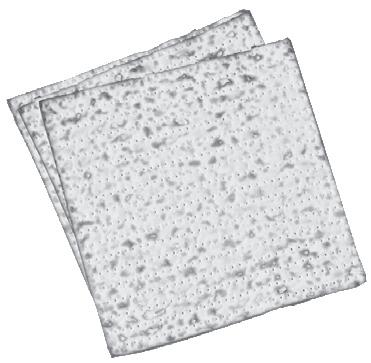
The Weiss Family
For nearly six months, the date of Oct. 7 has instantly evoked images of horror in the minds of Israelis as the bloodiest day in the country’s history and the deadliest for Jews since the Holocaust.
But when Israel’s governing coalition convened March 17 to set an annual memorial day to commemorate the tragedy, it didn’t choose Oct. 7, or any date on the Gregorian calendar. Instead, the government unanimously approved a yearly memorial day on the Hebrew calendar: the 24th of Tishri, which falls this year on Oct. 26, and next year on Oct. 16.
It isn’t unusual for Israel to establish a day of mourning on
the Hebrew calendar. All the country’s holidays are marked on Hebrew dates, including its back-to-back Memorial and Independence days, marked between April and mid-May, depending on the year.
The Oct. 7 attack presented another complication because it occurred on a Jewish holiday, Shemini Atzeret-Simchat Torah, which falls on 22 Tishri, and meant the annual commemoration had to be held on a different date. The following day, 23 Tishri, presumably didn’t work because it is still a Jewish holiday outside of Israel. The chosen date, 24 Tishri, is the day after that.
But the choice still raises eyebrows. That’s especially true
Wishing you a delicious Passover.


because the same Israeli government that made this decision has done so much to impress the date of Oct. 7 onto the international public consciousness. The vast majority of the world lives according to the Gregorian calendar, not the Hebrew one — including, largely, non-Jews in Israel, who were also affected by the attack. Talking points from an Israeli government official about an “attack on 22 Tishri” would mean little to most people.
One of the most prominent public faces of Israel, Eylon Levy, describes himself on social media as “Israeli Government Spokesman in the Oct. 7 War.” And in his March 17 speech to his cabinet, Israeli Prime Minister Benjamin Netanyahu said, addressing the international community, “Did you so quickly forget Oct. 7?”
Israeli society also operates largely according to the Gregorian calendar, and there are a few days that Israelis mark on that calendar as well. One, Nov. 29, is the date in 1947 when the United Nations voted to partition Palestine into Jewish and Arab states, paving the way for Israel’s establishment. More recently, the Nov. 4, 1995 assassination of Yitzhak Rabin has been popularly commemorated
close to that date, even though the government designated a Hebrew date to memorialize that tragedy as well.
The same thing may end up happening with Oct. 7. But choosing Oct. 7 as the annual commemoration would have come with its own problems — not least that early October often falls smack in the middle of the Jewish holiday season. In 2025, for example, Oct. 7 will be the first day of the festival of Sukkot, which is known in Jewish liturgy as “the time of our happiness.”
For some Israelis, that isn’t reason enough for opting for 24 Tishri. Ofer Aderet, a journalist for the left-wing Haaretz newspaper, wrote on X, “It was a mistake to set a memorial day on a Hebrew date that means nothing to most citizens. Oct. 7 has already become a concept. 24 Tishri has not.”
The Israeli government has acknowledged the significance Oct. 7 has gained in the minds of Israelis. The announcement of the annual commemoration adds that this year and this year only, there will also be an official state ceremony on Oct. 7 itself, as that date “has been etched in the consciousness of people in Israel and around the world.”




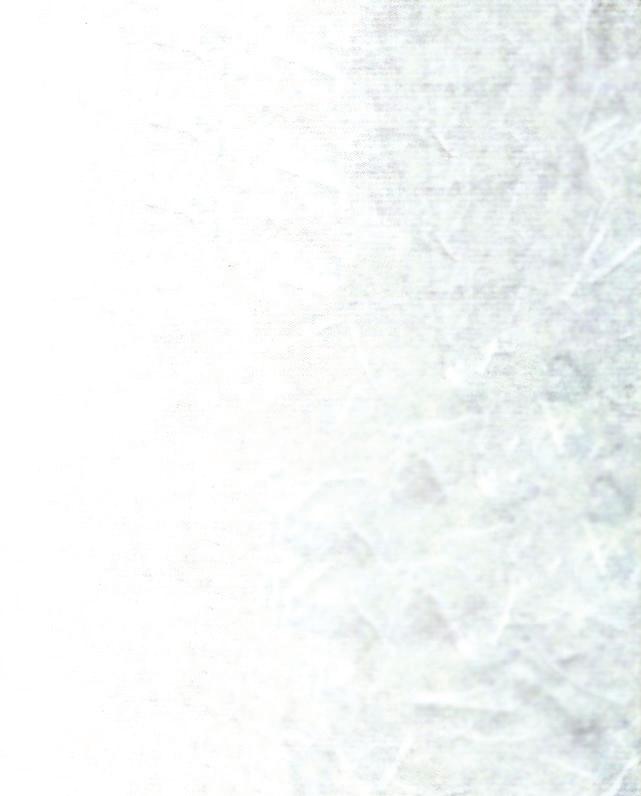
A sweet and joyous Passover

Andrea Scher Rabiner & Family
Our warmest wishes for a joyous Passover
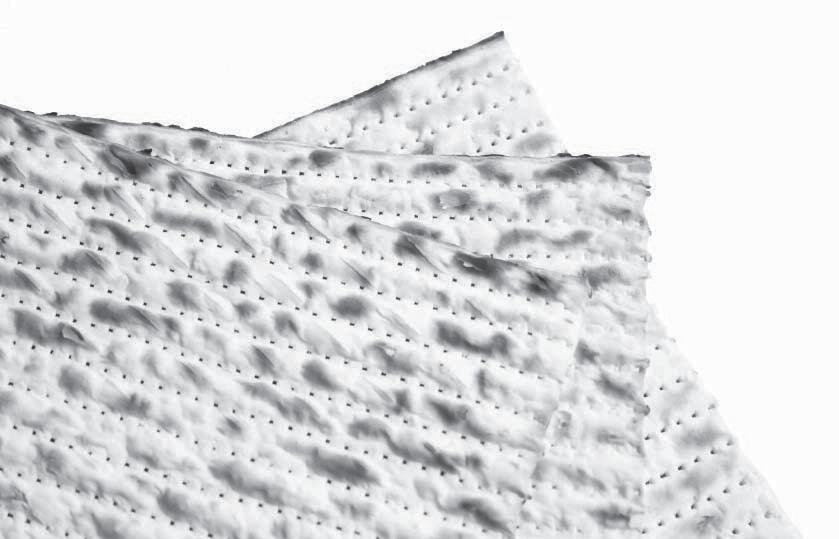
Steve, Shara, Rachel & Natalie Taylor
A sweet and joyous Passover
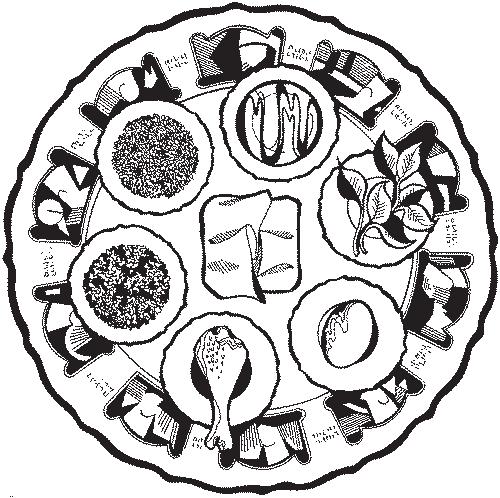
The Levinson Family
Best wishes to all for a Happy Passover
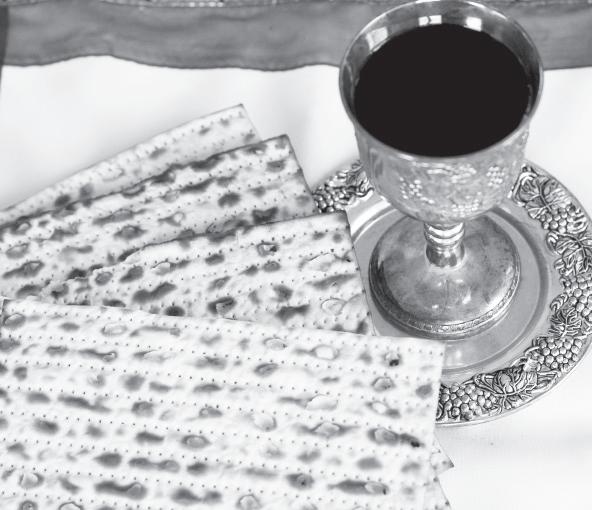
Brenda Rinzler
Warm Passover greetings from

Marni Flagel & Family
Wishing all of Dayton a Happy Passover
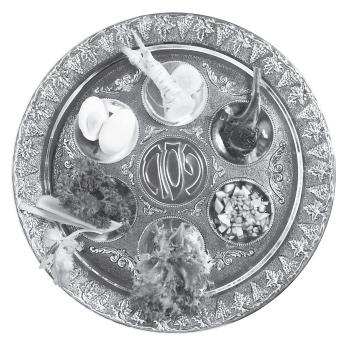
Joan Knoll
Warm Passover greetings from

Eleanor Must
Wishing all of Dayton a Happy Passover
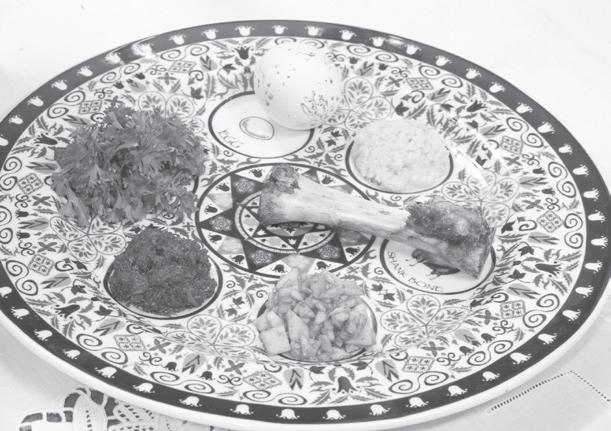
Judge Susan Dlott
Best wishes to all for a Happy Passover

Robert & Vicky L. Heuman
Warm Passover greetings from

Susie & Eddie Katz & Lois Unger
Our warmest wishes for a joyous Passover
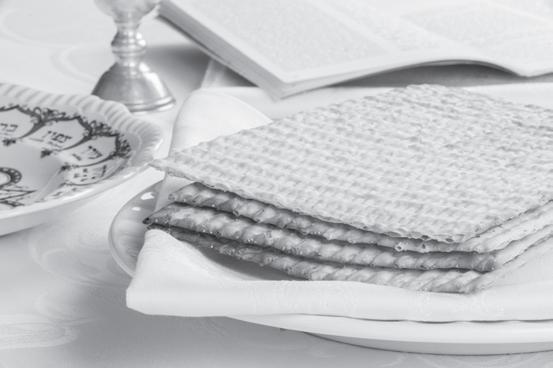
Cantor Jerome & Goldye Kopmar
Our warmest wishes for a joyous Passover

Adam & Tara Feiner
Our warmest wishes for a joyous Passover
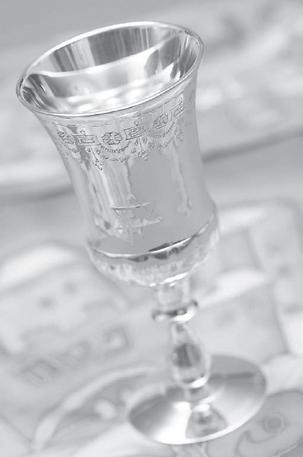
The Gruenberg Family
Our warmest wishes for a joyous Passover
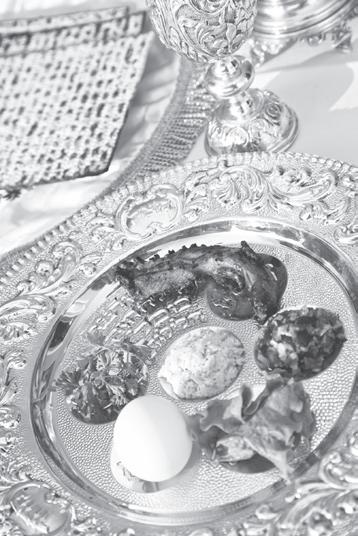
The Wagenfeld Family
Best wishes to all for a Happy Passover

Cory & Sharon Lemmon
Best wishes to all for a Happy Passover
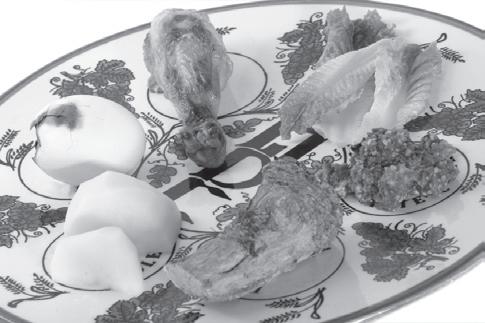
Julie, Adam, Noah, Zoe & Oscar Waldman
Warm Passover greetings from

Art & Joan Greenfield


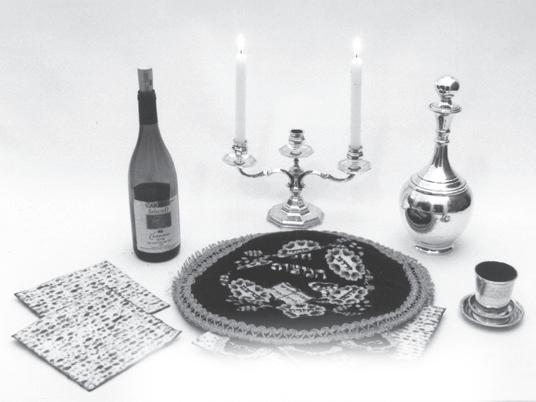
Kim & Shelley Goldenberg & Family
A sweet and joyous Passover
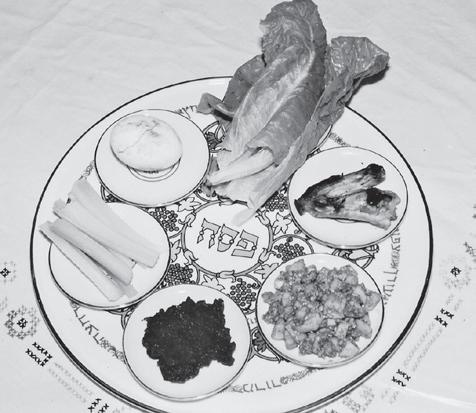
Marvin & Susan Mason
Our warmest wishes for a joyous Passover
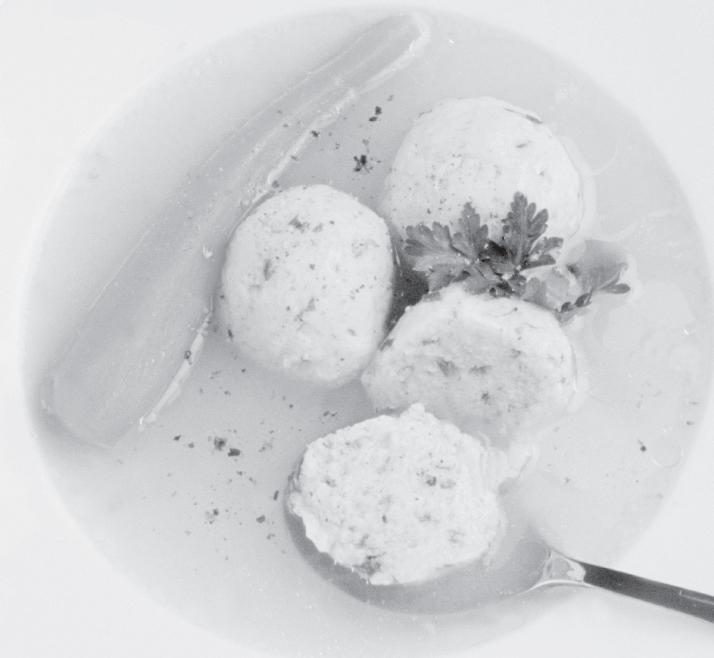
Suzi, Jeff, Amanda, Joshua, Anna, Teddy & Etta Mikutis



Before my mother-in-law Ruth Levy introduced me to Passover Popovers, the eight-day holiday seemed to stretch for months. Nothing can cover up matzah’s cardboardlike flavor. And how much matzah can one Jew eat?
Ruth’s answer was popovers. Many years ago, Naomi and I were visiting Ruth in Brookline, Mass. during the holiday and planned to make a picnic. I envisioned my usual Passover picnic — tuna salad
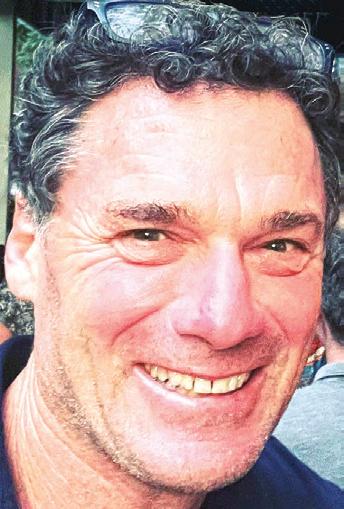 Rob Eshman
Rob Eshman
between crumbled shards of matzah. But Ruth mixed matzah meal into a boiling mixture of oil and water, then beat in eggs, and after a few minutes in the oven, she pulled out popovers.
Popovers are Passover pita. They puff up, which shouldn’t be a shock since the technique to make them is the same as for making cream puffs or eclairs.


Unlike matzah, they hold sandwich ingredients together: lox and cream cheese, a poached egg and avocado, tuna salad. Warm from the oven, they make a nice dinner roll. Or make a double batch, freeze them, and have some until the very end of the holiday.
The only addition I’ve made to Ruth’s recipe is to process the matzah meal a bit in a food processor to make it finer (you can also use matzah meal cake flour) and I add some turmeric, which deepens their color.
2 cups water
1 cup oil
1 Tbsp. sugar
1 tsp. salt
2 cups matzah meal
1 tsp. turmeric
7 large eggs
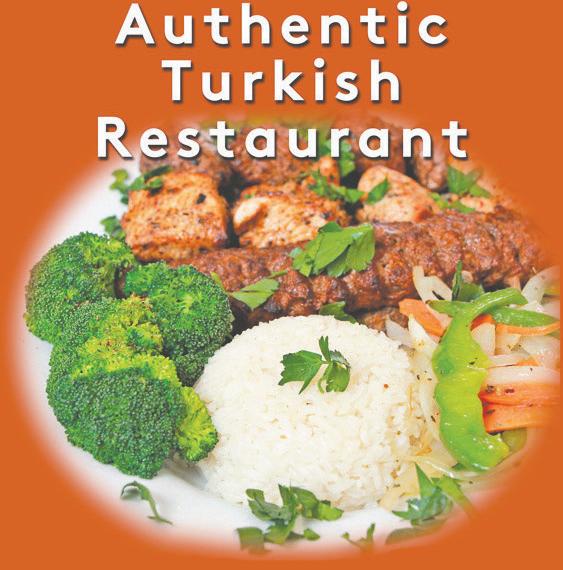
Preheat the oven to 400 degrees. Grease a 12- to 16-cup muffin tin. In a medium sauce-
pan, combine water, oil, sugar, salt, and turmeric. Bring to a rolling boil.
Add matzah meal all at once. Turn off heat and beat well with a spoon or whisk. Beat until the mixture comes away from the sides as you stir. If the mixture looks too soupy, turn on the heat to medium and stir to evaporate some liquid.
Remove from heat and let cool for about 10 to 15 minutes. Beat in one egg at a time, making sure each egg is incorporated until you add the next.
When all the eggs are incorporated, spoon into muffin tins. Each should be about threequarters full. Don’t worry if some are near the top.
Bake for 10 minutes. Reduce heat to 325 degrees and bake for 30 minutes. Turn off the oven and leave for another 10 minutes undisturbed. Remove and unmold.
Rob Eshman is a senior columnist for the Forward.



Forward
You really just need one dependable matzah ball soup recipe in your life, and this is it. Tried, true, trusty — and really, really good. Is the broth golden-hued and clear, but rich in chicken-y flavor? Check. Can you taste the fresh carrots, celery and onion? Check. Does spring, in the form of fresh bright dill, brighten and sharpen the flavor? Yep. Are the balls both light and substantial, embodying the idea of paradox that is at the center of so much of Jewish life and thought? Of course.
Making the soup involves one extra step — broiling or searing the chicken to achieve an extra depth of flavor. That will add 10 to 20 minutes of joy to your day — because cooking chicken soup for family, friends, or just yourself is always a joy.
Rob’s Go-To Chicken Soup
1 whole 4-lb. chicken cut into 8 pieces, or 4 lbs. chicken wings, backs, necks, and/ or legs
3 carrots, 1 peeled, cut 1/2 inch coins
2 stalks celery, chopped
2 parsnips, 1 peeled, sliced in 1/2 inch coins
2 medium onions, cut into quarters
4 cloves garlic, smashed
3 fresh or 2 dried bay leaves
1 small bunch parsley
1 bunch dill
1 Tbsp. salt 1/2 tsp. pepper
This is a completely optional step but I do think it makes better soup: Brown the chicken. Preheat broiler. Lay chicken pieces out skin side up on a large pan and place under broiler. Broil until they begin to turn brown. Alternatively, heat a bit of oil in a large skillet or the bottom of a heavy stockpot and sear the pieces on both sides. You’re not cooking them; you’re just coloring the skin to deepen the flavor.
Place the chicken pieces into a large stock pot. Pour in any of the juices from the broiling pan. Add two carrots, a parsnip, celery, onions, garlic, bay leaves, parsley, pepper and salt. And add enough water to cover by about 1 inch.
Over medium high heat, bring the soup to a boil, then reduce the heat and simmer the soup gently for about two hours. During this time use a slotted spoon to skim foam off the surface.
This would be a good time
Everyone needs a go-to matzah ball soup recipe Rob

to make your matzah balls. See the recipe below.
Remove the soup from the heat and strain through a mesh strainer. Reserve the solids for another use.
Return the soup to the clean pot. Add remaining one carrot and one parsnip slices. Simmer until soft, about 20 minutes. Before serving, add the matzah balls and chopped fresh dill. Serves eight to 10.
Notes: Fresh bay leaves are really better. You can make the soup a few days ahead and freeze. It really is better to make it at least one day ahead, let it cool completely, then refrigerate. The next day, remove the layer of fat at the top with a slotted spoon. Use this chicken fat to roast potatoes, or even eat it on a slice of toast. Don’t throw it away!
You can heat the matzah balls in the soup and leave them there, keeping the soup warm for hours...But do not boil. Add the dill just before serving.
If you want to go through an additional, optional step, after you boil the chicken, you can broil the vegetables for the soup.
Toss them with a little oil and put them under the broiler until they just begin to toast. This adds another layer of flavor— but it is completely optional.
The quickest way to make this soup is in an Instant Pot. I add all the ingredients and cover with water, seal and cook on the soup setting for about 45 minutes, then proceed with recipe.
Rob’s Go-To Matzah Balls
4 eggs
1/4 cup schmaltz (chicken fat) or vegetable oil
1/4 cup chicken stock or water or seltzer
1 cup matzah meal
1 tsp. salt
1/4 cup chopped fresh dill and parsley
1/4-1/2 tsp. ground white pepper
In a large bowl, mix all the ingredients. Do not over-beat. Cover with plastic wrap and refrigerate until well chilled –two hours or more.
Bring a large pot of wellsalted water to a boil. Wet your hands.
Take a lump the size of a large walnut and using your palms, form into a round shape. Drop into the water, reduce heat to a simmer and cover. Cook for about 40 minutes.
Remove the balls with a slotted spoon. Taste one to make sure they’re cooked through –they probably will be.
Serve in hot soup, sprinkled with fresh parsley and dill. Makes about 20 balls.
Note: After the balls are cooked in water, let them rest in the soup. If you're chilling your soup in the refrigerator or freezer, leave them in.
If you are reheating soup, leave them in. If your soup is simmering on the stove, leave them in.



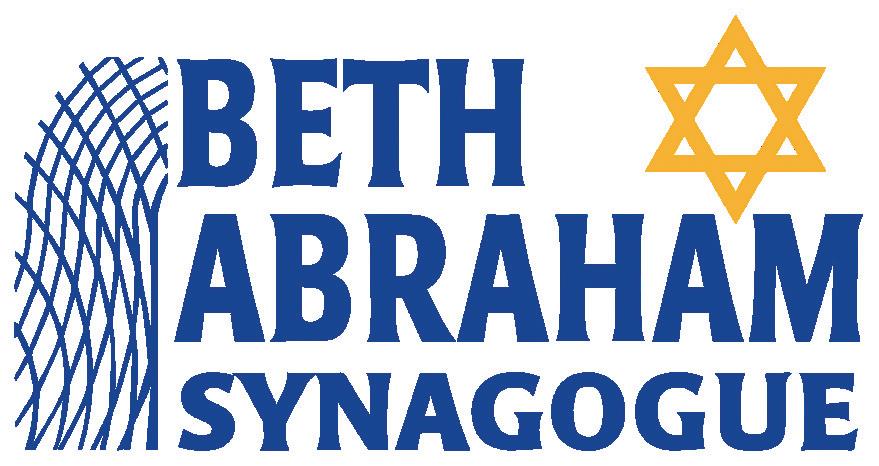
Beth Abraham, Dayton’s only Conservative synagogue, is enthusiastically egalitarian and is affiliated with the United Synagogue of Conservative Judaism.
For a complete schedule of our programs, go to bethabrahamdayton.org.

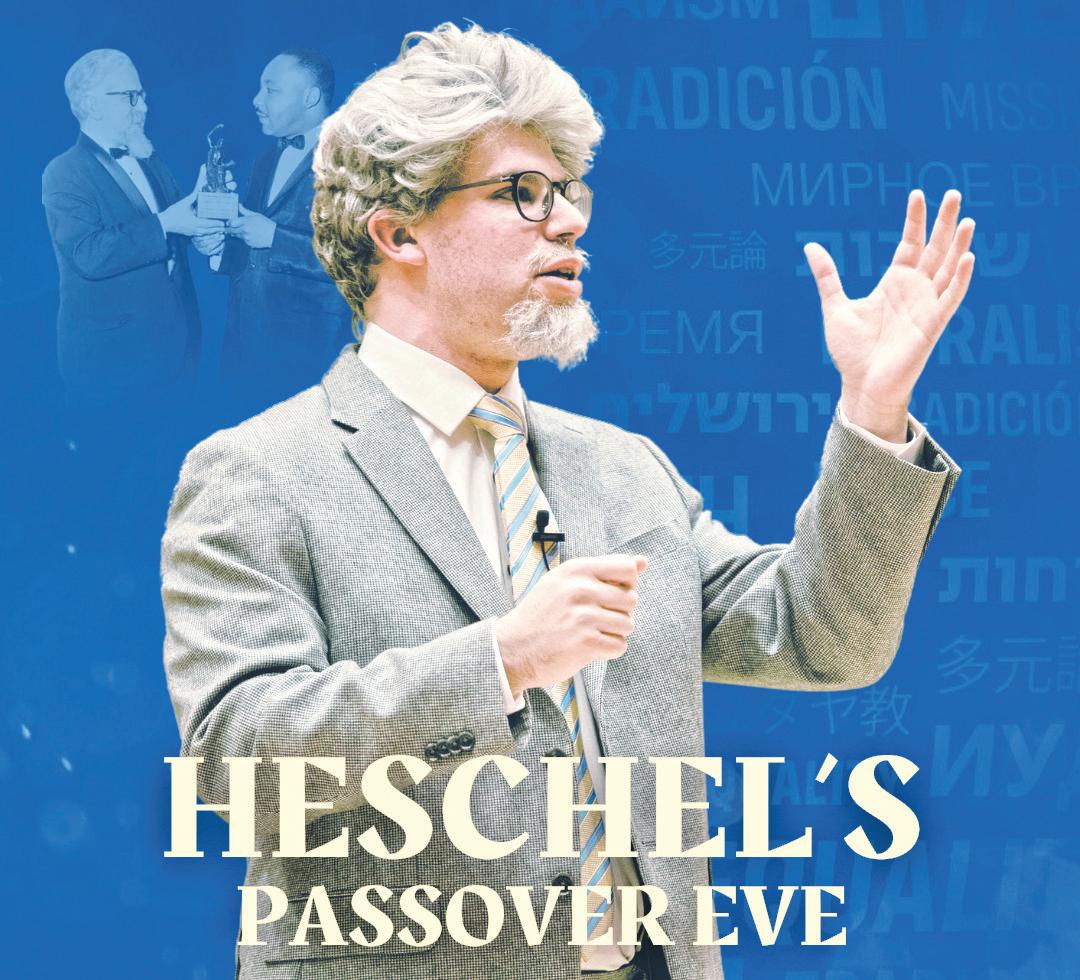
A THEATRICAL JOURNEY THROUGH THE REMARKABLE LIFE OF RABBI ABRAHAM JOSHUA HESCHEL, STARRING ERIC BERGER.
Beth Abraham Synagogue
Talk-back following with Rav Aubrey Glazer & Pastor Ken Moss Free. Registration required at bethabrahamdayton.org
Generously sponsored by Jim Nathanson in honor of his beloved Carol, of blessed memory. Co-sponsored with Pastor Ken Moss & The Potter’s House.

Sunday, April 7, 6 p.m. $20. Featuring a celebrated docudrama about an Israeli Prime Minister during the Yom Kippur War. R.S.V.P. by April 1.
Monday, April 8, 12:30-4 p.m. $13. Starting with lunch indoors and a talk about the eclipse w. Dr. Jack Bernstein, then viewing outside. Viewing glasses included. Vegan options upon request. R.S.V.P. by April 1.
305 Sugar Camp Circle Dayton, Ohio 45409 937•293•9520 www.bethabrahamdayton.org
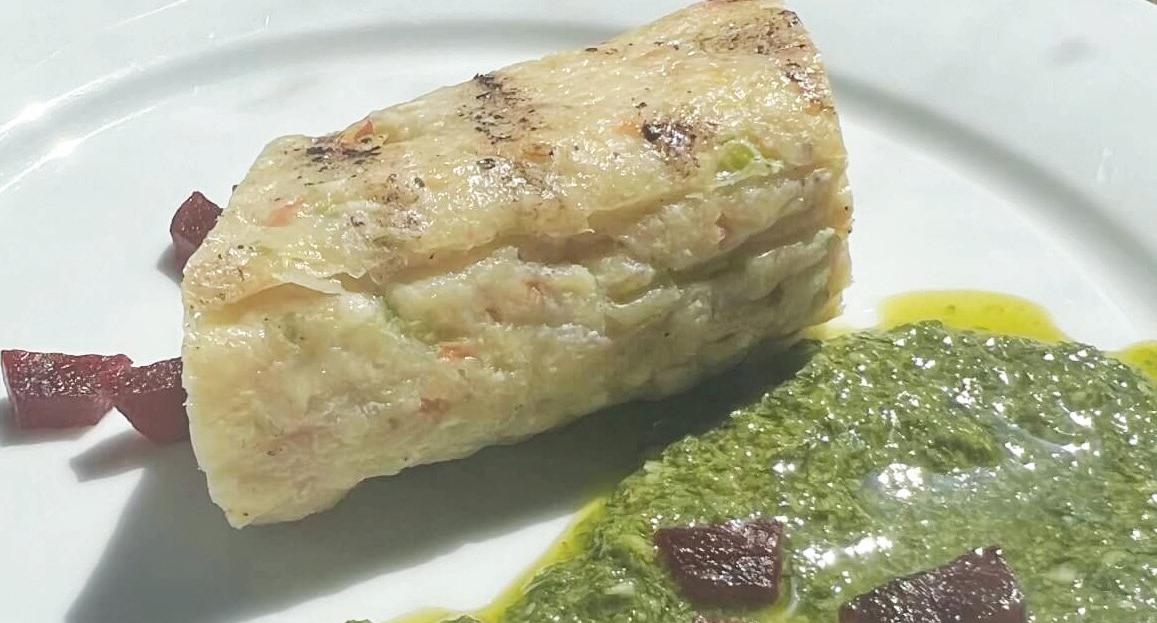 By Rob Eshman, The Forward
By Rob Eshman, The Forward
Here’s a Jewish paradox: Passover celebrates freedom, so why force people to eat gefilte fish? Some people like it, I understand. But for most dinner guests, especially those new to the sight of grayish pockmarked oblongs of mystery flesh sweating jellied fish globules, it’s at least confusing. If you are free to eat anything, why eat this?
The short answer is, of course, tradition. Ashkenazi gefilte fish, Sephardic fish cakes — which are a huge improvement in flavor and appearance — have been the taste of the holiday for centuries.
But Passover is also about change. The Passover liturgy tells us that “in every generation” we must tell the story anew, and so every generation has reconfigured it to suit the needs of the day.
The same goes for the food. The Torah’s original menu, in the Book of Exodus, Chapter 12, called upon each household to eat lamb, “roasted over the fire, with unleavened bread and with bitter herbs.” Nothing about gefilte fish. Not even macaroons.
Last year, in the run-up to Passover, the idea struck me: Why not treat ground fish like Persian koobideh, grilling the meat over a flame? In my case, I decided to forgo the actual skewers and traditional koobideh spices. I processed fish, vegetables, and herbs in a Cuisinart, rolled it in parchment, grilled it, unwrapped it and served it with a bright spring green sauce — and it was delicious.
And so a new Passover tradition is born: "Grill-filte" Fish. It’s a recipe in process. You may want to add traditional Persian koobideh spices (garlic, sumac, turmeric) or lean into North Africa (garlic, chile, cilantro, sumac, cumin, turmeric). The whole idea is to make it your own, like Passover itself.
“Grill-filte” Fish Kebab with Spring Green Sauce
1½ lbs. white fish filets, cubed
1 egg
½ carrot, chopped
½ stick celery, chopped
½ leek, white part only, chopped
1 Tbsp. chopped fresh parsley
1 tsp. salt
½ tsp. pepper
1 tsp. fresh lemon juice
2 tsp. matzah meal
Add all ingredients to the bowl of a food processor. Pulse, scraping down often, until the mixture is well blended but still a little coarse. Cover bowl and refrigerate for at least two hours.
Preheat your grill. Cut two large sheets of baking parchment. Rub or spray with olive oil. Remove mixture from the refrigerator and lay some mixture along one edge of each parchment. Gently and firmly roll up into a cylinder. Each should be about 2-3 inches in diameter.
Place parchment rolls on the grill and cook over medium-low heat until they are just springy to the touch. Turn them midway through cooking. You can use a meat thermometer to test for doneness. It should register 140 degrees. They will cook in about 20-30 minutes.
Remove from the grill. Let them rest for a few minutes. Gently unroll. Cut a slice and taste to test for doneness. You can always place them back on the grill for a few minutes more.
Cut logs into 4-inch cylinders. Serve each one on a plate with some green sauce.
Spring Green Sauce
2 cups fresh curly or Italian parsley
½ tsp. salt
½ tsp. pepper
½ cup extra virgin olive oil
½ lemon, juiced
1 clove garlic
½ – 1 tsp. prepared horseradish (optional)
Blend all ingredients together in a blender or food processor until you have a bright green purée.
As the Roman Emperor Hadrian travelled along the roads of Tiberias, he saw an elderly man digging holes to plant fruit trees.
Hadrian called out, “Old man, old man, how old are you today?” He replied, “I am 100 years old.” Hadrian exclaimed,
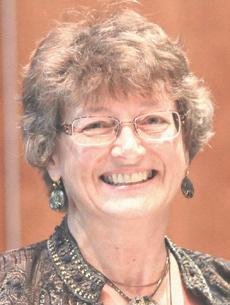 Candace R. Kwiatek
Candace R. Kwiatek
“You, 100 years old, are standing and digging holes in order to plant trees. Do you believe that you will eat of them?”
He replied, “If I merit, I will eat. If not, just as my ancestors toiled on my behalf, so I will toil on behalf of my children.”
Such personal commitment to the greater community is becoming increasingly rare.
First documented in Robert Putnam’s groundbreaking study Bowling Alone, Americans’ community-mindedness — measured through in-person civic involvement, service, social club attendance, religious engagement, and social connectedness — declined from the 1960s to the 1990s.
Yet those original statistics, historian Anton Cebalo warns, “are eclipsed by the accelerated declines” since then.
For example, Americans’ membership in a church, synagogue, or mosque dropped from 70% in 1999 to 47% today.
The birth rate has also declined, plummeting 50% since 1950 to an all-time low today of 12 births per 1,000 people, well below the replacement level.
Meanwhile, singlehood among adults ages 25-54 is up sharply since 1990, from 29% to roughly 40% today. Polling indicates that at least half “are happily single,” “enjoy time to focus on passions, growth, and career,” “don’t long for companionship,” and “like being able to come and go as I please and not have to accommodate somebody else.”
Instead of heeding Putnam’s early warnings, individualism has increased exponentially.
These modern trends are not reflected in the traditional Jew-
ish worldview. Rather, Judaism seeks a fundamental balance between the individual and the community, expressed in a famous aphorism by the rabbinic sage Hillel: “If I am not for me, who will be for me? And when I am only for myself, what am I?”
The Talmud establishes this same notion as a core Jewish value: “All Israel is responsible for one another,” that is, all Jews as a community have an obligation to ensure the wellbeing of individual Jews and vice versa.
The individual and the community also populate key Torah texts. For example, the entire nation of Israel, ha'am, heard the Revelation at Sinai as a communal experience.
for tzadikim (righteous), beinonim (average), and resha’im (wicked), the individuals who choose to form the prayer community.
Countless examples from Jewish text, tradition, and storytelling highlight the importance of both the individual and the community.
Prison ransom. In the mid-13th century, Rabbi Meir ben Baruch was considered Europe’s leading authority on Talmud and Jewish law. Communities in France, Italy, and Germany spoke of him with affection and sought his advice on myriad religious and legal matters.
Judaism seeks a fundamental balance between the individual and the community.
As Jewish persecution increased, however, Rabbi Meir left Germany for Israel, where he hoped to continue his work on their behalf. Along the way, however, he was recognized, repatriated, imprisoned, and held for ransom.
And yet, the Hebrew ha'am also implies individuals. Therefore, the rabbis of the Talmud explain that the Divine Voice was also directly heard by every person — man, woman, and child — each according to their capability.
Similarly, Jewish worship is a communal experience, requiring a minyan (quorum) of 10 and featuring prayers — even personal ones — in plural form.
At the same time, the Hebrew letters for tzibbur, prayer community, are an acronym
The Jewish community quickly raised the exorbitant ransom sum of 20,000 marks, but Rabbi Meir forbade payment. If ransom was paid for him, every notable rabbi would suffer the same fate, and the Jews would be bankrupted or worse. Rabbi Meir remained in prison for seven years, until he died.
Underground railroad. A widow at 26 and heiress to a significant fortune, the converso Beatrice de Luna Mendez fled Portugal for Antwerp to avoid the expanding Inquisition.
There she joined her brotherin-law in the family’s expand-
ing trade and banking business, made extensive business contacts, and created a secret network of escape routes for conversos throughout Europe.
When her brother-in-law died, Beatrice took her increased fortunes to Italy, adopted the Jewish name Gracia Nasi, continued to maintain the “underground railroad,” and helped underwrite the printing of Spanish translations of Hebrew books, including the Bible. She eventually settled in Istanbul, where she could openly support Jewish causes: redeeming Jewish slaves seized by pirates, establishing a soup kitchen, and supporting synagogues and schools. She even secured permission to resettle Jews in Tiberias, turning it into a thriving city that she never had the chance to visit.
Avinu Malkeinu. Prior to the 2020 High Holy Days, Nina Shapiro posted a family video of her 6-year-old son Bibi singing Avinu Malkeinu, the iconic
prayer of repentance. The spirited rendition by the Black South African child (now living in Australia) went viral, eventually making its way to New York City’s Central Synagogue where Bibi was invited to sing via livestream on Yom Kippur.
“Our community just got to hear you sing and I think our hearts are all just opened up,” Senior Rabbi Angela Buchdahl told the Perth boy. "Connecting with…you (and your mother) today — it feels like that’s what reminds us that we are a huge Jewish family.”
In a Torah scroll, each letter is surrounded by space, each an individual Divine image, but without meaning. However, when letters join to make a word, Rabbi Jonathan Sacks explains, and words combine into sentences, and sentences connect into paragraphs, and paragraphs link together, the letters eventually tell a story. How can we live our lives like a letter in the scroll?
Under the Rockets’ Glow: Shira’s Journey to Courage by Roman Sandler. Faced with the challenge of explaining the events of Oct. 7 and beyond to his young daughter, Roman Sandler discovered there were no appropriate resources. This book is his answer. Set in the land of Israel, a father tells stories of bravery and heroism from Jewish history to help his youngster find courage and imagine a peaceful world. Heartfelt and inspiring, the simple story offers a valuable model for dealing with challenging topics.
Morality: Restoring the Common Good in Divided Times by Jonathan Sacks. The writings of Rabbi Jonathan Sacks are universally worthwhile, and this Jewish Book Council 2020 Jewish Book of the Year is no exception. The last book Sacks authored before his untimely death, Morality identifies the source of today’s overarching world crises to be in part “the elevation of self interest over the common good.” In the final chapter, Sacks asks, “Can we restore what has been lost?" He then offers his prescription for the future.
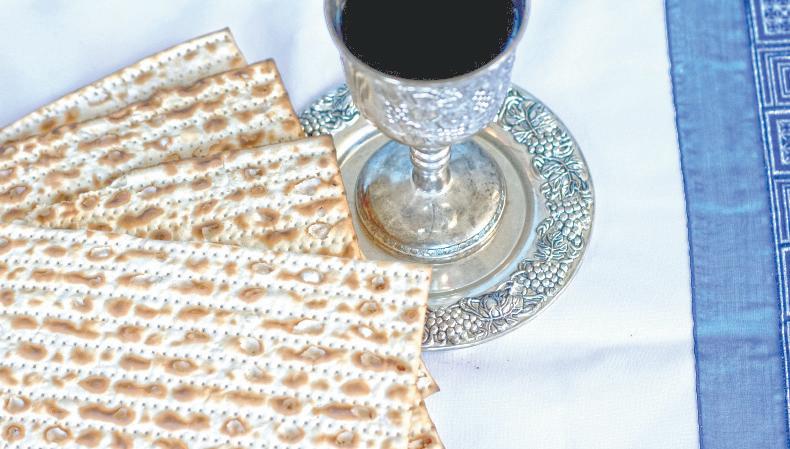
Ohio’s Hospice of Dayton is proud to be accredited by the National Institute for
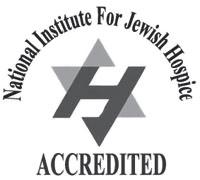

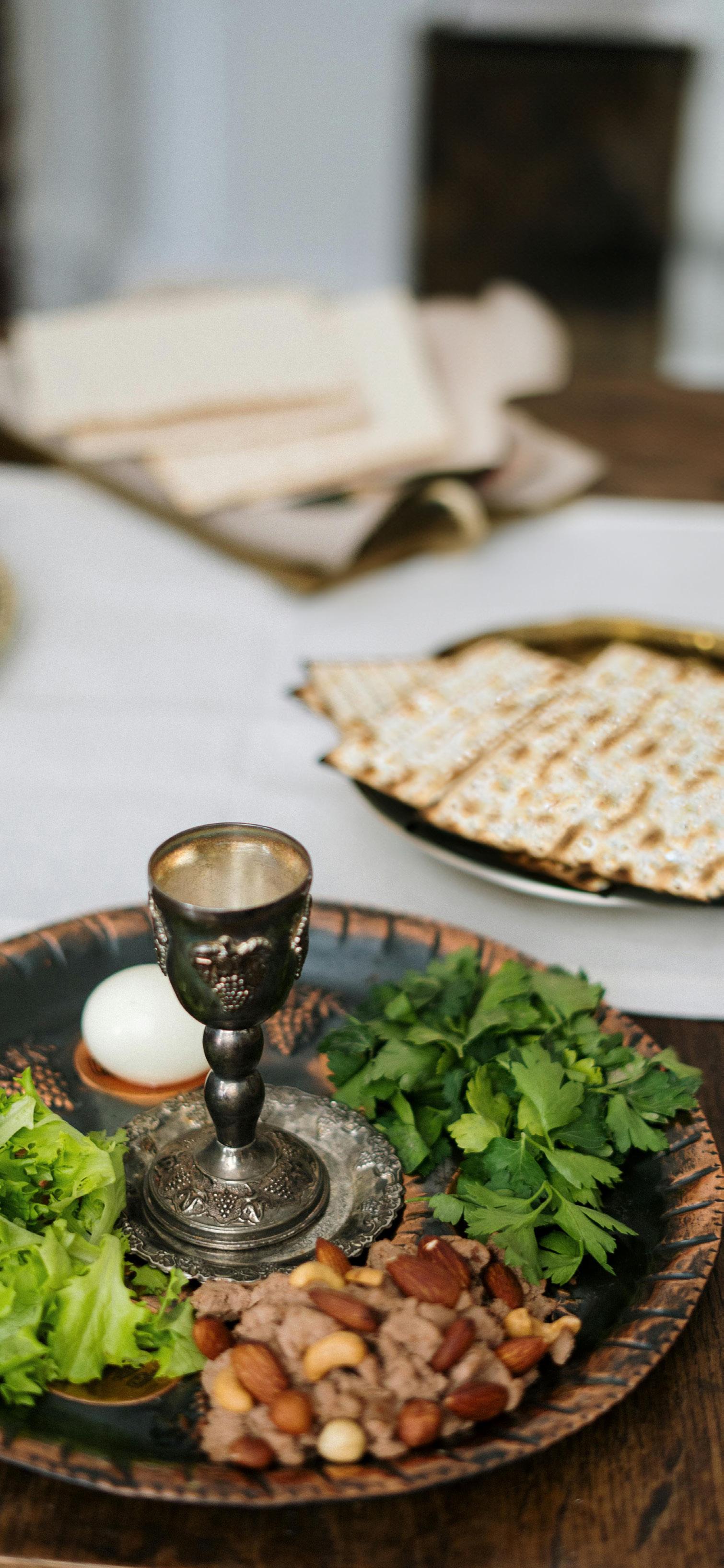
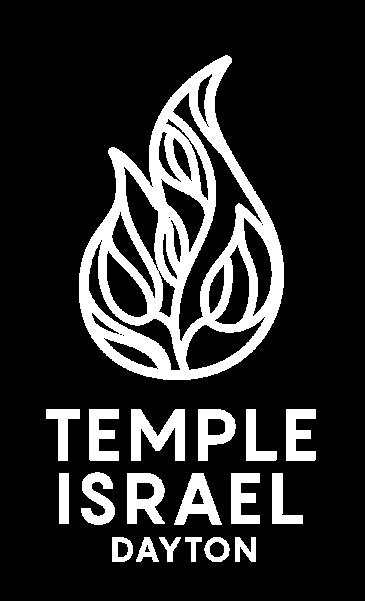
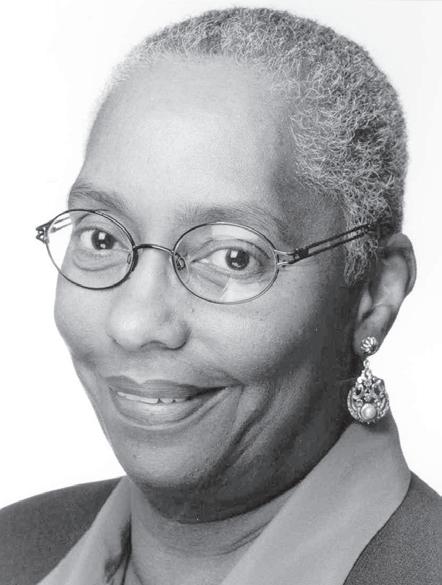
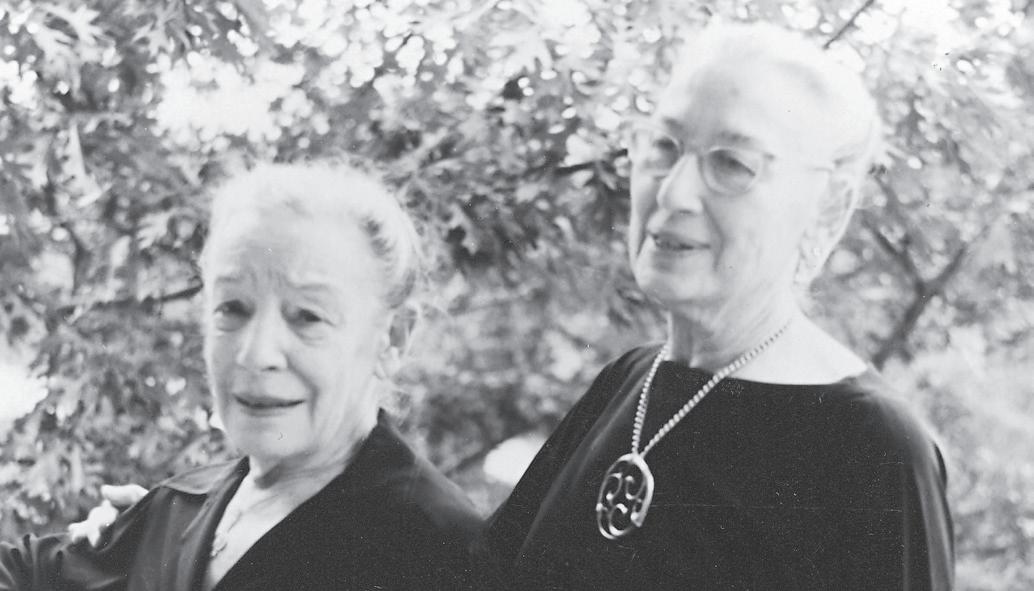
Dayton Contemporary Dance Company's preprofessional ensemble, DCDC2 , will perform When Dance Transcends Barriers: A Story of Jewish & African American Dance in Dayton at 3 p.m., Sunday, April 7 at Beth Jacob Congregation.
The original work celebrates the legacies of DCDC founder Jeraldyne Blunden, and her longtime mentors, Dayton Ballet founders Josephine and Hermene Schwarz.
Blunden established DCDC in 1968 as an ensemble rooted in the African American experience. Two decades before, she was one of the first students at Josephine Schwarz's Linden Center Dance School on Dayton's West Side.
The Schwarz sisters saw to it that Blunden, their star pupil, attended the American Dance Festival, where she learned from Martha Graham, José Limon, George Balanchine, and James Truitte.
When "Miss Jo" asked the 19-year-old Blunden to take over the Linden Center
Dance School, Jeraldyne's School of the Dance was born. And when her dancers began to get hired by Dance Theatre of Harlem and Alvin Ailey American Dance Theatre, Blunden decided it was time to start her own professional African American dance company, DCDC.
The Schwarz sisters continued to mentor Blunden as DCDC rose to national and international acclaim.
Blunden established DCDC2 in 1975 for recent graduates and undergraduates to further their dance training and performance experience.
When Dance Transcends Barriers is co-sponsored by Beth Jacob Congregation and the Dayton Jewish Community Relations Council, with funding from a Jewish Federation Innovation Grant.
Beth Jacob is located at 7020 N. Main St., Harrison Township. Tickets are $18 and may be purchased in advance at jewishdayton.org/events or at the door. Groups of four or more may purchase tickets in advance at $10 each.
The World Zionist Organization's English language U.S. tour of Heschel's Passover Eve will present the oneperson play at 7 p.m., Tuesday, April 9 at Beth Abraham Synagogue in Oakwood.
The play is set in April 1968, a few days before the Rev. Martin Luther King Jr. is to join the rabbi at his Seder.

Eric Berger performs as Rabbi Abraham Joshua Heschel in the 45-minute production.
Heschel's Passover Eve had its premiere in Israel in January 2023. Originally in Hebrew, the WZO had commissioned Eran Shavit to write it in commemoration of the 50th anniversary of Heschel's death. WZO Vice Chairman Yizhar Hess conceived of the idea for the play.
"Heschel was a leader in the world of
Zionism, as an influential rabbi, as a philosopher and a poet, who also touched many Jews in the Diaspora, mainly in North America," Hess told The Jerusalem Post in an interview.
"He himself was a model of commitment to the Zionist idea, the human spirit, and human rights.”
The performance at Beth Abraham is sponsored by Jim Nathanson in memory of his wife, Carol. It's co-sponsored by Pastor Ken Moss and the Potters House.
The pastor and Beth Abraham's Rabbi Aubrey Glazer will lead a discussion following the play.
Beth Abraham is located at 305 Sugar Camp Circle, Oakwood. Admission to Heschel's Passover Eve is free. Reservations are required at bethabrahamdayton.org.
Not only did Aaron Posner co-write the play The Chosen with late literary giant Chaim Potok — author of the iconic 1967 novel — he also directed its premiere production in 1998 and has continued to direct it over the years. Here, Posner talks about his new production, co-produced by Milwaukee Repertory Theatre and Cincinnati Playhouse in the Park. This interview has been edited for length and clarity.
How did you come to write this play with Potok?
I was living in Philadelphia at the time, I was the artistic director of the Arden Theatre Company, and I had met Chaim, who had lived outside of Philadelphia. I’d actually been in a reading of a play that he wrote, as an actor way back when I first moved to Philly, this is back in the late ‘80s.
It was a time in which I was in my 30s and thinking about my Jewish identity and looking for something to adapt for the stage that would allow me to engage with who I was in terms of my Jewish life. That was the kind of question in my mind at the time.
And having met Chaim, I thought I would go ask him for advice on what I might adapt, because I was reading a bunch of Jewish literature and not finding something that I was really excited about. I had read The Chosen in junior high school and didn’t remember it very well.
And so I went back and read it again and as soon as I read it, I thought, this is what I wanted to do. And I just fell in love with the book for many, many reasons. And went and spoke with Chaim, I just asked him if it might be something he’d be willing to let me do, and work on with me.
There had been the movie of it already — and it had been quite successful — that he was very happy with. There had been a musical of it that he was not happy with. But he liked my idea, which was to keep it a very simple story about two boys and their fathers. So it was very much this story of this friendship and these two remarkable young men and their very complicated, very different fathers. So that was the project we embarked on.
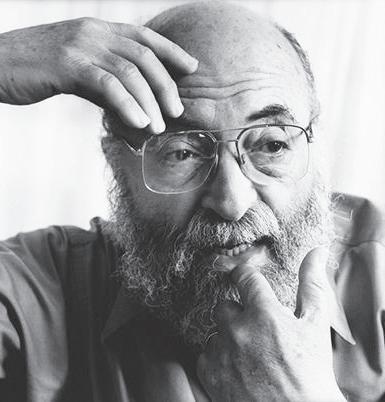
for him. I found him to be just wonderfully supportive and smart.
We had a number of opportunities to speak to audiences together and go out and do talks together. He was just a very inspiring, incredibly intelligent person to be around. And very smart about his own work. He knew what made it work. He knew where his traps were, he knew how not to step in those traps.
I’ve been directing plays and writing plays for a very long time and there is no story I’ve ever put on the stage that I fully believe is more, to use his word, more worthwhile than this story. It’s a word he uses a lot in this book. It tells a very deep and human story about friendship, about coming of age, about choosing who you want to be in the world, about bridges across difference.
This was premiered at the Arden Theatre?
It was. It was a co-production between the Arden Theatre and City Theatre in Pittsburgh.

It wasn't too many years before his passing, toward the end of his life.
Although it didn’t feel that way at the time. He passed in 2002 and this was ‘97 when I first went to speak with him. And ‘98, and I think we premiered in early ‘99, the winter of ‘99, the first production. He certainly seemed absolutely healthy and a strong, a dynamic person. And he was very engaged in the process. The cancer that took him came very quickly.
What was that like, to work with Chaim Potok?
He was a very serious person overall, in my experience with him. We talked about serious literature a lot. His work meant a great deal to him. This was the novel that put him on the map, so it had a very special place
Cincinnati Playhouse in the Park presents The Chosen, April 13-May 12, 962 Mt Adams Cir., Cincinnati. Tickets begin at $35, with discussion programs for adults and teens over the course of the play's run. For details and to purchase tickets, go to cincyplay.com or call the box office at 800-582-3208.
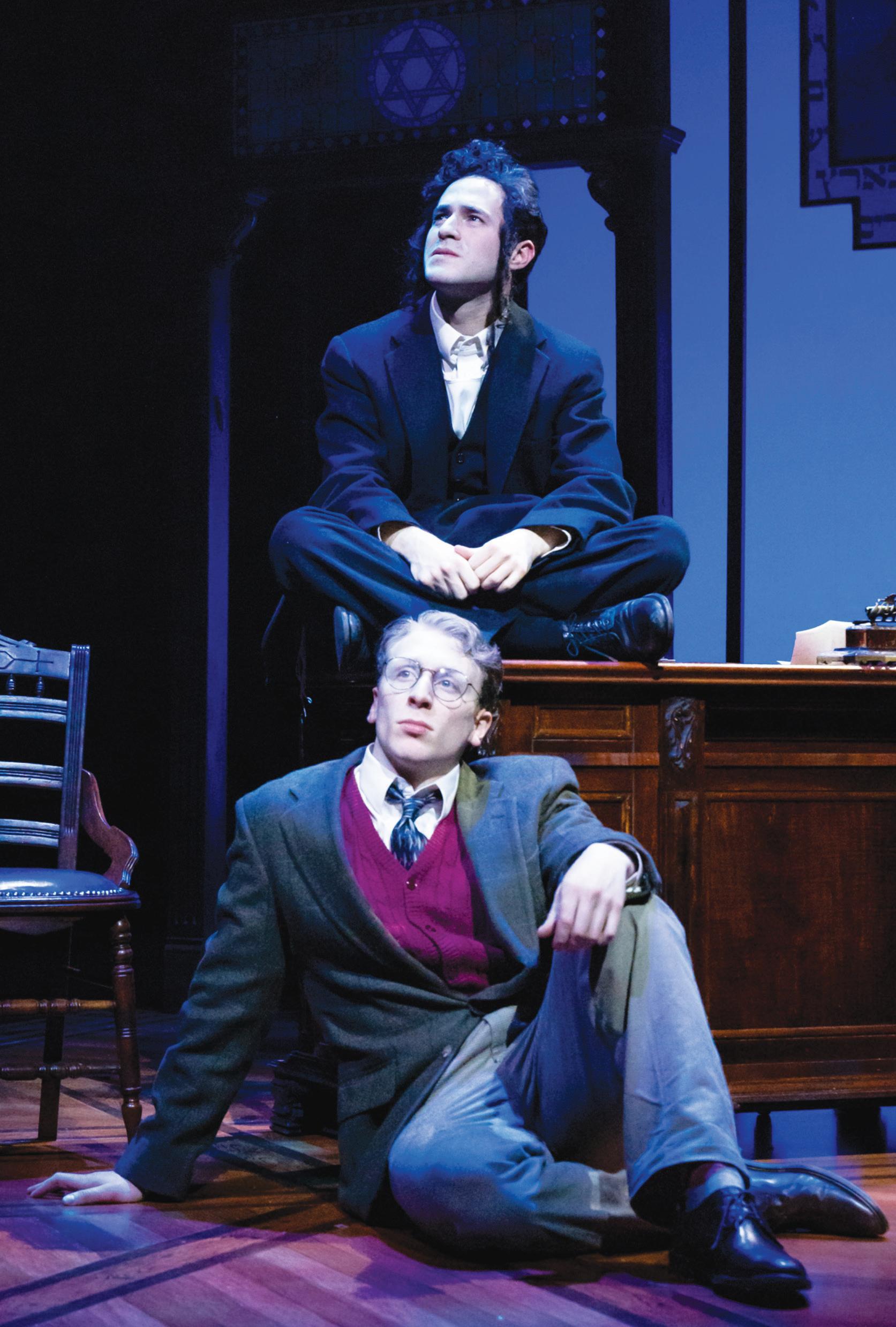
And you directed that first production.
Yes. I’ve directed it several times since. Then I re-adapted it in about 2017-18. I cut it from five actors to four actors. There was a separate narrator originally that doesn’t exist anymore. This is my first time directing this version of it.
How often is it produced?
It comes and goes in waves. It’s gotten a little bit produced since the pandemic. It has had about 75 productions around the country and a little bit abroad as well. I feel it’s a worthwhile time to be telling this story, with all the complexities in the world, stories that are very much looking at the difficulties and Jewish complexity, Jewish humanity, those Jewish struggles that are very human struggles and you certainly don’t need to be Jewish to understand and engage with this story. It is an interesting time to talk about uniquely Jewish struggles.
People sometimes think, oh, it’s about a very religious Jew, a Chasidic Jew and a secular Jew, but it’s not. Both families are deeply religious and observant families.
But from the outside, so many struggles seem intermural. All people in the Middle East seem similar (in the eyes of) people outside the Middle East. The Catholics and Protestants in Ireland seem similar to anybody outside Ireland.
But we know that human beings find all sorts of ways of dividing themselves and of, unfortunately, drawing lines and creating difficulties and conflict. These are passionate, intelligent people who have the capacity to deeply disagree in fundamental ways about things.
The struggles continue in all sorts of complicated ways. Essentially, this is not a story about politics or
religion. Even though you’re dealing with news of the Holocaust and the founding of the State of Israel. It is a story about faith, but mostly it’s a story about humanity. And it’s a story about finding your path in life, about who you want to be in the world.
For all those religious and political differences, those are creating this sort of backdrop or playing field for what are very human, very relatable struggles between well-intentioned people.
You also adapted Potok’s My Name is Asher Lev for the stage after he had passed.
Yes. I worked with Adena Potok, his widow, who is still alive. She worked with me closely on that adaptation, which actually was done at Cincinnati Ensemble Theatre a number of years ago, and I’ve also done it at Milwaukee Rep as well.
Do you approach each production differently?
People’s ears are different now even than they were six months ago. And radically different. You know, Chaim and I spoke a lot about, he wrote this novel in ‘66-’67, and by the time I was adapting it in ‘98, his view about his optimism or pessimism about people coming together across differences, about splits between the Jewish community, he was in a very different place 30 years on.
And now we’re another 30 years. I can’t pretend for a moment that people won’t hear this story very differently because of what’s going on in the world. And they should. And I did make some small changes to the script for this adaptation. I didn’t back off or soften or harden anything. I just tried to be aware of the ears with which people would be listening to this story. And I checked in with Adena and the whole Potok family about that, too. The foundation of the book remains the same.


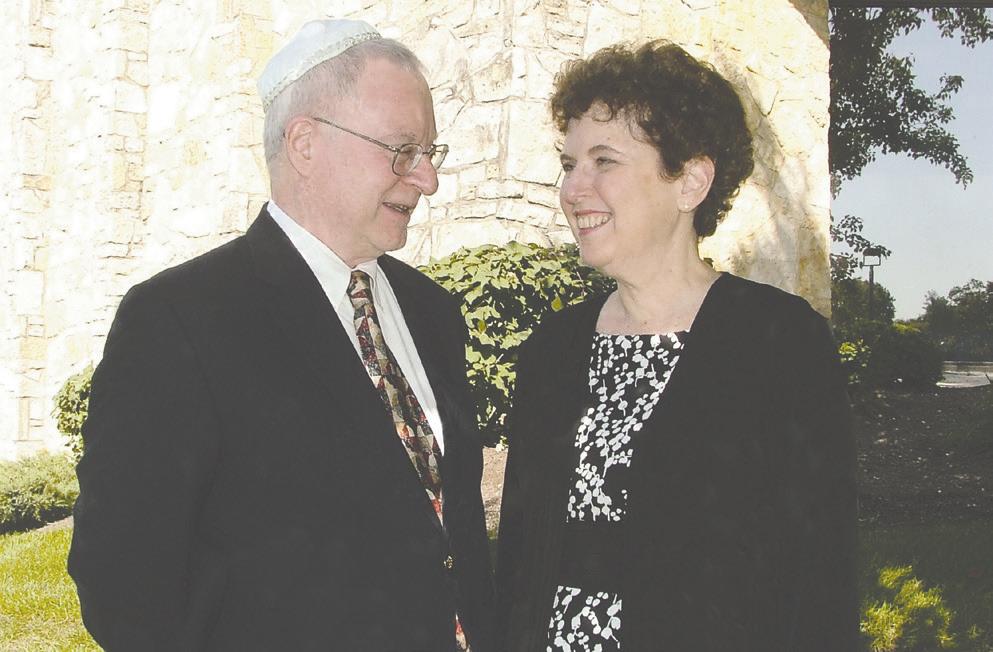
‘Judaism teaches us that the highest obligation of the living is to take care of our deceased.’— Linda & Steve Horenstein
For Linda and Steve Horenstein, their first personal experience with the Beth Abraham Synagogue cemetery was after the devastating loss of their 8-year-old son Joel in 1986. Since then, it has become a place of solace and reflection for them.
Although there was a family plot in the greater Boston area, almost 20 years later, Steve brought both his parents to Dayton to have them buried in the Beth Abraham cemetery, fulfilling their wishes to be buried alongside their beloved grandson.
Both Linda and Steve find comfort in the magnificently maintained cemetery; but understand the financial burden of perpetual care. So, they contributed to the Jewish Cemeteries of Greater Dayton campaign to ensure that all necessary funding and resources will be available to keep the cemetery a serene and tranquil place for all future families seeking the same consolation.
Jewish Cemeteries of Greater Dayton is an endowment organization created to maintain our three Jewish cemeteries in perpetuity. Please join us as we strive to maintain the sanctity, care, and integrity of these sacred burial grounds.
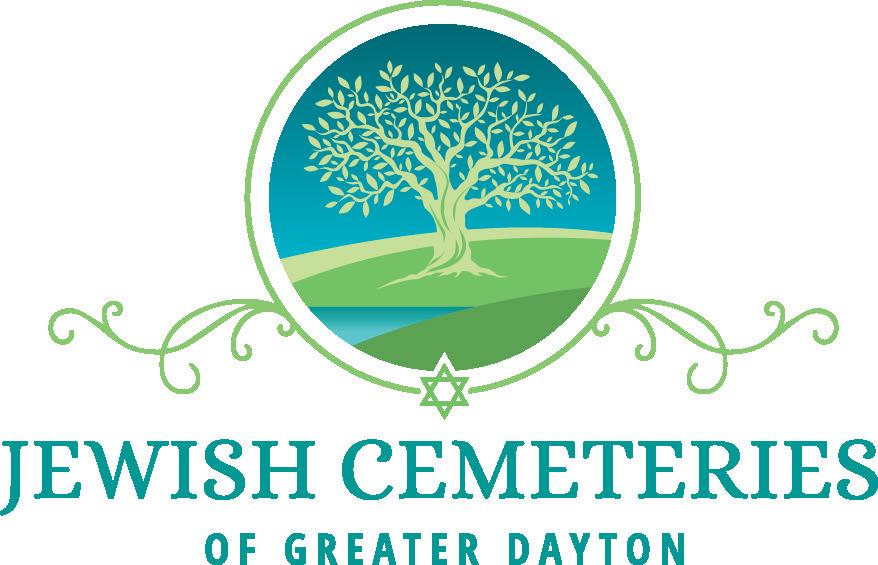
Jean Kolstein Lieberman was born on Dec. 19, 1929 in Cincinnati, daughter of Harry and Reva Kolstein. She died on March 14, surrounded by family in the days prior to her death. She was preceded in death in 2014 by the love of her life, Bert Lieberman, husband of 63 years, founder of Morris Furniture Company. She is survived by her sister, Elaine Schwartz, of Delray Beach, Fla.; and children, Marilyn Klaben (Larry) of Dayton, Michael Lieberman (Randi Abramson) of Washington, D.C., and Diane Slovin of Cincinnati. Loving grandchildren, Max Klaben (Jenny Gerner), Sara Klaben Avrahami (Amit Avrahami), Jeremy Klaben (Miriam Klaben), Eve Lieberman (Ian Rayder) Hannah Lieberman (Molly Bernard), Yonah Lieberman (Maya Matalon), Aaron Slovin (Rachel Myers Slovin) Matt Slovin (Ann Tobias), Joey Slovin (fiancée Paige Gutter). Great-grandchildren, Benny and Zoey Rayder, Mia and Sofia Klaben, Oren, Ari, and Nessa Klaben, Idan and Matan Avrahami, Olivia Slovin, and Hannah and Molly’s daughter. Jean was a wonderful daughter, sister, mother, grandmother, friend, and teacher. She was a lifelong learner and shared wisdom, life lessons, and stories with her family. Jean supported and researched whatever hobbies, sports, and interests her children and grandchildren gravitated to, continuously sending words of encouragement, box scores, letters, voicemails, and texts to let them know she was thinking of them and cheering them on. Jean attended University of Cincinnati and then received her B.S. in education from the University of Dayton in 1952. She then returned to school and received her master’s degree in reading and literacy from Wright State University in 1975. Jean taught second and third graders at Longfellow Elementary in Dayton and then at Ft. McKinley Elementary. Later, she taught reading literacy to students in the Northmont School District. Her volunteer work included Hadassah, Jewish Family Services, Beth Jacob Congregation, B’nai B’rith, and P.T.A. Jean was artistic and enjoyed treating her children and grandchildren to performances and exhibits. Jean and Bert traveled the world together and returned to share wonderful tales of their adventures. She loved playing and watching tennis and enjoyed providing instruction and competition for her children and grandchildren. Contributions in her memory can be made to Osher Lifelong Learning Institute at the University of Cincinnati (foundation.uc.edu/olli), Dayton Literary Peace Prize (daytonliterarypeaceprize.org), and Southern Poverty Law Center (splcenter.org).


$18
One-year
($18 value)
$36
Chai One-year subscription, acknowledgment in The Observer and one free one-column holiday greeting ($30 value)
Ad sales and Jewish Federation support only cover a portion of our expenses to bring you The Observer Printing costs and postage go up. We need your help to ensure the depth of our coverage doesn’t go down.
$100 Angel
One-year subscription, acknowledgment in The Observer and one free three-column holiday greeting ($54 value)
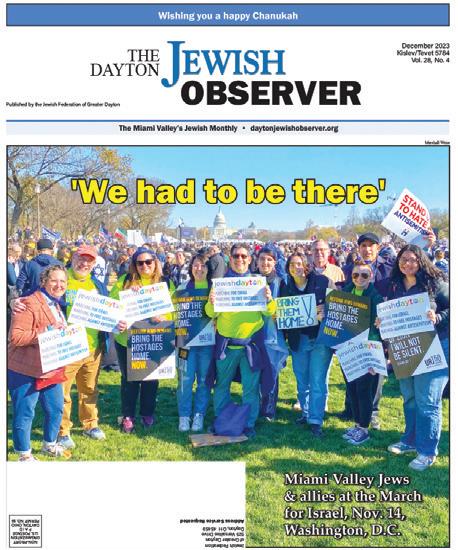
$250 Guardian Angel
One-year subscription, one-year acknowledgment in The Observer and three free three-column holiday greetings ($126 value)
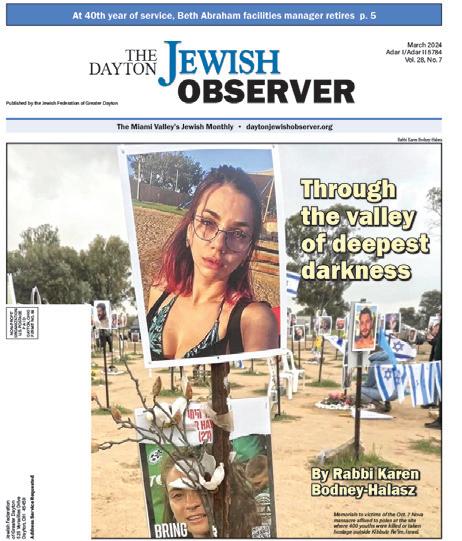
$1,000
All listed in Guardian Angel, plus the gratitude of knowing how much you help support Jewish journalism in the Miami Valley. ($126 value)
Here’s a gift subscription for someone special:
Marni Flagel
Steven & Penney Fraim
Bella Freeman
Elaine & John Gaglione
Carol Graff
Susan & Jonas Gruenberg
Robert & Vicky Heuman
Neil & Gina Kahn
Marilyn & Larry Klaben
Laurence A. Lasky
Drs. Perry & Renata Lubens
Marvin & Susan Mason
Gary Pacernick
Bernard Rabinowitz
Brenda Rinzler
Lee and Patti Schear
Greg Schreck
In memory of Dorothy Cherny Shane by Stanley J. Cherny
Zerla Stayman
Steve & Shara Taylor
Temple Anshe Emeth
Current Angels
Jeffrey Abrahams
Elaine Abramson
Karen & Steve Arkin
Ken Baker, K.W. Baker & Assoc., LLC
The Barrett Family
Skip & Ann Becker
Michael & Amy Bloom
Frieda Blum
Sylvia Blum
James & Margaret Brooks
Judith & Steven Carne
Don Charles
Michael Jaffe
Natalie R. Cohn
Betty Crouse
Scot & Linda Denmark
Susan Dlott
Howard & Sue Ducker
Bruce & Debbie Feldman
Lynn Foster
Stanley Frankowitz
Cindy Pretekin & Jeff Froelich
Felix Garfunkel
Mrs. Jack Goldberg
Stephen Goldberg
Kim & Shelley Goldenberg
Lynn & David Goldenberg
Debby & Bob Goldenberg
Michael Goldstein
Martin Gottlieb
John Gower
Judi & George Grampp
Art & Joan Greenfield
Syd & Lois Gross
Harold & Melissa Guadalupe
Dr. & Mrs. Stephen Harlan
Ralph & Sylvia Heyman
Barbara Hollander
Martin & Joan Holzinger
Linda & Steve Horenstein
Joan Isaacson
Beverly A. Louis Donald & Carole Marger
Scott & Brenda Meadow
Suzi & Jeff Mikutis
Kristen Mitchem
Irvin & Gayle Moscowitz
Eleanor Must
Bobbie & Jack Myers
James Nathanson
Myrna Nelson
In honor of Natalie M. Davis RN NICU
Neonatal, Cedar Sinai Hospital, L.A., grandaughter of Martin Nizny
Phil Office
Ann Paddock
Sharyn Reger
Susan & Nathaniel Ritter
Dr. & Mrs. Gerald Rubin
Alice & Burt Saidel
Barbara Sanderow
Diane Schultz
Linda & Joel Shapiro
Katherine Sher & Jared Serota
Michael Silverman
Diane Lieberman Slovin
Allan Spetter & Claudia Birch
Susan Spiegel & Lisa Hanauer
Jeff & Cathy Startzman
Myron Stayman
Maggie Stein
Marc & Maureen Sternberg
Col. Jeffrey Thau, USAF, (Ret.) & Rina Thau
Bob & Suzanne Thum
Mr. Lawrence Wagenfeld
The Waldman Family
Ms. Judith Weber
Donald & Caryl Weckstein
Michael & Karen Weprin
Ronald Bernard & Judy Woll



SUNDAY, JUNE 2
5PM @ THE BOONSHOFT CENTER FOR JEWISH CULTURE & EDUCATION (525 Versailles Drive, Centerville, 45459)





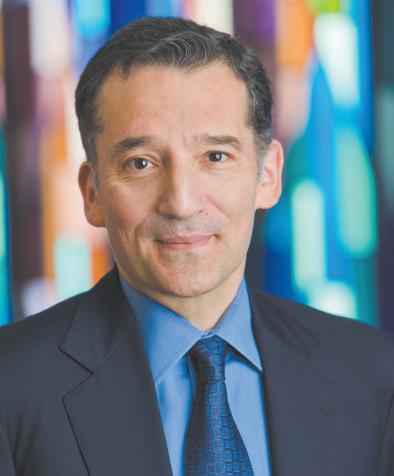
An evening with Keynote Speaker Rabbi David Wolpe, who has been recognized as The Most Influential Rabbi in America by Newsweek and one of the 50 Most Influential Jews in the World by The Jerusalem Post. Rabbi Wolpe serves as the Max Webb Emeritus Rabbi of Sinai Temple in Los Angeles and as a Senior Advisor to the Maimonides Fund. He is the bestselling author of eight books, and numerous articles in leading newspapers and journals.
BRUCE & DEBBIE FELDMAN
Event Chairs
Tickets on sale at jewishdayton.org April 15 for more information contact Melanie Vincent at mgomez@jfgd.net or 937-401-1547.
Rabbi David Wolpe